Pa ssio n purpose wi th a
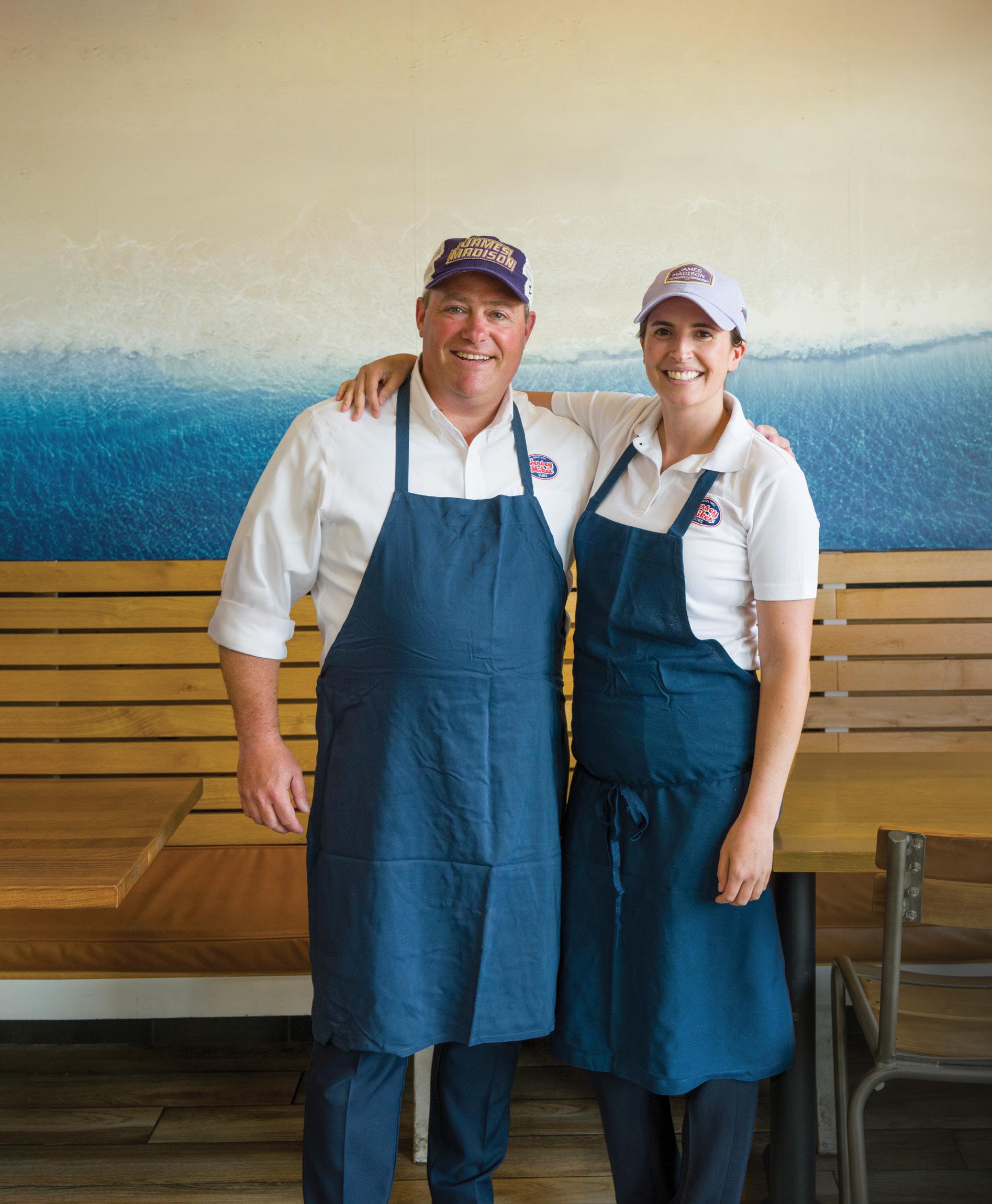
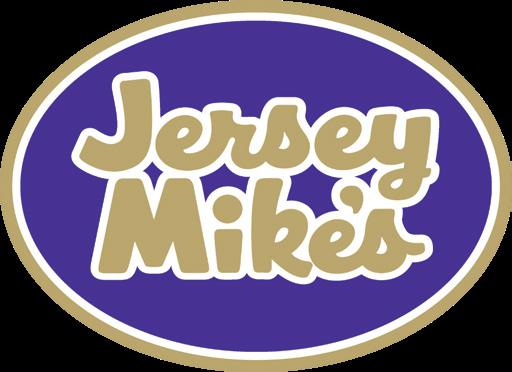




First-year students make their way through a line in Bridgeforth Stadium during Playfair, an annual icebreaker and part of JMU‘s Weeks of Welcome. The high-energy, team-building event is designed to facilitate connections and friendships among new students, and to foster a sense of belonging and campus spirit.
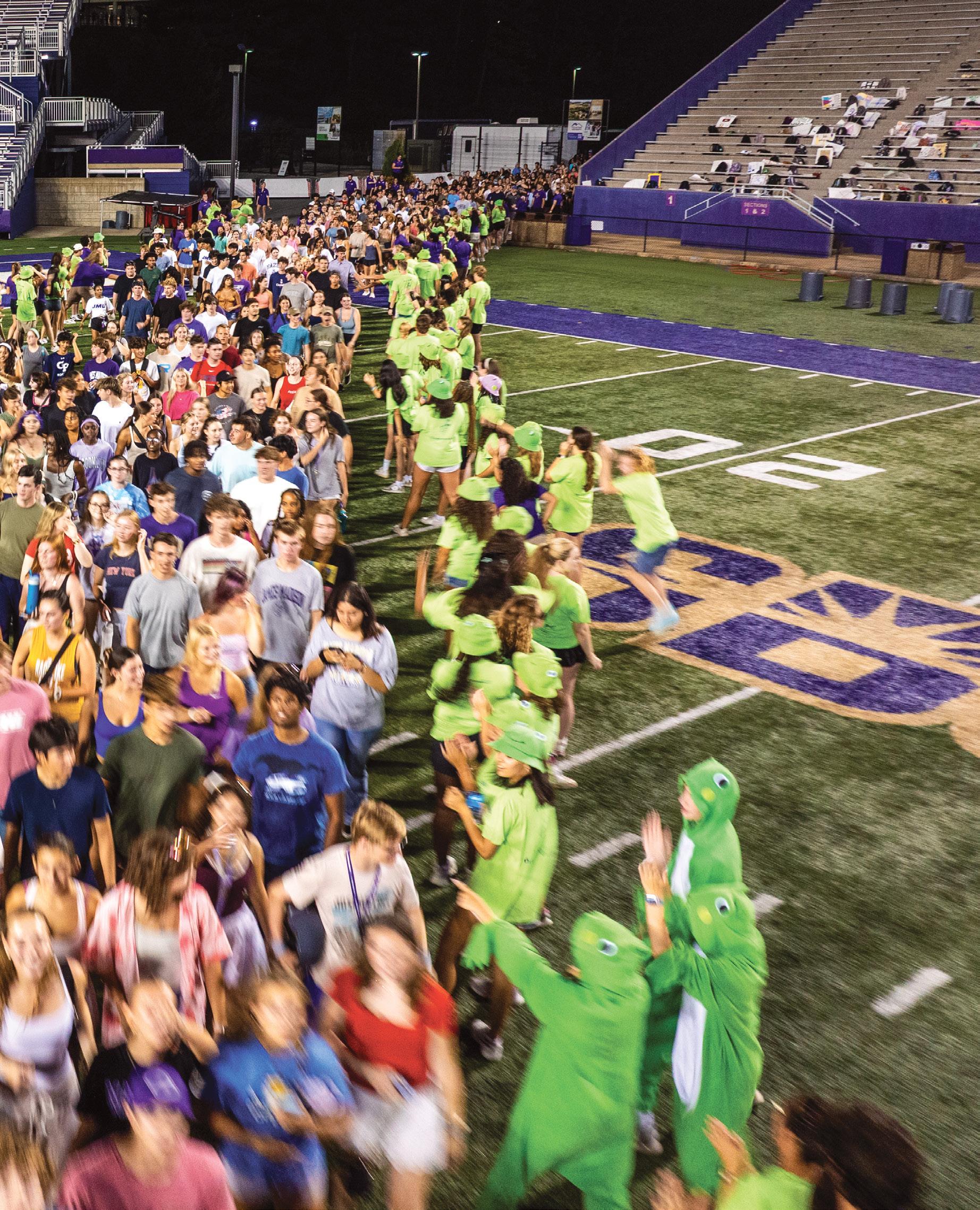


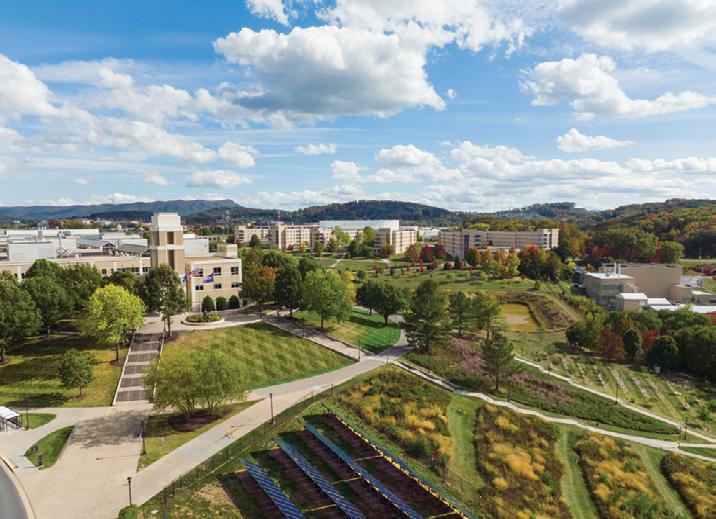
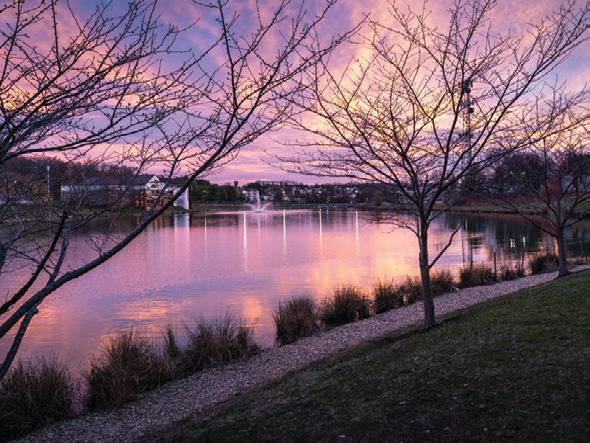
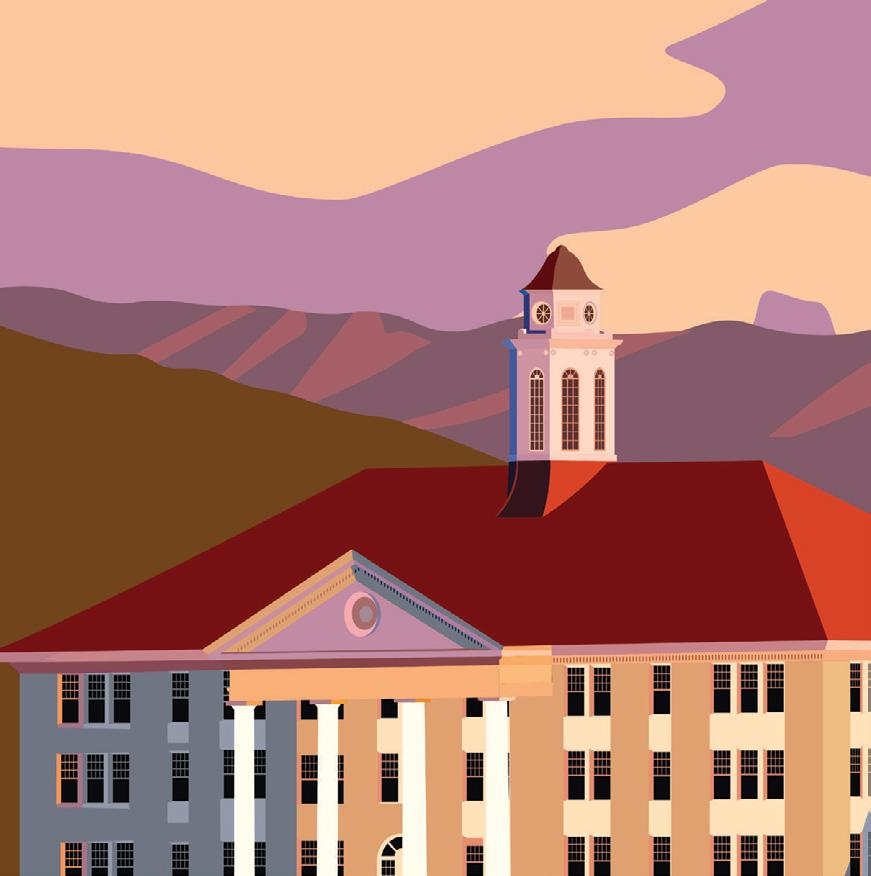
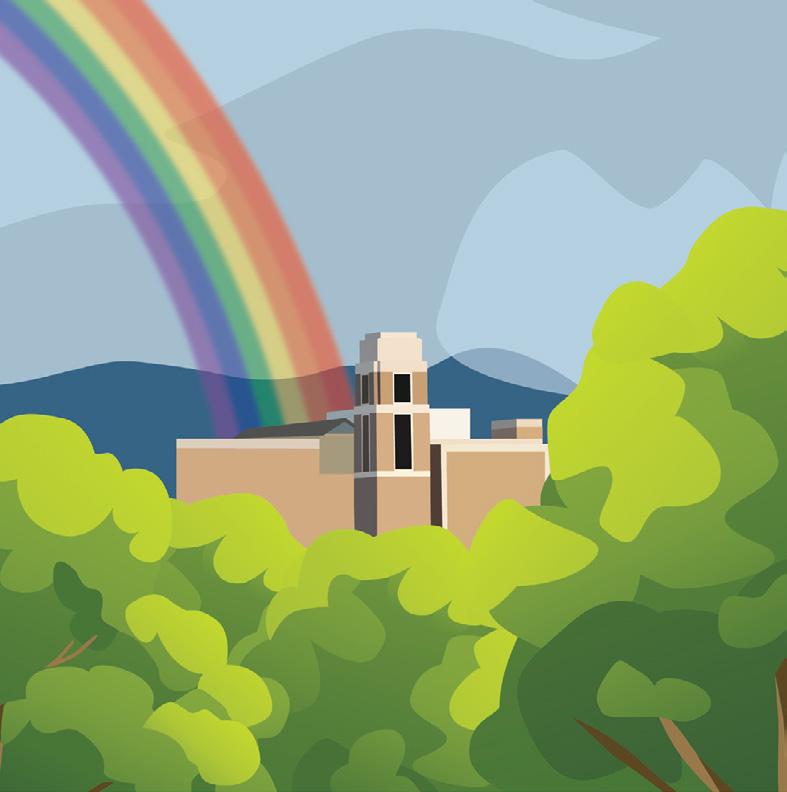
JMU is poised for even greater leadership during a time of remarkable change in higher education
During JMU’s presidential search, I came to campus unannounced as a secret shopper to get an idea of the culture and place. I spent a few days walking the beautiful campus, talking with students and soaking in the atmosphere. I was struck by the earnestness of the student body. Everywhere I went, students were studying and focused. Often, faculty and staff were engaged alongside them. Equally vivid was the humanity JMU students displayed toward one another. Much is made of the lovely JMU tradition of holding doors for the person behind you. But what drives holding doors — even when the person behind you is yards away — is seeing each other as valuable and deserving of respect. That is an authentic rarity in this world today. And to me, that’s what animates JMU’s intangible excellence.
As your president for only a few months now, my perspective blends an outsider’s and an insider’s vantage point. There remains much I still need to learn, and there is much I already know. I can say that James Madison University is an incredibly special place, which is something you would expect me to say. But I state this from a perspective you’ve never had from your president: Although I am JMU’s seventh president since 1908, I am the first who has led another institution before coming to JMU. From this vantage point, I can tell you that this place is absolutely remarkable and that I will pursue our future together with joy, audacity and an eye toward the public good.
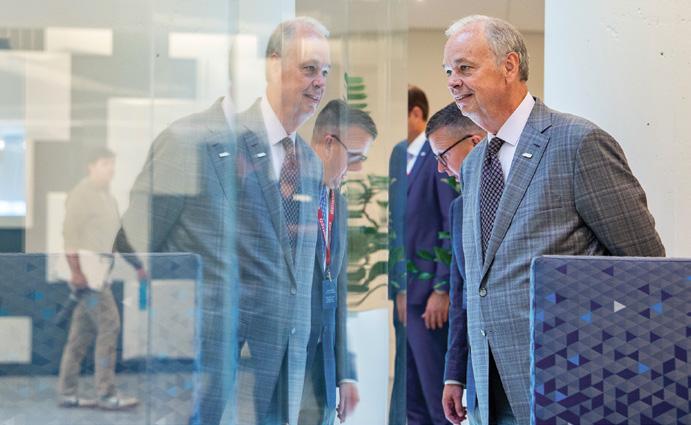
public institution in Virginia. When I was chancellor at University of Wisconsin-Eau Claire, Tommy Thompson, former Wisconsin governor and then-president of the UW System, introduced me at events as the “entrepreneurial president.” I take great pride in such a compliment, and I bring the same zeal for innovation and responsiveness here to JMU. Already, in my first few months, I’ve met with many corporate and nonprofit leaders across the commonwealth — many of them successful alumni — to establish myself and JMU as a willing and engaged partner. It is my aim to sustain this level of connectivity as your president and continue advancing JMU’s excellent progress as a national research institution. In the coming weeks and months, you will hear me talk about our audacious future. While I was drawn to JMU by its extraordinary academic reputation and dramatic rise in recent years, I deeply believe the best is yet to come. To get there, we need all of you. I truly want to get to know you and for you to get to know me. Please stop me on campus to say hello and tell me your dreams for JMU. Please attend events on and off campus to describe your thoughts on what our audacious future might hold. I want to hear from you. After all, any grandiose ideas that a university president might conjure up are just that: ideas. How ideas come to fruition is through the support, willingness and confidence that you have in our shared future. You may have heard the phrase, “Change happens at the speed of trust.” My near-term goal is to gain your trust so we can elevate Madison together. That’s how we will realize JMU’s audacious future.
I want to maintain and enhance the rare JMU culture. It’s a culture of academic excellence, of caring for one another and of making a difference in the world.
While there is more I need to learn, I do know a few of my priorities as your president. First and foremost, I want to maintain and enhance the rare JMU culture. It’s a culture of academic excellence, of caring for one another and of making a difference in the world. Next, I want to enhance existing interdependent partnerships with corporations and nonprofits, and seek new ones to enhance the student experience and more fully fulfill our role as a
All through these exciting times, you can be certain of one thing about me and how I plan to lead this wonderful institution. When met with challenges or uncertainty, sticking to what is right and what is good for our students will be my North Star. I am so happy to be here and can’t wait to meet you.
Go Dukes,
Dr. James C. Schmidt President, James Madison University
Jeff

One

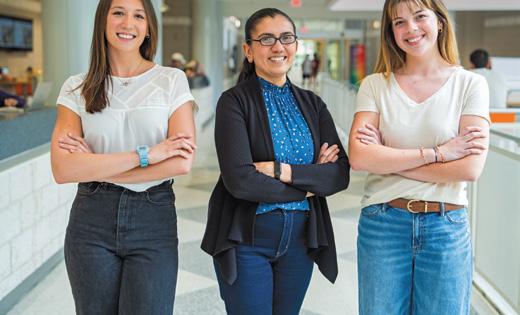
More
President Jim’s corporate tour; students selected for Governor’s Fellows Program; new pathway for prospective Dukes; JMU rocketry team wins NASA Student Launch competition; professor tracks monarch butterflies; Carrier Library’s expanded learning spaces
Ethical Reasoning in Action to launch research study, make 8KQ available to institutions
Spotlighting professors through the lenses of scholarship, awards and service
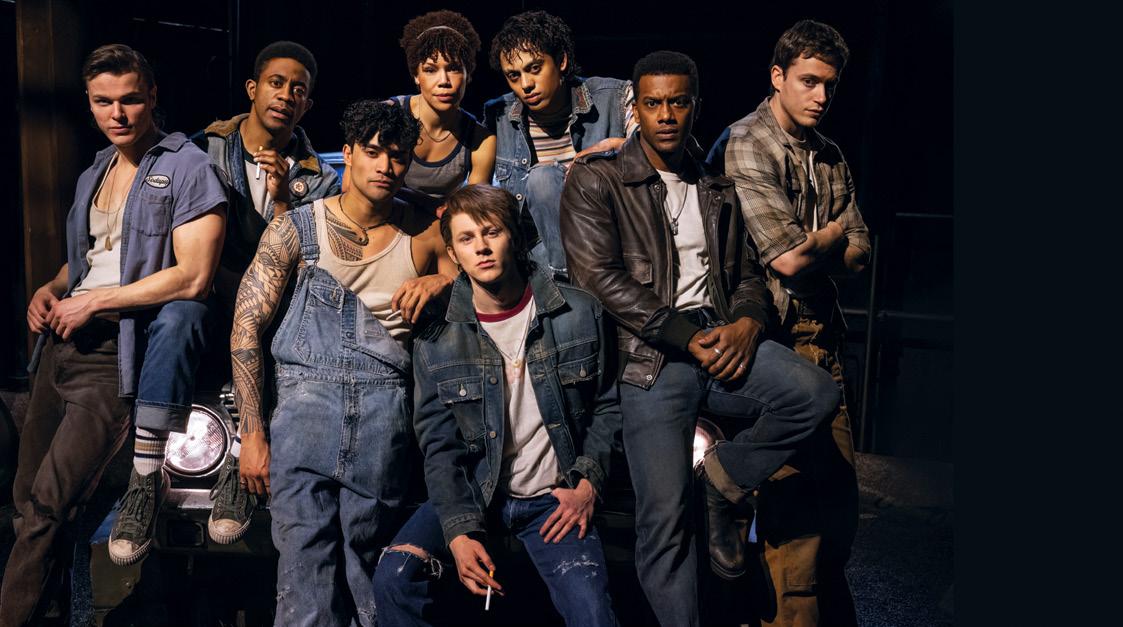
Former Dance for Parkinson‘s participant honored with student scholarship; 2025 Women Who Amaze Summit celebrates women‘s philanthropy and supporting future Dukes; strong annual giving continues, as JMU enters new era
How the House v. NCAA settlement impacts JMU sports; end-of-year Athletics summary
Alumni reunions invite Dukes to rekindle memories; Marcus O’Malley‘s (’04) mission work in South Africa inspires novel; chapter highlights; Madison Alumni Conference; new board members appointed; Mixed Media; spotlight on MetroDukes
Flashback — Country music star Phil Vassar (’85) helped christen the Forbes Center in 2010; Celebrations; Staff Emeriti Association news
After Lt. Col. Constantine passed, his wife established a scholarship for firstgeneration students to continue his legacy of
CIARA BRENNAN
(’17)
DUKES MAKING THEIR MARK ON BROADWAY
Mackenzie Meadows (’20) makes her Broadway debut, joining Austin Colby (’11) and Brent Comer (’19) in a rise of Madison talent BY JOSETTE
KEELOR
Charlotte (Evans) Floyd (’48); Glenn N. Rodgers (’76); Stanley C. Alexander (’78); Marlon Arness Foster (’82, ’95M); Mary Frances “Myrf” Bowry (’84); Rachel Lynn Beerthuis (’91); Thomas Christopher Jones (’93); Jessica Marie Battaglini (’15)
Adult Degree Program celebrates 50 years of flexible, individualized degree completion
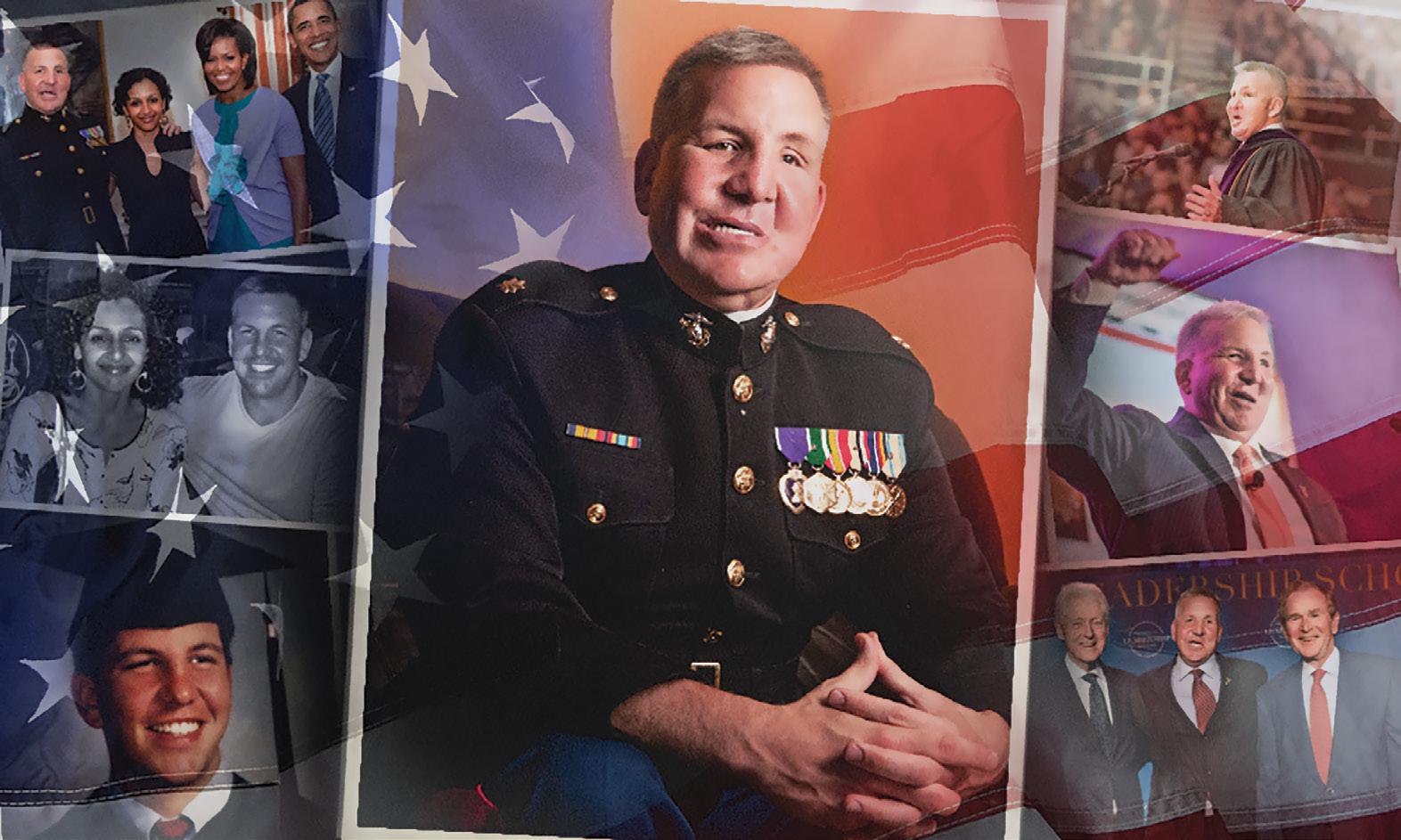
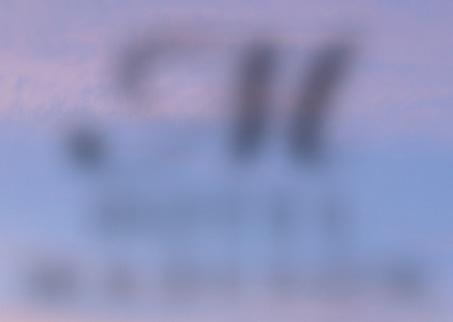




Inspired by the vibrant local scene and cherished guests, award-winning and JMU celebrity Chef Tassie Pippert (pictured) carefully crafted a Monty’s menu showcasing quality ingredients and dishes made from scratch. Each offers a familiar taste, elevated with a unique, modern flair, all served in a warm and inviting atmosphere.
■ Comfort food with a modern twist
■ Extensive wine collection
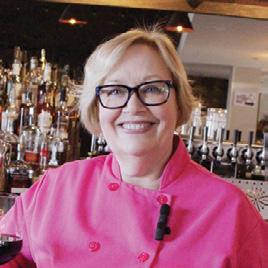
■ Great flavors, drinks & good company
■ Fun community happenings
BONUS: Private Dining Room available to reserve for your special events!
Walk-ins welcome; reservations suggested.
Stay on campus like you used to!
Sign up in the top menu of hotelmadison.com to receive:
■ 10% off our Standard Daily Rate
■ 20% off event space rental
■ Exclusive promotions
■ Priority access to hotelsponsored events
Football weekends
Winter Wine Weekend February 27-28, 2026
Monty’s Restaurant
Menu by the one-and-only Tassie Pippert
Quills Lobby Bar live music
Schedule on our website
grace+main cafe
Specialty drinks, Neapolitan pizza & more!

FALL 2025 Vol. 48, No.3
EXECUTIVE EDITOR
Andy Perrine (’86)
EDITOR
Jim Heffernan (’96, ’17M)
DEPUTY EDITOR
Amy Crockett (’10)
ASSOCIATE EDITOR
Josette Keelor
CREATIVE DIRECTOR
Bill Thompson
ART DIRECTOR
Carolyn Windmiller (’81)
DESIGN ASSISTANTS
Madalyn Cornwell
Kasey Thompson
Nora Vedder
EDITORIAL ASSISTANTS
Lillian Johns
Taylor Moore
PHOTO AND VIDEO TEAM
Steve Aderton (’19)
Rachel Holderman
Olive Santos (’20)
Cody Troyer
ATHLETICS PHOTOGRAPHY
Cathy Kushner (’87)
CAMPUS CONTRIBUTORS
Alumni Relations
Athletics
Donor Relations
Family Engagement University Marketing & Branding
FOR ADDRESS UPDATES:
Email: advancementgr@jmu.edu or call 1-855-568-4483
CONTACT THE MADISON STAFF: Email: madisonmag@jmu.edu or call 540-568-2664
Madison magazine, JMU, 127 W. Bruce St., MSC 3610, Harrisonburg, VA 22807
For Class Notes, go to http://alumni.jmu.edu Madison is an official publication of James Madison University and is produced by the Division of University Advancement for alumni, parents of JMU students, faculty, staff and friends of JMU.
Editorial office: JMU, 127 W. Bruce St., MSC 3610, Harrisonburg, VA 22807
NOTICE OF NONDISCRIMINATION AND EQUAL OPPORTUNITY:
James Madison University does not discriminate on the basis of age, disability, race or color, height or weight, national or ethnic origin, political affiliation or belief, religion, sex, sexual orientation, gender identity or expression, veteran status, parental status (including pregnancy), marital status, family medical or genetic information in its employment, educational programs, activities and admissions. JMU complies with all applicable federal and state laws regarding nondiscrimination, affirmative action and anti-harassment. JMU prohibits sexual and gender-based harassment, including sexual assault, and other forms of interpersonal violence. The responsibility for overall coordination, monitoring and information dissemination about JMU’s program of equal opportunity, nondiscrimination, Title IX and affirmative action is assigned to the Office of Equal Opportunity & Title IX. Inquiries or complaints may be directed to the Office of Equal Opportunity & Title IX: Amy Sirocky-Meck, Title IX Coordinator, 540-568-5219, http://jmu.edu/oeo, oeo@jmu.edu. (REVISED JANUARY 2020)
In high school, when it was time for me to pick a foreign language, I chose Latin. Don’t ask me why. As a B-plus student on the “college-bound” track, my reasoning was probably something along the lines of, “It’s a dead language. How hard could it be?”
But under the direction of a wonderful teacher, I soon came to love and appreciate Latin — so much so that I studied it for four years. I especially enjoyed learning about ancient Roman history and culture and translating the works of Virgil, Cicero and Caesar. In my senior year, I was recognized with a Certificate of Merit on the National Latin Exam and awarded a small scholarship, which I carried with me to JMU.
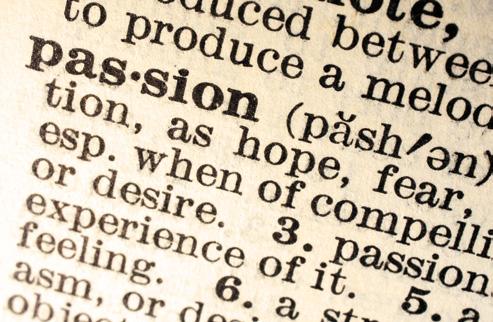

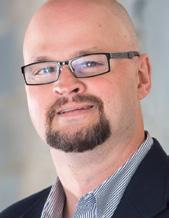
Passion and purpose lie at the heart of JMU’s charge of Being the Change.
Looking back, I think Latin also did a great deal for my vocabulary and fueled an interest in word origins. Many English words, as well as those of the Romance languages — French, Italian, Portuguese, Spanish — have Latin roots. The English word “passion,” for example, originates from the Latin word passio , meaning “suffering.” Originally used in religious contexts (think the Passion of Christ), passion is now more commonly used to describe an intense enthusiasm or love for something. Similarly, the word “purpose” is from the French porpos (aim or intention), which in turn comes from the Latin propositum (something proposed).

Psychology tells us that passion and purpose are related, yet distinct, concepts. Passion is what excites us and brings us joy; purpose is what matters to us and motivates us to act. When aligned, passion and purpose are guiding life forces. When they aren’t, it can result in aimless pursuits. It has been said that “passion without purpose is like a ship without a rudder.” I can relate. As captain of my ship, I’ve chased a few passions, only to lose steam and end up adrift. Likewise, purpose without passion can feel like an uninspired grind. At times, I’ve been there too, wanting to make a difference but lacking the drive to sustain the effort. Passion and purpose lie at the heart of JMU’s charge of Being the Change. We encourage Dukes to combine intellect with action to live lives of purpose and meaning, and many of them do. You’ll meet some of them in this issue of Madison They are executives and franchisees at Jersey Mike’s Subs, one of the fastest-growing restaurant chains in the country (Page 32); lead actors on Broadway (Page 24); rock stars with legions of eco-friendly fans literally driving their performances (Page 36); and fallen heroes who continue to inspire others and impact lives (Page 42).
Here’s to finding your passion and purpose in life. Go Dukes!
Jim Heffernan (’96, ’17M) Editor


As I finished reading the Spring/Summer issue of Madison and its theme of research in public service and community outreach, I was struck by how this theme plays out in two separate JMU entities. The Hart School of Hospitality, Sport and Recreation Management and JMU Dining Services have volunteered for several years now at a local special needs camp where I volunteer. Almost 200 Hart School students, faculty, and administrators and about 20 Dining Services employees have
donated a day each spring sprucing up Camp Still Meadows in Linville, Virginia. The 20-acre campus could not be ready for spring, summer, and fall camps and events without their hard work. Their enthusiasm and dedication makes it a joyful day, and we so appreciate their community service on behalf of our campers. Kudos to the Hart School’s Dr. David Shonk, director, and Dr. Theresa Lind (’13M, ’24Ph.D.), and to Megan Eckhart, director of catering for Dining Services, for making this a reality.
— Jane S. Smith (’73)
When I was in my senior year, I, along with other students, attended a “placement” meeting for students who were graduating that was conducted by the Placement Office. We were told about what services the Placement Office offered. At the time, the majority of the graduates in our class were headed toward careers in some aspect of the education field. The director went into detail about the opportunities and procedures available for
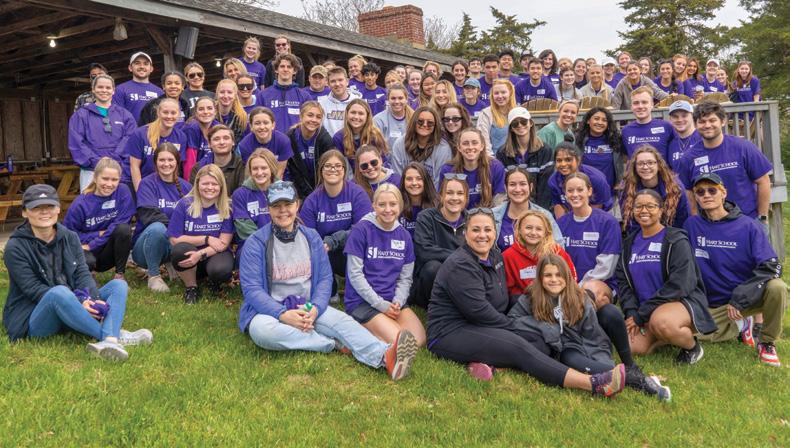
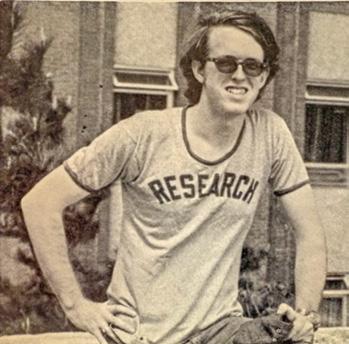
those graduates. Those of us in noneducation fields were “on your own” (his words) as far as a job search was concerned. The Placement Office didn’t have a budget that allowed for recruiting activities for the rest of us and didn’t have the staff. So glad things have changed since the spring of ’74!
— Stanley D. Wyatt (’74), BTC podcast listener
Listen to the episode “Career Outcomes Report” on the Being the Change podcast.
We love your letters
Send your letters and comments to madisonmag@jmu.edu or by mail to: Madison magazine
MSC 3608, 127 W. Bruce St. Harrisonburg, VA 22807


FALL 2025 Vol .48, No.3
BOARD OF VISITORS 2025–26
Suzanne Obenshain, Rector
Teresa “Terrie” Edwards (’80), Vice Rector
Jeff Bolander (’80)
Larry W. Caudle Jr. (’82)
Carly Fiorina
Tom Galati
Heather Hedrick (’00)
Kay Coles James
Joely K. Mauck (’90)
Dave Rexrode (’01)
Steve Smith (’79)
Michael Stoltzfus
Nikki Thacker (’11)
Jack White
Nicole Palya Wood (’96)
Sydney Stafford, Student Representative
Kathy Ott Walter, Faculty Representative
David Kirkpatrick, Secretary
PRESIDENT
Dr. James C. Schmidt
ADMINISTRATORS
Dr. David Kirkpatrick, Vice President, Chief of Staff
Jack Knight, Senior Assistant Attorney General & University Counsel
Dr. Bob Kolvoord, Provost & Senior Vice President, Academic Affairs (interim)
Dr. Nick Langridge (’00, ’07M, ’14Ph.D.), Vice President, University Advancement
Dr. Tim Miller (’96, ’00M), Vice President, Student Affairs
Towana Moore, Vice President, Administration & Finance
Matt Roan, Director of Athletics
Dr. Anthony Tongen, Vice President, Research, Econ. Development & Innovation
Melinda Wood, Vice President, Access & Enrollment
VICE PROVOSTS
Dr. Fletcher Linder (’86), Associate Provost for Online Strategy
Dr. Rudy Molina Jr., Student Academic Success
Dr. Elizabeth Oldmixon, Faculty Affairs & Curriculum
DEANS
Dr. Bethany Blackstone, Honors
Dr. Michael Busing, Business
Rubén Graciani, Visual and Performing Arts
Dr. Jeffrey Tang, Integrated Science & Engineering (interim)
Dr. Mark L’Esperance, Education
Dr. Fletcher Linder (’86), University Studies
Dr. Sharon Lovell (’85), Health & Behavioral Studies
Dr. Bethany Nowviskie, Libraries
Dr. Samantha Prins, Science & Mathematics
Dr. Nick Swartz, Professional & Continuing Education
Dr. Linda Thomas, The Graduate School
Dr. Traci Zimmerman (’92, ’94M), Arts & Letters
ALUMNI ASSOCIATION OFFICER
Ellen Hineman (’89), President
PARENTS COUNCIL CHAIRS
Brad and Tracey Martin (’26P)
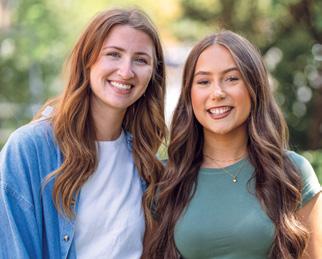
Madalyn Cornwell, a senior Creative Advertising major, and Kasey Thompson, a junior Journalism major with a minor in Civic Leadership, worked as student digital assistants on the Content Marketing team this summer, producing the July and August Madison app issues with individual stories, creative development and final production. Thompson also designed the app promotional ad on Page 8.
Amy Crockett (’10), a Media Arts and Design major and former Breeze copy editor, serves as deputy editor and production manager for University Marketing and Branding, and Madison magazine. She has met a number of music artists, including Jelly Roll, Lainey Wilson, Machine Gun Kelly, Post Malone, Sleeping With Sirens, Teddy Swims and The Used. Her feature on farmers-turned-rockers Jake Cochran (’12) and Jeff Gorman (’12) of Illiterate Light is on Page 36.
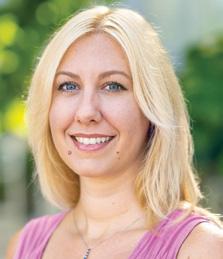
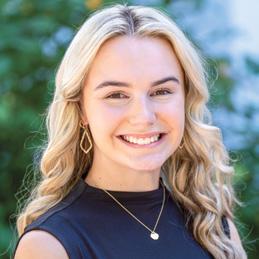
Design assistant Lea Dorcus is a senior Graphic Design major with minors in Honors and Studio Art. In her free time, the Frederick, Maryland, native enjoys tap dancing, painting, and spending time with friends and family. Dorcus serves as the vice president and tap head for Madison Dance Club, and is the Arts and Crafts chairperson for her sorority, Phi Mu. She designed By the Numbers on Page 64.
John Emerson is a portrait photographer with more than 20 years of experience. His strongest attribute is capturing beautiful photos out of situations and locations that often have very little to offer. Lately, his focus has been on nonprofit and advocacy assignments. Since starting his business, he has traveled all over the U.S. for prominent clients for advertising and editorial assignments. Emerson photographed the Jersey Mike’s feature beginning on Page 32.
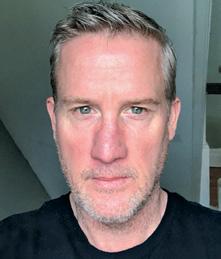
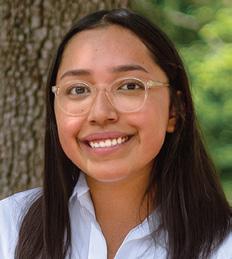
Liz Leal is a creative marketing strategist in Advancement Marketing and a native of Harrisonburg. With a background in design and digital media, she’s collaborated with small businesses, nonprofits and local venues on creative projects, helping them communicate their ideas visually. Her work includes brand strategy, web design and graphic art. Leal designed the calendar ad on Page 2 and Justin Constantine’s (’92) photo collages starting on Page 44.
Kevin Warner (’02), a Sport Management major, joined JMU Athletics in 2006 and in 2023 was named associate athletic director for communications and strategic initiatives. In this role, Warner oversees communications, live productions, and the men’s and women’s golf programs. He also serves as the spokesperson for Athletics. His JMU Nation piece on the impact of the House v. NCAA settlement starts on Page 20.
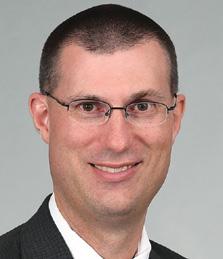
JMU President Dr. James C. Schmidt came to Virginia with a laser focus on connecting with corporate leaders. In July and August, he crisscrossed the commonwealth, strengthening existing ties and making new ones — all aimed at pushing the boundaries on how JMU can deliver the nimblest talent and next-level ideas, as the velocity of change accelerates.
The president’s tour included more than 30 stops, including Capital One, Northrop Grumman, CarMax, and Inova and Sentara Health. His conversations with business leaders were overwhelmingly positive, Schmidt said. In the workplace, JMU graduates are known for exhibiting strong communication skills, critical thinking skills and the ability to work constructively in teams. And Dukes, he said, compare favorably with graduates of “what might be considered more prestigious institutions, both in Virginia and across the country.”
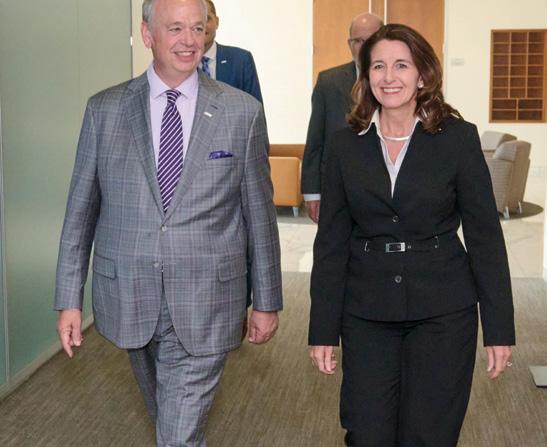
Even those companies that tend to hire graduates from other institutions for their technical skills often bring in JMU alumni to lead those areas because of the wellrounded, broad education they receive at Madison, Schmidt said.
In his previous post as chancellor of the University of WisconsinEau Claire, Schmidt had a reputation as an “entrepreneurial” leader — an approach he wants to continue at JMU.
“I’m looking for areas where the university’s interests and mission intersect with the private sector, the nonprofit sector and the Commonwealth [of Virginia] as a whole,” he said. “One of my goals is to be the preferred university partner for the commonwealth. I want businesses and nonprofits to say, ‘I wonder if there’s an opportunity to work with JMU.’”
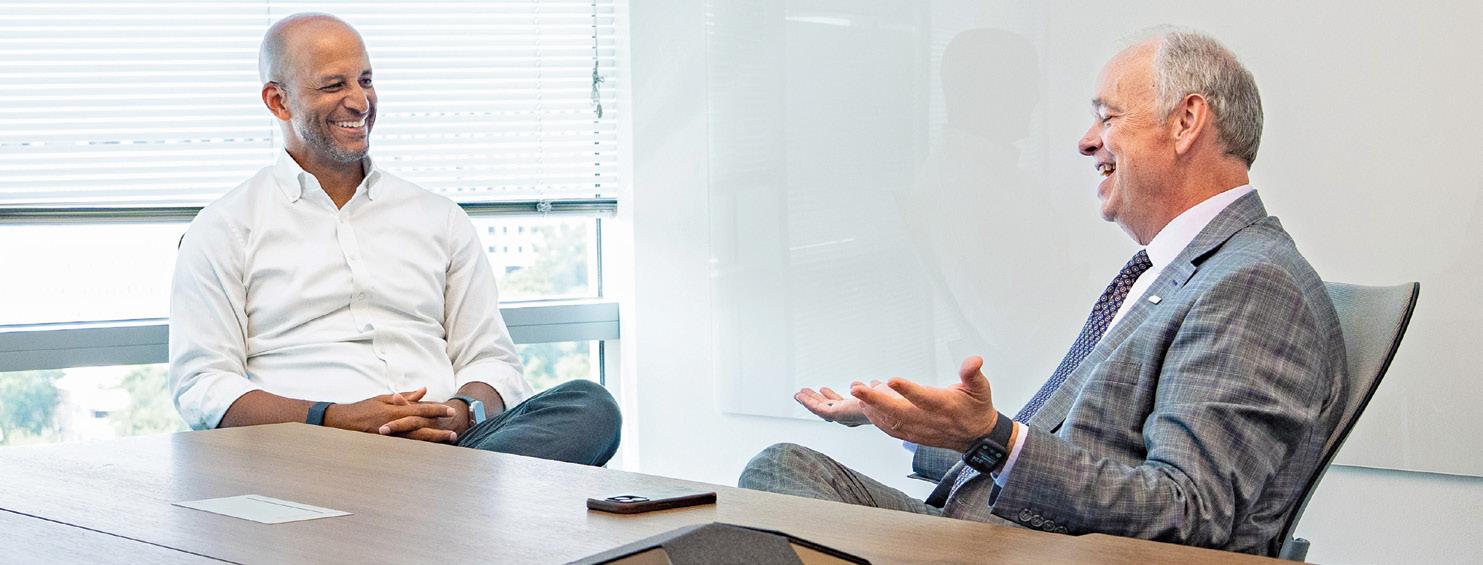
President Jim‘s listening tour continues this fall. Scan the QR code for more information, and sign up for an event near you.
“One of my goals is to be the preferred university partner for the commonwealth. I want businesses and nonprofits to say, ‘I wonder if there’s an opportunity to work with JMU.’”
— Dr. James C. Schmidt
Five JMU students were chosen to participate in the prestigious Governor’s Fellows Program this summer
The Governor’s Fellows Program offers aspiring public servants a unique opportunity to gain hands-on experience in state government. The fellows are placed alongside members of the governor’s cabinet and staff. They engage with guest speakers, visit state agencies and historic sites, and develop a deeper understanding of public service and policymaking in the commonwealth.

it. Through their intellect, passion and unwavering commitment to the common good, they are shaping a better future for all. They are not only representing JMU; they are redefining what it means to lead with purpose.”

“This program is a shining example of civic engagement in action, an ideal that lies at the very core of who we are at JMU,” said JMU President Dr. James C. Schmidt. “Our governor’s fellows don’t just talk about leadership and service; they live
Kara Dillard, executive director of the James Madison Center for Civic Engagement, added, “We are so proud of these outstanding JMU student leaders who have demonstrated a true passion for civic service. This incredibly meaningful, hands-on opportunity undoubtedly provides them with the essential critical thinking skills necessary to lead both our commonwealth and country boldly into the future.”
■ Reagan Polarek, a senior from Richmond, who served in the Office of Strategic Engagement
■ William “Rhody” Brown, a senior from Mechanicsville, who served the Secretary of Veterans and Defense Affairs
■ Helene White, a senior from Prince George, who served in the Office of Regulatory Management
■ Tom Neale (’24), a graduate student from Northumberland, who served the Secretary of Labor
Through JMU and Verto Education, students can begin college careers by studying abroad
Verto Education’s Direct Transfer Pathway offers a first-year college experience that combines travel, cultural immersion and academic excellence. All courses, credits and transcripts at Verto’s abroad locations are delivered by Verto’s accredited academic pro-
vider, the University of New Haven. Upon completing the Verto program, students can transfer to JMU to complete their degree. With the partnership, Verto Education and JMU reaffirm their commit-
■ Sydney Stafford, a senior from Bristow, who served the Secretary of Public Safety and Homeland Security
Scan the code to learn about the fellowship.
ment to providing students with unparalleled educational experiences, fostering global perspectives and ensuring academic success.


“We are excited to partner with Verto to offer Direct Transfer, which aligns with our vision to provide multiple pathways for qualified applicants to become a part of the JMU Family,” said Roger Burke (’91M), deputy director of admissions at JMU.

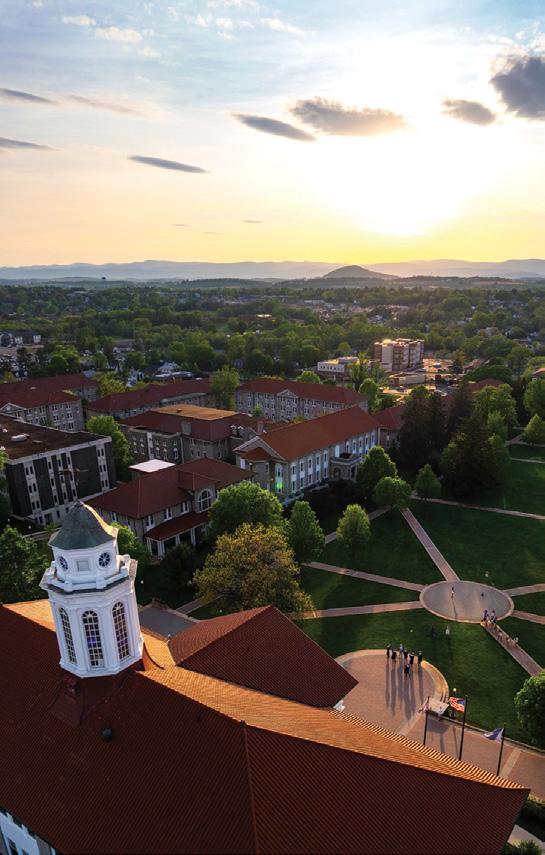



In the 25th anniversary year of NASA’s Student Launch competition, a team of eight JMU Engineering students won first place overall, outperforming more than 50 top-tier university teams.
The proposal from team Project Vulcan I earned rare praise from judges as one of the best in years. “Usually, the only feedback a team receives is whether or not they got accepted into the competition, but we received a comment from a judge within a few days,” said Josiah Walker (’25), a member of the vehicle structure team.
Astronautics Payload Innovation Award, and second place in AIAA’s Reusable Launch Vehicle Award.
“Students discover how to learn quickly, adapt effectively and build upon a strong technical foundation.”
Launch day was May 4 in Huntsville, Alabama, and the Vulcan I lifted off flawlessly. After the parachute deployed, the rocket landed directly in front of the team and the judges, capping a near-perfect mission. On June 13, the NASA announcement came that Vulcan I had won first place overall.
— ETHAN SPECHT (‘25)
The team also earned first place in the American Institute of Aeronautics and
Dukes emerged as first-place winners in NASA’s Student Launch competition against some of the nation’s top aerospace programs.
A major factor in the team’s success was JMU’s approach to engineering education, which urges students to work on complex and broad-scope projects in teams throughout their undergraduate journey. Students discover “how to learn quickly, adapt effectively and build upon a strong technical foundation,” said Ethan Specht (’25), software lead.
Crucial to the team’s success was the support of dedicated faculty, staff and mentors like advisor Dr. Steven Woodruff, professor of engineering, who met with them weekly. Their mentorship with Chuck Neff, president of Valley Aerospace Team, was also integral to their victory, said team lead Grant Whitlow (’25). “His knowledge, expertise, and mentorship went far beyond what was expected, and our achievement would not have been possible without his support.”
— Lynn Radocha (’18)
Biology professor Lee Brown is not surprised by the results of a recent study indicating a big drop in the U.S. butterfly population, and she hopes her tracking technology research will aid conservation efforts. She has been studying the implications of tagging monarch butterflies to track their movements. One tool being used is radio telemetry, which provides important conservation-relevant information about the movements of breeding, migrating and overwintering monarchs. Researchers attach tiny tags to the insects to gather data on continentalscale movements via the Motus network of telemetry towers. These towers pick up signals from the tags and help scientists understand where the animals travel over long distances. Brown’s research addresses previous concerns that the weight of tags could affect butterfly movement. Over the past year, smaller Motus-compatible telemetry tags have been released that weigh just more than 10% of the average monarch’s weight; Brown’s team found the tags have minimal
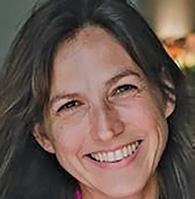
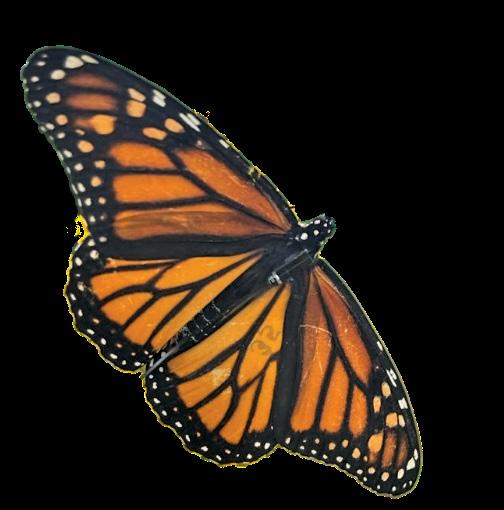
When Carrier Library reopens in Fall 2026, Dukes will discover new, specialized spaces open to all students and designed to enhance learning. Members of the Madison community named many of these innovative spaces through philanthropic gifts that will help bring Carrier to life.
The Anatomy Room will give students from all majors the opportunity to manipulate high-quality anatomical models. “Having an anatomy room available in Carrier Library, right next door to Burruss, will be a great opportunity for all Dukes taking anatomy classes,” said Dr. Mark Gabriele (’95), professor of biology. The refreshed and expanded room in Carrier, complementing the existing Anatomy Room in Rose Library, was made possible through a gift from the Thomas family, who chose to name the space in honor of Madison Thomas (’18), a Biotechnology graduate.
Located on the third floor of the renovated Carrier, the Grand Reading Room will offer sweeping views of the campus and mountains through windows that face east, west and north. The design team emphasized comfort and flexibility, with natural light and power outlets at every study table. “It’s going to be the place to study on campus,” said Kelly Miller-Martin (’06), Libraries’ director of facilities operations.
The Library Futures Classroom will offer students and faculty hands-on access to tools like augmented- and virtual-reality systems, as well as AI-powered design tools. “We envisioned a space where creativity and innovation fuel the learning process, and students and faculty can solve

As the building exterior takes shape, visitors can expect a more modern, spacious and user-friendly Carrier Library in Fall 2026.
problems in new and different ways,” said Jamie Calcagno-Roach (’04, ’06M), director of educational technology services.
The Media Studio will offer a dedicated space for video and audio production. “This studio isn’t just about the physical space or equipment, but also the staff who will bring their expertise to each project,” said Andrew Strack, director of media production and makerspace services.
“It’s going to be the place to study on campus.”
— KELLY MILLER-MARTIN (‘06), Libraries’ director of facilities operations

It will feature a green screen, an overhead equipment grid, and recording gear and software. “[Faculty are] providing experiential learning opportunities, like creating a podcast or video. Students will be able to produce these in our media studio,” said Jenna Polk (’14, ’21M), assistant director of media production and makerspace services.
— Ciara Brennan (’17) and Kristen Shuyler
Scan to see the progress of Carrier Library’s ongoing renovation and expansion.


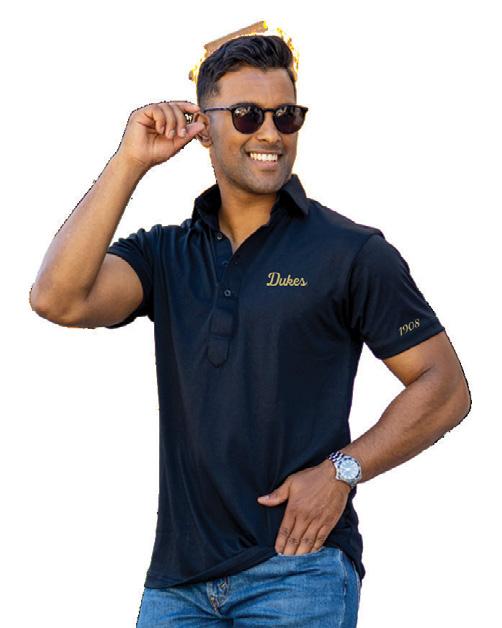
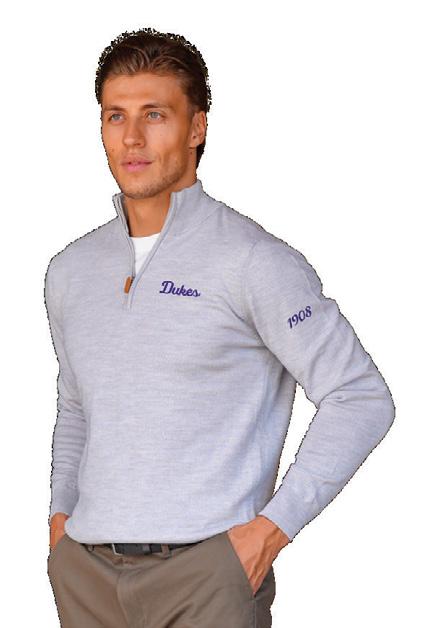
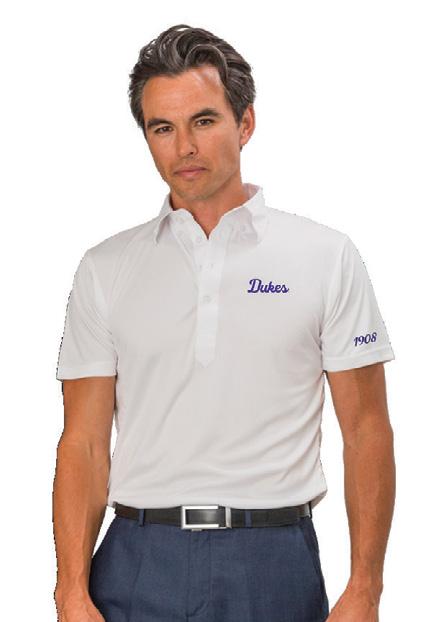
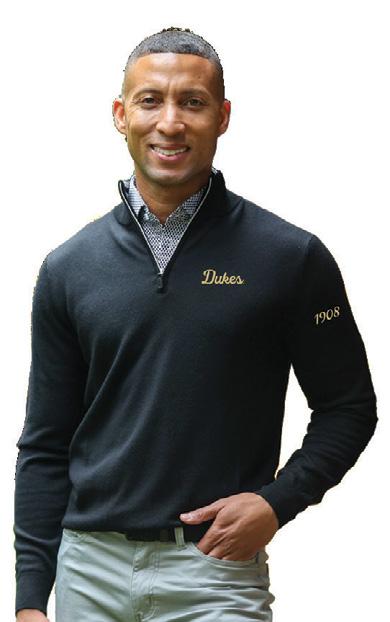

Ethical Reasoning in Action begins research on groundbreaking, campus-based study
For more than a decade, Ethical Reasoning in Action has challenged students and program attendees alike to improve the quality of their decision-making by adopting a powerful ethical reasoning strategy — the Eight Key Questions.
Through attention to fairness, outcomes, responsibilities, character, liberty, empathy, authority and rights, the 8KQ strategy — a uniquely JMU effort — brings awareness to the ethical values at stake in any given situation. Now, ERiA is making the 8KQ available to other institutions while researching how the strategy could benefit Dukes in their everyday lives.
Launched in 2013 by Dr. William “Bill” Hawk, professor emeritus of philosophy and founding director of ERiA, the 8KQ provides a novel, question-raising approach to ethical reasoning.
“To the best of my knowledge, it’s the most sophisticated ethical reasoning strategy that is out there,” said Dr. Christian Early, professor of philosophy and director of ERiA. “It’s certainly the most assessed.”
What’s more is the 8KQ is something participants will only find at JMU. “It is truly unique and singles JMU out in a very distinct way,” Early said. “It is our stamp, our own contribution. You can’t get this ethical reasoning strategy anywhere else, but you can get it here.”

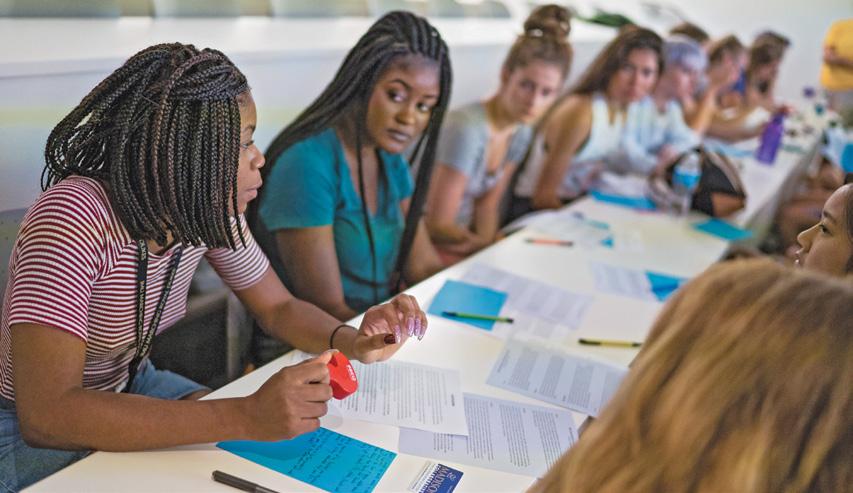
The Eight Key Questions cards, handed out in classes and workshops, help students consider the benefits of the strategy in their everyday lives.
Scan the QR code to learn more about ERiA and its Eight Key Questions strategy.
To kick off its campus-based research, ERiA has enlisted its first research fellow, Dr. Daniel Holt, professor of psychology, to conduct research on factors related to decision-making with a focus on ethical reasoning.
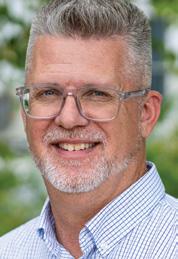
Holt’s goal is two-pronged: First, study skill development around the ethical reasoning strategy (the “what” to do), and second, help people know when to use it effectively (the “when” to do it).
Through the research process, volunteers will push a button to mark what they deem as important moments for observing a social encounter. From there, JMU researchers can identify how people are making sense of their world.
Describing JMU’s approach to research as groundbreaking, Early said it’s focused on getting to the core of moral perception and whether people recognize a moral situation as it’s happening. “We’re really in a unique position to develop these lines of research,” he said.
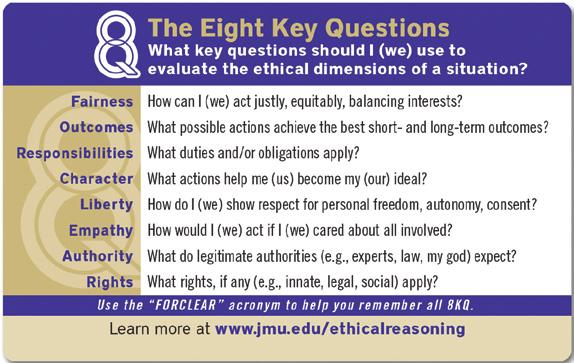
ERiA Assistant Director Kacey Damaty (’10, ’11M) said. “There are other institutions that are teaching ethics and ethical reasoning differently, but no one is doing it the way we do it at JMU, so they can’t really assess it the same way that we do.”
ERiA also leads It’s Complicated, the annual online orientation designed for all new students; Initi8: Improving Ethical Reasoning at Scale, an intensive, five-day, in-person institute that ERiA cohosts with the Center for Assessment and Research Studies; and the Elev8 Ethics speaker series.
“We’re really in a unique position to develop these lines of research.”
It has coordinated through James Madison Innovations Inc. to copyright and trademark the 8KQ strategy. In licensing its work to an outside company, Ethical Decision Making, ERiA is broadening the impact of 8KQ. EDM implements the use of the strategy in a professional development setting within the corporate world. The revenue generated by EDM comes back to support JMU in the form of licensing fees and the innovators in the form of royalties.
— DR. CHRISTIAN EARLY
Part of the 8KQ’s success is how the yearslong assessment process has strengthened the outcome for future participants. “Assessment was built into the process from the very beginning,”
Going forward, the ERiA team will promote the 8KQ more widely at national and regional conferences, and by publishing their findings in professional journals.
— Josette Keelor
Spotlighting JMU professors through the lenses of scholarship, awards and service
“Dr. Zaman’s research has garnered significant recognition within the academic and medical communities, reflecting profound impact on both JMU and the broader health care fields.”
— DR.
KIRK ARMSTRONG,
academic unit head for health professions

Dennis Blanton ANTHROPOLOGY
Dr. Blanton, associate professor of anthropology, has been conducting archeological research with his students in Staunton, Virginia. Recently studying the impact of the first colonizing Europeans on indigenous societies, they were attempting to fill in an incomplete piece of Spanish colonial history about conquistador Hernando De Soto. Most of Blanton’s field work takes place at the Deer Run Plantation in southwestern Georgia, where he hosts a field school for JMU students. Dukes spend five to six weeks camping in tents and working long days as archaeologists, gaining the practical experience of searching, excavating and cataloguing.
Devoting 10 years of work to the Georgia property, he found evidence that the conquistadors had been there — a glass bead made in Italy about 500 years ago and used by the Spanish to trade with the Native Americans.
“There’s much about the human story that only archaeology can reveal,” Blanton said.
Geary Albright ASTRONOMY

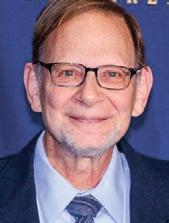
Albright, professor emeritus of physics and astronomy and director of the John C. Wells Planetarium, was awarded the 2024 Sun Belt Conference Faculty of the Year Award. The annual award recognizes a professor who has a passion for teaching, engaging, and inspiring students while supporting and displaying enthusiasm for student-athletes and the athletics department.
Albright employs a studentcentered approach in his classes, according to the award citation, which stressed the hands-on activities and inquiry-based learning he uses to make complex scientific concepts accessible and engaging for all students.
Sara (Krivacek) Bianco BUSINESS MANAGEMENT
Dr. Bianco, assistant professor of business management, recently co-authored articles in two peer-reviewed journals that appear on the Financial Times

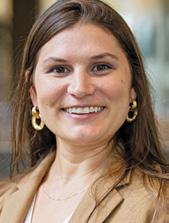
50 List: “When There’s No One Else to Blame: The Impact of Coworkers’ Perceived Competence and Warmth on the Relations Between Ostracism, Shame, and Ingratiation” in the Journal of Business Ethics; and “Making the Grade? A Meta-Analysis of Academic Performance as a Predictor of Work Performance and Turnover” in the Journal of Applied Psychology
Dr. García, assistant professor of ethnogeology and karst science, received a funding award from the Virginia Museum of Natural History to support Karst Chronicles: The Quest to Understand Cave Shields Formations, an undergraduate research opportunity designed to answer key questions about cave shields. According to Dr. Joe Keiper, executive director of VMNH, “the Pete Henika Memorial Fund was designed specifically to help facilitate the type of impactful research that García and his students are conducting.”


Dr. Wei, professor of geography, is poised to advance the field of artificial intelligence with a new textbook. He and Dr. Xinyue Ye of Texas A&M University coauthored Social Data Analytics in the Cloud With AI published by Routledge. It is the first to integrate cloud computing and generative AI into social data analytics education, offering students and professionals a comprehensive guide to leveraging these technologies.

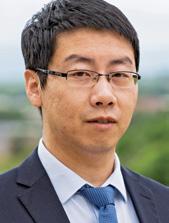
Sojib Zaman HEALTH SCIENCES


Dr. Zaman, professor of health sciences, has been listed for a third consecutive year in Stanford/Elsevier’s Top 2% Scientist rankings.
“This is a significant achievement for me,” he said, “and I would like to extend my sincere thanks to JMU for providing the resources and support that have allowed me to continue my research.” Zaman has worked at JMU since 2023.
His research focuses on infectious and chronic diseases, maternal and child health, sexual and reproductive health, and mental health and well-being. He has authored, co-authored or edited more than 100 peerreviewed papers, with more than 65,000 career citations, an important factor in the consideration for the Top 2% list. In 2024 alone, his contributions were cited 12,900 times, according to the Top 2% Scientists rankings.

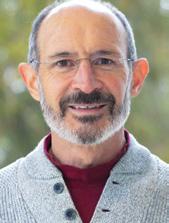
Dr. Beck, professor of theatre, has creative research slated for a 2026 publication. The CVPA is proud to highlight his work as a co-editor on Precarious Identities: Theatre and Performance of Refuge and Risk in East Central Europe, showcasing the profound intersections of performance, identity and cultural precarity across this vast and complex region. This is the first collection on performance in this large region (Central Europe through Estonia, Latvia and Lithuania and east to Belarus, Poland and Russia) that forgoes the framework of the post-communist or communist era, and is structured into five thematic sections.
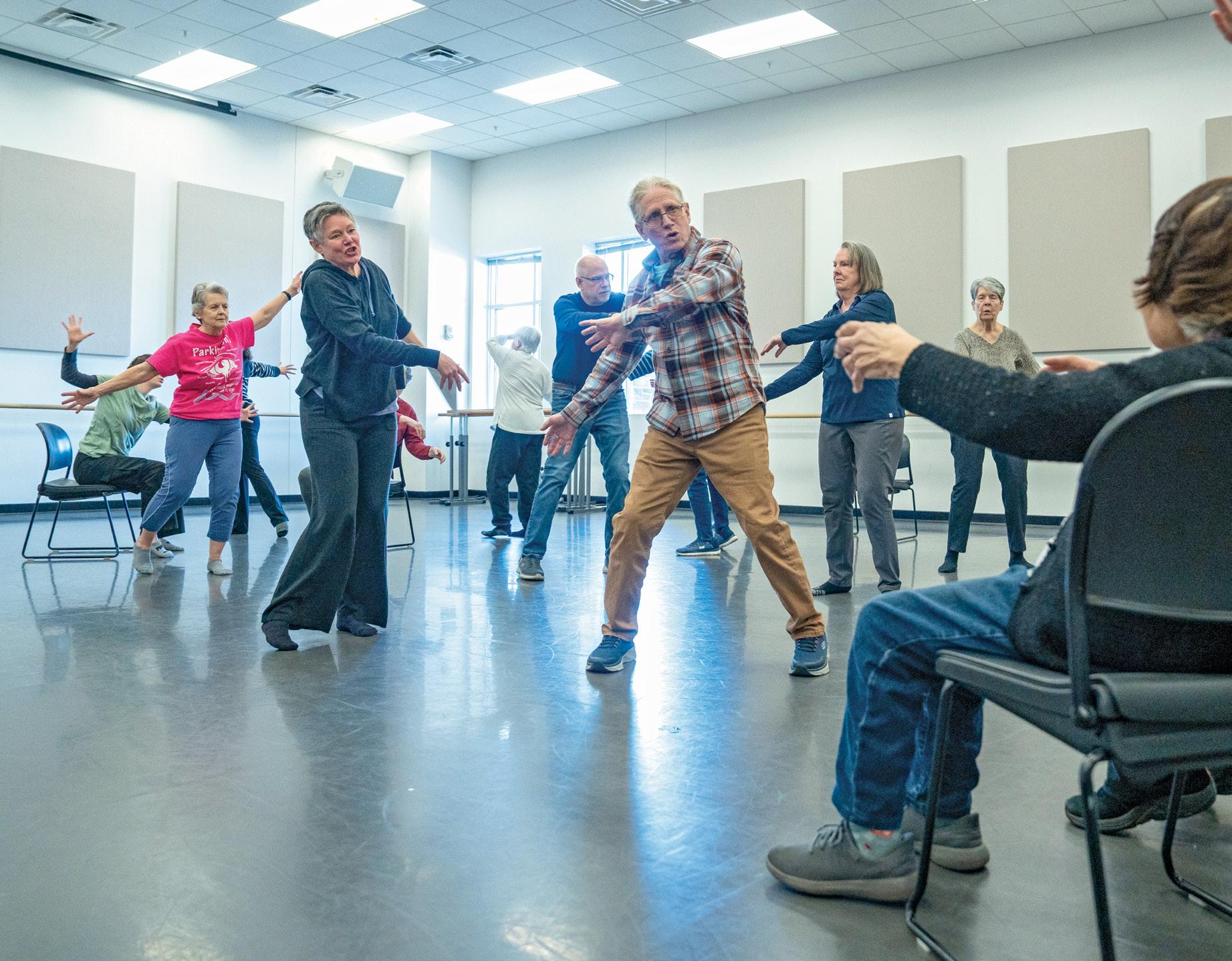

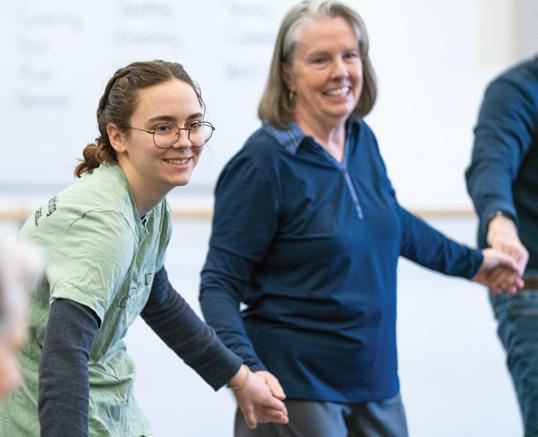
Community member who battled Parkinson‘s honored with JMU scholarship
Parkinson’s disease, a degenerative disorder of the central nervous system, can make even the simplest movements — lifting a hand, tapping a foot — feel like an uphill battle. But dance changes that.
“Parkinson’s can make it feel like the body is working against you. But here, we try to turn that around,” said Kate Trammell, professor emerita of dance and a Dance for PD®-certified Teaching Artist. “Movement is not about limitations but about possibility and freedom.”
Classes are based on the Dance for PD approach developed by the Mark Morris Dance Group, which has programs in 250 communities in 30 countries. JMU’s program is offered through the Office of Creative Propulsion in the College of Visual and Performing Arts.
The approach is research-backed: Studies show that dance helps Parkinson’s patients improve motor skills, flexibility and coordination — all while boosting confidence and social connection.
Harrisonburg community member Lloyd Mast, who died in 2024, knew this firsthand. His wife, Donna, explained: “Parkinson’s is sort of death by a thousand paper cuts. Every day, every week, every month, every year, you’re facing loss of something — the loss of mobility, loss of balance, loss of taste, loss of energy. This class was always one activity we could do together — just go and enjoy.”
Lloyd designed and printed T-shirts for the class, using his favorite quote: “Life isn’t about waiting for the storm to pass … It’s about learning to dance in the rain.”
Lloyd wasn’t just a participant; he was a cornerstone of the community, according to Caraline Christie (’23), a former student volunteer who is now a Dance for PD teacher. Through Lloyd, Christie discovered a passion
Scholarship recipient Haley Tabor, a fourth-year Dance major, engages with a community dancer.
“Movement is not about limitations but about possibility and freedom.”
— KATE TRAMMELL, professor emerita of dance
for teaching dance as a form of therapy. “I remember thinking what a privilege I had to be able to dance alongside such a beautiful soul,” she said, “and I knew I wanted to further my training from student assistant to teacher so that I could continue learning from amazing people like him.”
Lloyd’s connection was so profound that Donna created The Lloyd Mast Endowment to fund scholarships for JMU Dance students. “The endowment directly funds students’ training, helping to cover any in-person or online workshops or anything that is required. It’s a way to keep Lloyd’s legacy alive — not
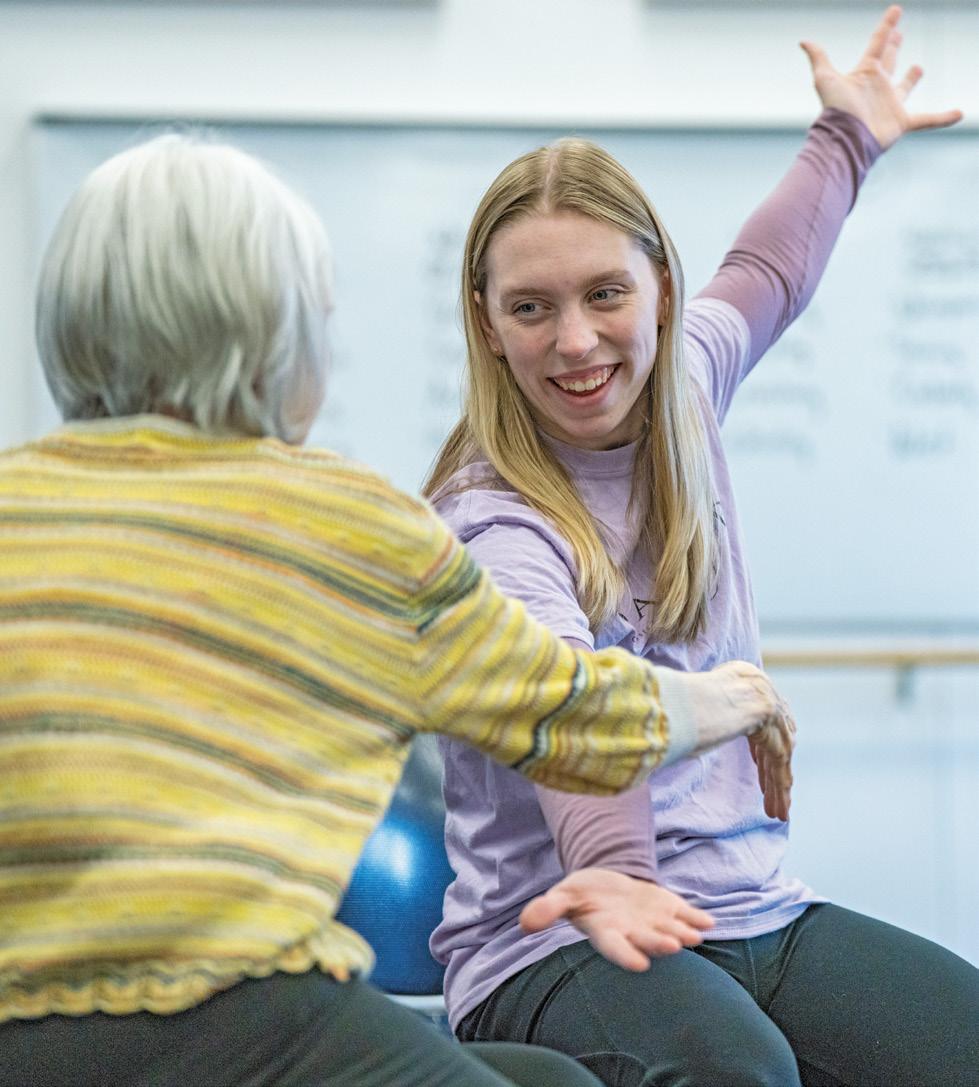
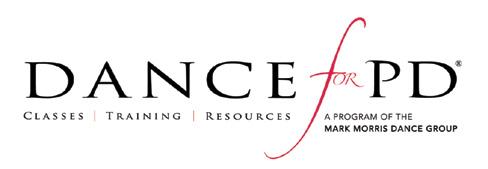

Lloyd Mast’s favorite motto on the shirt he designed for the Dance for PD class
just in memory but in action,” she said.
Dance majors Lauren Clingenpeel and Haley Tabor are the first two recipients of the Lloyd Mast Scholarship. Both will spend their senior year at JMU completing Dance for PD training.
Clingenpeel, who is also majoring in Social Work, said she loves coming to the class each week. “I love seeing people moving, people exploring — even flaunting — what they can do. I can see how dance can help so many people.”
For Tabor, the work is deeply personal. “My adopted grandmother has Parkinson’s, so this is a way for me to give back to that community,” she said. “It’s also beneficial to me. All week, I’m in complex, hardcore dance training, but this lets me get back to the beauty of movement at its core.”
Lloyd treasured relationships with JMU volunteers like Clingenpeel and Tabor, his wife said. Now, because of the Lloyd Mast Scholarship, new teachers will continue fostering the inclusive, compassionate community that he helped build.
“Lloyd loved talking with the students, hearing about their lives and studies, and he often went to their student dance recitals to support them,” Donna said. “When Lloyd passed, I reflected on what had brought him the most joy in his later years, and this was it. This was what he loved. The scholarship felt like a way to honor that and keep his joy alive for others.”
— Jamie Marsh
Scan the code to learn more about how Dance for PD helps the community get moving.
The 2025 Women Who Amaze Summit was a weekend of inspiring speakers, networking and awards, as more than 150 women celebrated collective giving, women’s philanthropy, and supporting future Dukes.
“There are places that shape us. Places that stretch us. And then there are places that catch us — with open arms and open hearts,” said Dr. Cannie Graham (’95, ’20M, ’25Ph.D.), associate vice president. “James Madison University is one of those places. For me, this is home.”
The summit theme was Her Story, Your Story, Our Story. Women shared three words that defined their connection to JMU. Barbara Bouldin’s (’87, ’20P) words? Friends plus family equals framily. “You are my sisters,” she said. “And now, we’re choosing to be ‘framily’ for the students coming after us. We’re becoming someone’s framily before we even meet them.”
Elizabeth Paul (’03) ignited a fire in her opening keynote. From her experience leading The Martin Agency through the COVID-
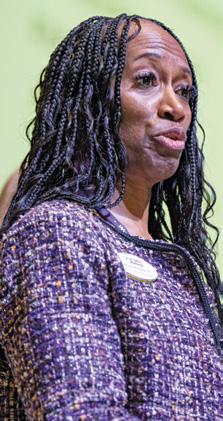
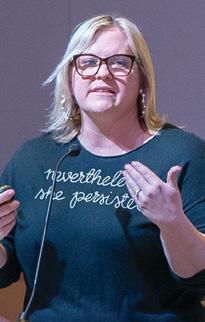
Women Who Amaze Summit embraces the power of lifting each other up
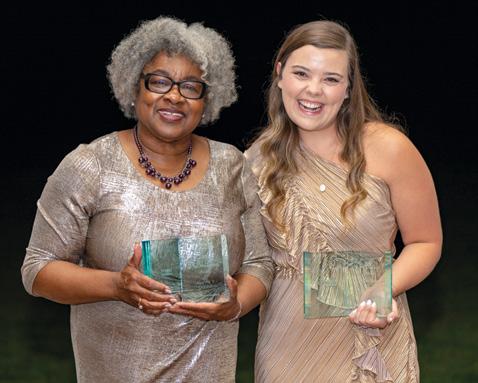

“Be a culture of people who take the hard roads and make new things possible.”
— ELIZABETH PAUL (’03), chief brand officer
19 pandemic, she spoke about strength and authenticity. “Women persist. We thrive. We adapt,” she said.
WFM Executive Advisory Council Vice Chair Carol Anderson (’86) shared, “JMU gave me a sense of belonging. Not only did I belong here as a student in the ’80s, but, through Women for Madison, I belong here today.”
The summit’s mission: to expand women’s philanthropy, focusing on scholarships and lasting opportunities. The WFM endowment ensures future students have the chance to attend JMU, no matter the obstacles.
In one of the breakout sessions, Carrie Willetts (’97) reminded everyone that relevance means adapting to change while staying true to yourself. “Don’t just chase titles. Stay grounded in your purpose.”
Dr. Ebony Parker Waugh (’93) said, “The woman you’re becoming, the woman you are, is worth fighting for. So fight for her. ... Borrow my belief in you — until you get your own.”
Graduate School Dean Dr. Linda Thomas offered a message of power, resilience and quiet courage.
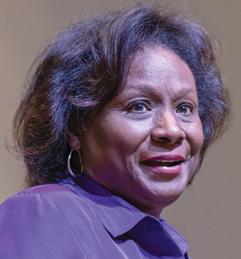
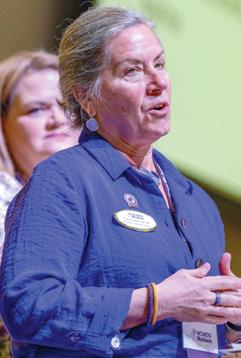
(Left): The Purple Ball; (above, L-R): Dr. Joanne V. Gabbin and LeAnna Headley
receive philanthropy awards, honoring their impact and advocacy.
Scan the code to get to know these two extraordinary leaders.
“The thrill of proving people wrong became my jam,” she said. “It might be yours, too.” She encouraged women to reframe their thinking by using “and” instead of “but” when pondering life’s challenges.
Dr. Amy Sirocky-Meck (’23Ph.D.) talked about the connection that keeps her reinvesting. “At a really critical moment, we each had an experience of being embraced. For me, the memory of that embrace has turned into gratitude.”
— Jamie Marsh
Our Story
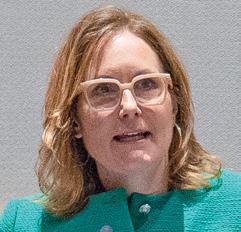
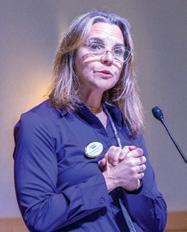
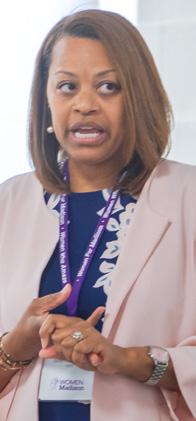
$32.8 million in FY25 is second-highest total as JMU enters new era
Charitable giving from 26,293 Dukes surged to $32.8 million in fiscal year 2025, topping fiscal 2024 by more than $4 million. Last year’s total was the second-highest in JMU history outside of a campaign. Fiscal 2025 also climbed close to the Unleashed campaign’s final year total of $33.5 million.
The JMU Foundation, meanwhile, reported that the endowment’s market value stands at $181 million, thanks in part to a 14% return on its portfolio investment. The endowment’s value has grown 47% from $123.4 million in 2022.
“This year it’s incredibly meaningful to see giving escalate as Dukes channel their investments into the campus passions that matter most to them: libraries, education, veterans and families, scholarships, athletics, faculty innovation, and so much more,” said Dr. Nick Langridge (’00, ’07M, ’14Ph.D.), vice president for philanthropy and engagement.
News of Dukes’ fiscal 2025 generosity coincides with the arrival of JMU’s seventh president, Dr. James C. Schmidt. He plans to spend 25% of his time focused on philanthropy as JMU looks ahead to its third comprehensive campaign. Schmidt has been on the road meeting with donors and business leaders during the first months of his leadership and is getting to know alumni, parents, donors and friends on his Presidential Tour.
■ On Giving Day, 5,194 Dukes contributed $1.23 million to 295 campus causes.
■ Many of this year’s donors made it a habit to give: 12,617 are considered Forever Loyal, up 20% from fiscal 2024.
■ Unrestricted giving reached almost $400,000.
■ Corporate and Foundation giving remained solid at $6.5 million.
■ Through wills and bequests, donors also arranged to give $6.3 million in future support.
Scan to learn more about why philanthropic giving is vital to the Madison Experience.
“We are excited to welcome a president who is entrepreneurial in his leadership and brings to JMU an extensive background in philanthropy,” said Langridge.
“This nexus of bold presidential leadership and rising alumni generosity is a powerful sign for the future.”
The “new” Carrier Library remained a top giving priority last year, with historical giving reaching nearly $4.5 million toward achieving an elevated goal of $5 million by the grand reopening in Fall 2026.
Stan (’54) and Rosemary Jones made the lead library gift last year with a $2.5 million investment. Carrier’s new Jones Wing will welcome generations of future Dukes through its wide, glass, Grace Street doors into what will ultimately become the intellectual and literal crossroads of campus. Stan, who died in July, spent much of his Madison Experience in the library.
More donors are also naming spaces that hold special meaning. Their generosity will help enhance the learning experience of all Dukes by supporting Carrier and the campus library system.
With JMU competing against national universities and colleges for top students, Carrier remains a vital priority. Libraries are the No. 1 campus space students and professors assess when choosing the university right for them.
Generous individuals stepped forward with a record 185 commitments ranging from $25,000 to $2.5 million, totaling more than $14.7 million toward their giving passions across campus.
Contributing to the fiscal 2025 giving surge, 28 of those gifts were at the $100,000 level, compared to 19 in fiscal 2024, and six gifts were at $500,000, compared to two in fiscal 2024. Five $1 million gifts and one $2.5 million gift were received in fiscal 2025; there were none in 2024.
Dukes also made a collective impact by giving with their hearts with more modest gifts. More than 18,000 gifts of $150 or less accounted for more than $1 million. More than $3.3 million came from 24,972 gifts of $1,000 or less.
Of the $32.8 million in total giving last year, Athletics’ charitable giving and commitments totaled more than $5 million from almost 10,700 donors.
During this time, JMU captured its first Sun Belt women’s soccer championship, first American Athletic Conference lacrosse title and second-straight Sun Belt swimming and diving title. The Dukes won their first bowl game by beating Western Kentucky 27-17 in the Boca Raton Bowl. They also captured regular-season championships in women’s soccer, field hockey, men’s basketball, women’s basketball and lacrosse.
Overall, JMU celebrated a .548 winning percentage across all sports, a 90% NCAA graduation success rate and a 3.232 department GPA.
BY KEVIN WARNER (’02)
As terms settled June 6 on the system-altering House v. NCAA federal court case, JMU announced that, like the majority of NCAA Division I institutions, it will opt in to the terms of the settlement. The postsettlement environment brings alterations to roster limits for all 18 sport programs, modifications to scholarship allocations and the advent of direct financial benefits to student-athletes.
JMU’s participation in the new structure stresses the enhanced overall value of athletics scholarship and the inherent benefits of intercollegiate athletics participation. While many institutions face difficult decisions about prioritizing athletics offerings moving forward, Madison’s methodical and intentional approach has envisioned a department that continues a broad-based, intercollegiate program in which 18 sports are equipped to maintain success.
“It’s a new and exciting time for college athletics, and especially for James Madison University Athletics,” said Matt Roan, director of athletics. “Ultimately, we exist to provide opportunities and maximum value to student-athletes, and this settlement offers a vastly improved framework to do just that.”
allowing direct Name, Image and Likeness payments to studentathletes from the institution, and new rules will create increased scrutiny surrounding third-party NIL arrangements.
Combined with cost of attendance, the introduction of new academic incentive awards and third-party NIL opportunities through JMU’s Honors1 and programs such as the Dukes Exchange, student-athletes will have unprecedented enhanced value of athletic participation. Overall, scholarship increases and the advent of direct financial benefits to student-athletes will result in a multimillion-dollar increase in JMU Athletics’ expenses.
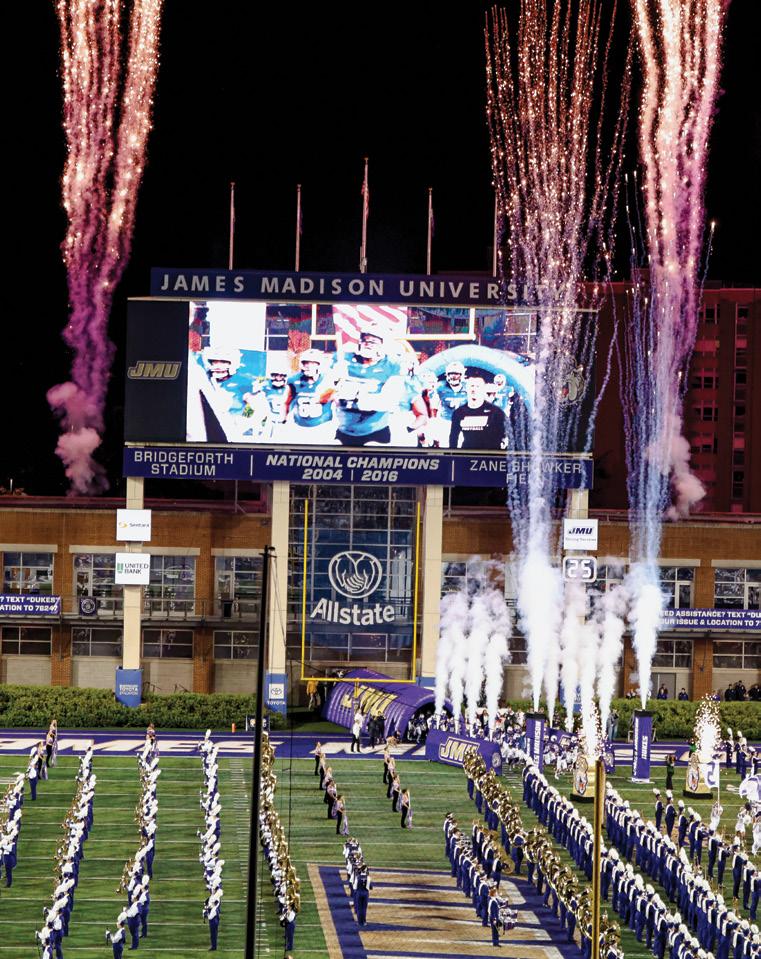
Fireworks light up the sky as the Marching Royal Dukes perform after JMU’s 39-7 win over Coastal Carolina in October 2024.
As part of the settlement terms, JMU joins all Division I institutions in contributing to the financial requirements in the form of a six-figure annual payment for back damages over the next 10 years. For institutions that opt in to the terms of the settlement, the NCAA will scrap decades-old scholarship limits in favor of new roster limits for each sport. The settlement also includes language
As the scope of the settlement came into clearer view, Athletics administration has worked diligently behind the scenes for more than a year to ensure the ramifications on Athletics would not hinder the progress of decades of growth, but rather that the department would be positioned to thrive in the new landscape.
A key thread of the settlement is the ability for studentathletes to enjoy direct financial benefits in the form of NIL. Thanks to the Honors1 program and Dukes Exchange, those opportunities are in place at Madison.
Athletics has lauded itself as a department that experiences broad-based success across all
18 of its sport programs. Given this history and identity, it was critical for the department that the new approach did not force any program to take a step back in order to boost another program forward. To this end, Athletics strives to equip each program with the resources to be a top program in its respective conference and parallel with the top peer programs nationally in each sport.
People are critical to the success of Athletics. As JMU navigates the financial impact of the settlement, it has been able to do so without affecting one job within the department or removing participation opportunities beyond what may have been dictated by terms of the settlement and Title IX.
That said, the financial implications of the settlement are real. The days of scholarship limits are gone from NCAA vernacular. Instead, each sport now has roster limits outlined by the settlement with the ability to fund scholarships to that maximum number of roster spots. For some sports, such as baseball, lacrosse and soft-

ball, the allowable number of scholarships jumps significantly.
JMU’s strategy for scholarship distribution allows the department to grow by adding up to 15 total scholarships in 2025-26. That figure could continue to adjust each year, as resources allow. JMU has finalized its roster number for each sport for 2025-26. Coaches have been equipped with this number for months and have been building next year’s rosters with this new number in mind.
Note that the House settlement does not remove the impact of Title IX outlining fair distribution of participation and scholarship resources by gender. JMU has historically achieved Title IX compliance via Prong 1 (proportionality) and, based upon the advice of its Title IX consultant, will continue to do so. With the university’s higher percentage of female student enrollment, Athletics maximized the possible number of male roster allocations, up to the House limits, which in turn allowed
(Clockwise from left): 2025 Sun Belt Player of the Year Peyton McDaniel drives to the hoop; men’s basketball forward Eddie Ricks slams it home in a win against Southern Miss; Peyton List high-fives a coach after a home run against Texas State; football fans watch the Marching Royal Dukes rock Bridgeforth Stadium.
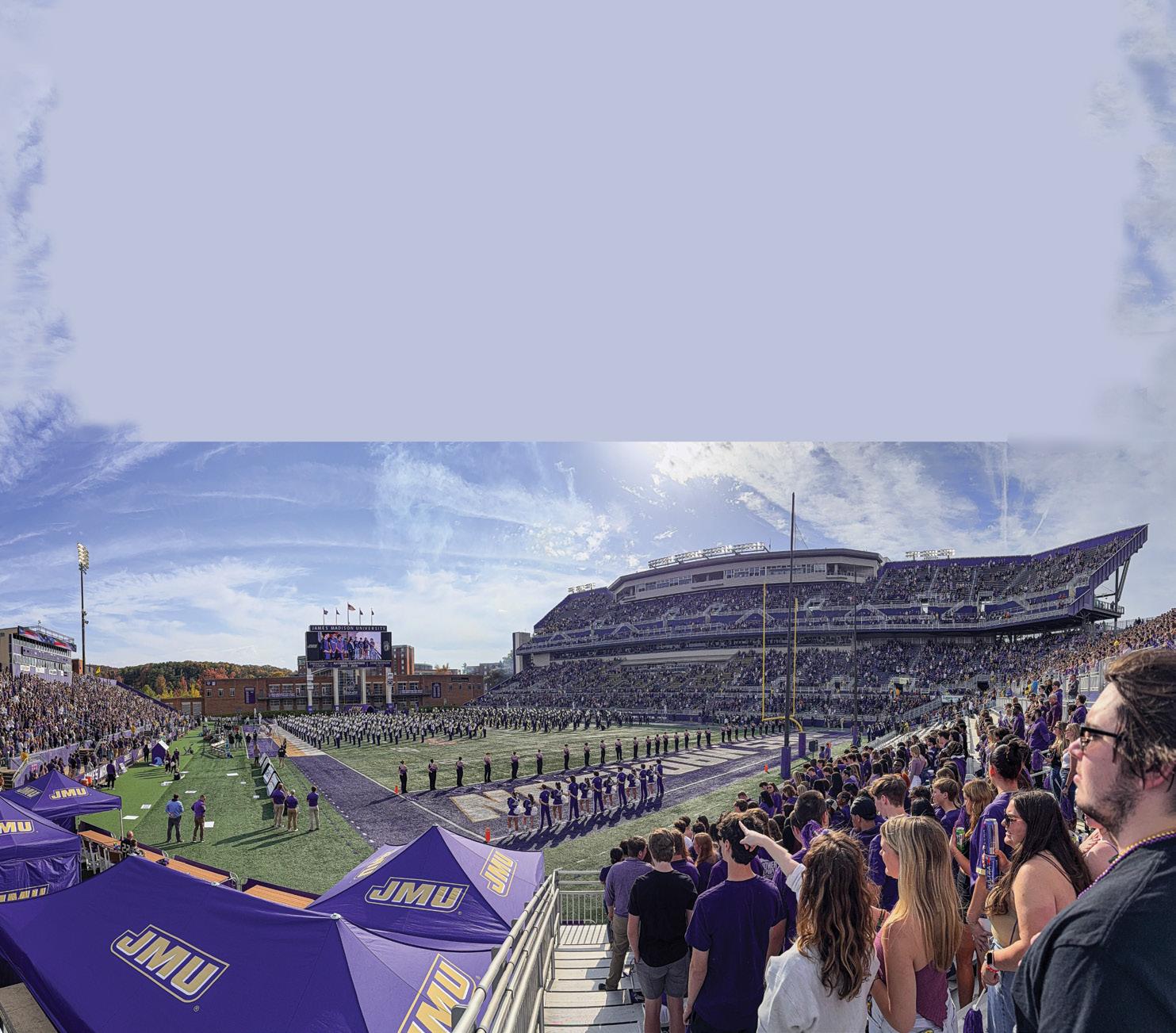
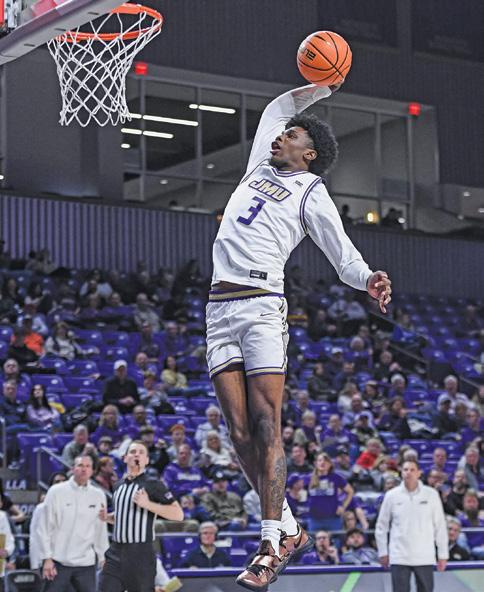
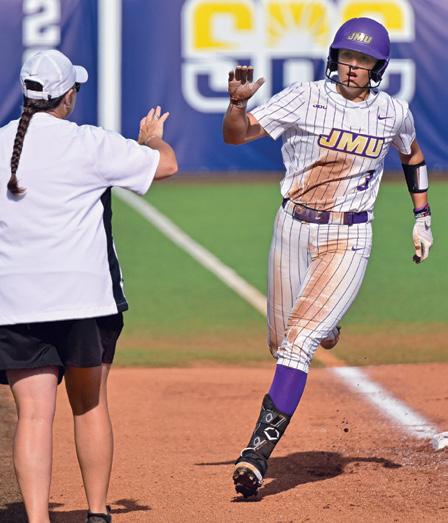
it to protect the maximum number of female opportunities. Thus, roster numbers on the men’s side are solid, while individual sports on the women’s side could slightly increase or decrease each year to meet various strategic needs.
Previously, due to NCAA rules, scholarship agreements were distributed in an equivalency fashion that provided the student with a percentage of tuition and fees and cost of attendance. In light of the changes to NCAA rules, JMU will shift its philosophy regarding scholarships to provide coaches with the flexibility necessary to create competitive financial offers for student-athletes. These offers can contain traditional scholarship funds, academic awards or incentives, as well as institutional NIL agreements.
Tremendous work went into building this new model for Athletics, and resources will be necessary to ensure its success, including a combination of realized department efficiencies and increases in self-generated revenue.
To enhance the value of sports participation at the university, Athletics and the Duke Club are proud to announce the launch of the Student-Athlete Enhancement Fund, a groundbreaking initiative that empowers fans, alumni and donors to support and retain student-athletes at JMU.
The fund positions JMU with additional financial support for student-athletes, with a focus on recruiting and retaining elite talent who maximize their opportunities at the university. The Student-Athlete Enhancement Fund is a strategic investment in the future of Athletics. By focusing on recruiting and retaining top-tier student-athletes, the department and its constituents will work collectively to ensure that JMU remains competitive on a national level.
“At JMU, our mission has always been to elevate the student-athlete experience — academically, athletically, and in personal and leadership development,” Roan said. “The Student-Athlete Enhancement Fund represents our commitment to providing meaningful opportunities in this new era of college sports. We will be able
to attract the very best student-athletes who match the culture and pursuit of excellence that we expect at JMU, while also providing resources to retain them to continue their careers in Harrisonburg while pursuing a degree.”
The fund will serve as a vehicle for donors and fans of Athletics to contribute directly to initiatives that impact student-athletes, including budgetary support for revenuesharing models. By doing so, the Duke Club and Athletics continue to lead with innovation and integrity while reinforcing a culture of excellence.
The Student-Athlete Enhancement Fund provides an additional channel for donor giving, but it does not replace the Duke Club Annual Fund. The Annual Fund will continue serving as the key vehicle to support student-athlete scholarships, along with the overall department operating budget. The growth of the Annual Fund will be critical to addressing the rising scholarship cost for the department.
Contribute to the new Student-Athlete Enhancement Fund. Or to discuss how best to direct your support of JMU Athletics, please contact the JMU Duke Club: JMUDukeClub.com | dukeclub@jmu.edu 540-568-6461
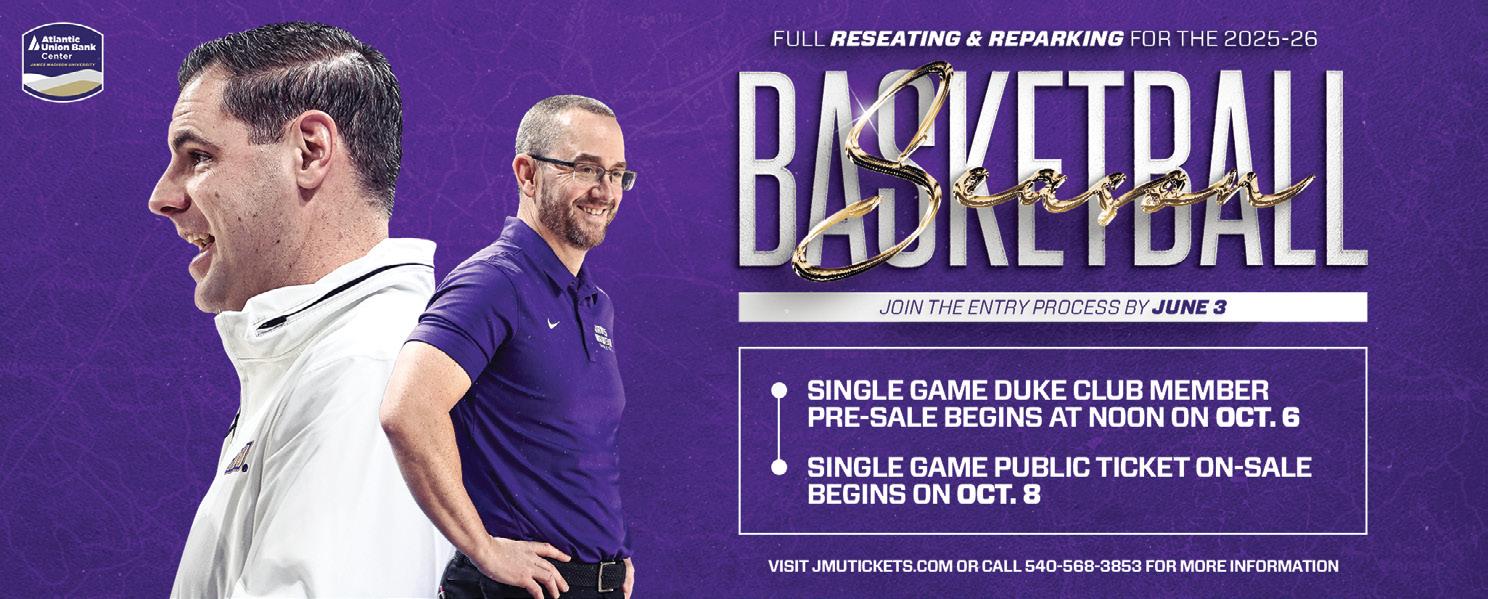
Athletics celebrates successes and transitions in 2024-25
In many ways, James Madison Athletics’ 2024-25 competitive season marked a year of transition. It was the university’s first as a fully classified Football Bowl Subdivision institution as well as the first season under the leadership of Director of Athletics Matt Roan. Even so, the department never lost sight of its high standards, which include fostering an environment that blends competitive excellence with personal development.
Among the noteworthy achievements, JMU captured its first Sun Belt women’s soccer championship and first American Athletic Conference lacrosse title. The Dukes also captured their second straight Sun Belt swimming and diving title in their two short years of league sponsorship before securing a spot in the AAC for 2025-26.
With a 27-17 triumph over Western Kentucky in the Boca Raton Bowl, JMU football marked its rise to FBS with the program’s first bowl win. The department also captured regular-
season championships in five sports: women’s soccer, field hockey, men’s basketball, women’s basketball and lacrosse. The women’s basketball season, under head coach Sean O’Regan (’03), featured a 30-6 record with the most overall (30) and regular-season (27) wins in program history, adding to its status as one of the top-five, all-time win totals in college basketball history.
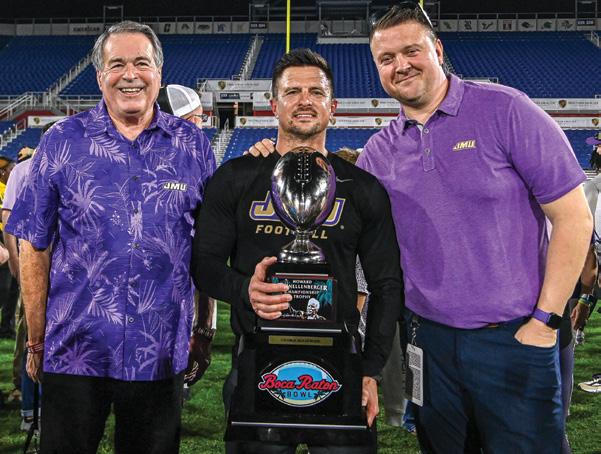
475 student-athletes
3.232 department GPA 90% NCAA Graduation Success Rate
4
Continuing the theme of transition, new coaches in football and men’s basketball helped those sports maintain their high standards of excellence. Head coach Bob Chesney led JMU football to a 9-4 record, marking the 10th straight season of eight or more wins (excluding 7-1 in the unique Spring 2021 season) and the 22nd straight year at .500 or better. Men’s basketball went 20-12 to earn a share of the Sun Belt regularseason championship in head coach Preston Spradlin’s first season, which followed a complete roster and staff overhaul from the school-record 32-4 campaign the previous year.
College Sports Communicators
5
4 All-Americans
Academic All-Americans
5 NCAA appearances (lacrosse, crosscountry, football [Boca Raton Bowl], swimming & diving, women’s soccer)
conference regular-season titles (lacrosse, field hockey, women’s basketball, men’s basketball, women’s soccer)

.548 winning percentage all sports conference Players of the Year 8 conference Coaches of the Year 5 conference Rookies/ Newcomers of the Year
2 College Sports Communicators Academic All-District
9
32 former student-athletes had their first professional opportunities
3
conference titles (lacrosse, swim ming & diving, women’s soccer)
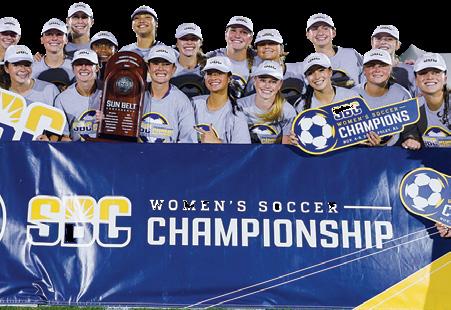
BY JOSETTE KEELOR
On the same day Mackenzie Meadows (’20) made her Broadway debut in January, she stepped up as understudy to perform the title role in & Juliet. A reimagining of Shakespeare’s Romeo and Juliet, the modern-day jukebox musical considers what might happen if the story doesn’t end in tragedy.
Cast as Juliet’s mother, Lady Capulet, and as ensemble character Nell, Meadows is one of two understudies for the leading role. “It’s exciting,” she said. “Not a lot of people can say that they have been or will ever be on Broadway, and I feel very, very blessed for the opportunity.”
A Richmond, Virginia, native, Meadows loves the musical’s hopeful message for young audience members. “[It] gives them a great example of how to stand up for themselves,” she said. “I think it’s a great show for young women, young little girls of color, to see, because it’s so rare — at least when I was growing up — to see a show being led by a young Black woman who is really taking control of her own narrative. And then on top of that, it has songs that not only a young generation loves and knows, but also [their] parents.”
Among other Dukes who have made it to Broadway are Austin Colby (’11), who plays Tom Buchanan in The Great Gatsby, and Brent Comer (’19), who, in his Broadway debut, originated the role of eldest brother Darrel Curtis in the Tony award-winning musical The Outsiders.
“It’s a weird, unique life,” said Comer, of Frederick, Maryland. “I wouldn’t trade it for anything.”
Before the show moved to Broadway, Comer was with The Outsiders national production at La Jolla Playhouse in San Diego, California. An ensemble member, he played Paul and understudied as Darrel for Broadway regular Ryan Vasquez. When Vasquez left to star in The Notebook on Broadway, Comer made a bid for the leading role.
Richmond native Colby played Rolf in The Sound of Music at the Kennedy Center and Prince Hans in the first national production of Disney’s Frozen: The Hit Broadway Musical before making his Broadway debut. He was also part of an off-Broadway production of Jersey Boys. Original to The Great Gatsby’s ensemble,

he initially played the butler while serving as understudy for Tom and title character Jay Gatsby.
“It was a very big honor — a big, daunting task,” Colby said. Prolific actor Jeremy Jordan originated the role of Jay Gatsby until passing the baton to seasoned actor Ryan McCartan in January. “They’re just extraordinary talents with big shoes to fill, so it was always an honor to take up the role and give them a break. But definitely intimidating.”

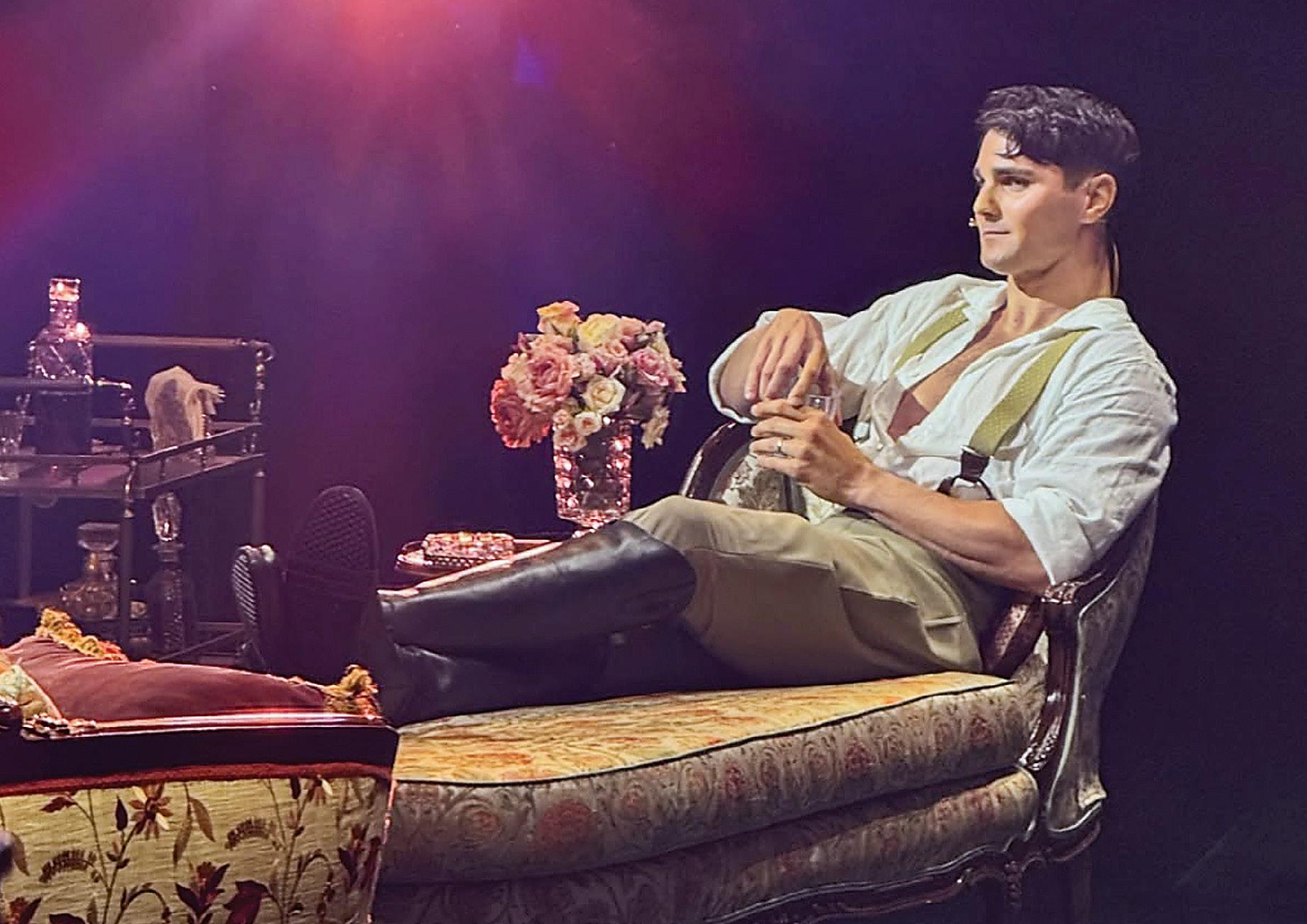

“Not a lot of people can say that they have been or will ever be on Broadway, and I feel very, very blessed for the opportunity.”
— MACKENZIE MEADOWS (’20)
Originally, Colby was studying Music Education, with a goal of teaching students like himself to sing, when professor and musical theatre coordinator Kate Arecchi challenged him to consider an acting career.
“I had done a little bit of theater, but I really was a bad actor, so bad,” Colby said. “Kate just really took the time and believed in me, and cast me as Curly in Oklahoma. ... She said, ‘You’re going to graduate and get your teaching degree, and then you’re going to go
be an actor. And I was like, ‘Nah, I don’t think so.’ But she was right.” Meadows also hadn’t planned to prioritize acting until enroll ing at JMU. A lifelong dancer, she was pursuing a degree in Musical Theatre, when two pivo tal moments cemented her passion for acting. First was securing the role of Whatsername in the rock musical American Idiot, led by guest director, choreographer
(Opposite): Mackenzie Meadows (’20) is cast as Lady Capulet and Nell in & Juliet on Broadway, and also understudies as Juliet.
and Broadway actress Nancy Ander son . “Before that, I didn’t think of myself as a lead,” Meadows said. “I think because I’ve been told so much that that just wasn’t for me, it really started to be my identity. ... And [Anderson] was like, ‘No, you are all of those things and more.’”
Later, while taking a class required of Theatre majors with associate professor Wolf J. Sherrill, Meadows realized a far greater love for acting. “It was supposedly very, very hard ... and most Musical Theatre majors opted out,” Meadows recalled. “It was the hardest material I’d ever worked on at the time as an actor, and it pushed me to my limits as an actor. ... From there, I was just so excited about auditioning for plays at JMU.”
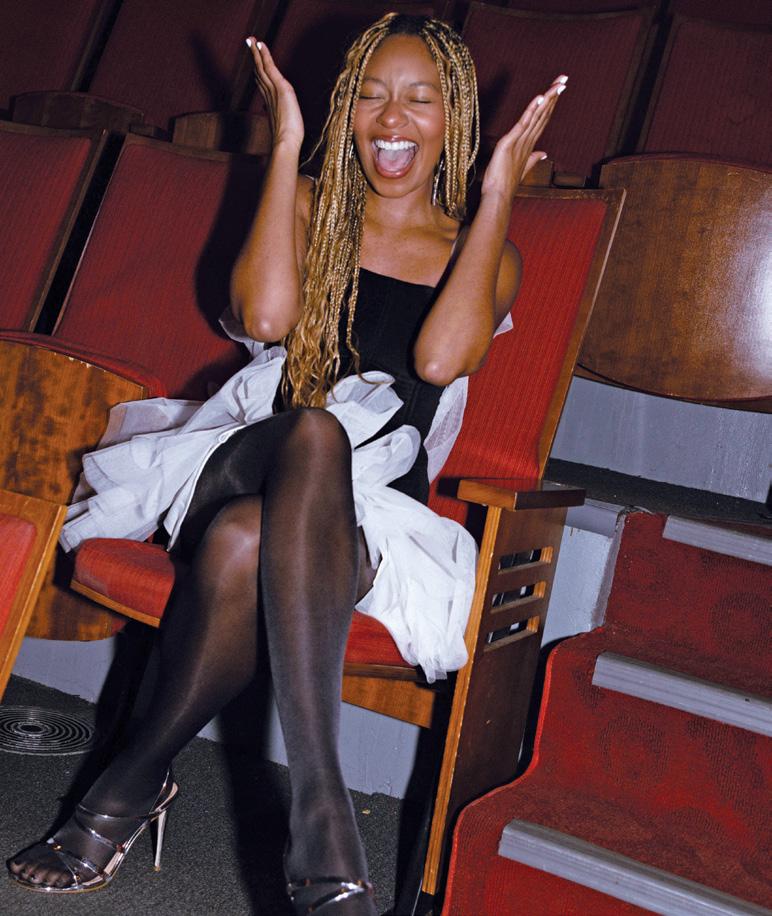
Comer caught the acting bug in high school after he mistakenly signed up for a musical theater elective, thinking it was a newscasting class. “It was a wild mistake,” he said. But he stuck with acting, performing with the Catoctin Mountain Players as the Baker in Stephen Sondheim’s Into the Woods and Melchior in Spring Awakening. He also portrayed Prince Eric in an original adaptation of The Little Mermaid at the Maryland Ensemble Theatre.
But it was while pursuing Musical Theatre at JMU that Comer became serious about his craft. JMU was “the place that lit a fire under me,” he said, adding that it made him “a very hungry, ambitious actor.”
Among his favorite memories was a 2018 production of Into the Woods at the Forbes Center for the Performing Arts, this time as the Wolf and Cinderella’s Prince in what a reviewer from The Breeze called “a standout vocal performance.”
JMU helped him test his limits as an actor. “The program gives you all the tools to make yourself the artist you can be,” he said. “You can make the program whatever you want for yourself, and that’s the best kind of program I think there is.”
In Comer’s fourth year at Madison, Arecchi connected him with The LINK Program, an intensive workshop with master classes for singers, dancers and actors that provided chances to meet choreographers, casting directors and other industry experts. “It was an opportunity for me to be seen by agents and such,” he said. “And to get an idea of what tools I needed beyond my college education to be successful.”
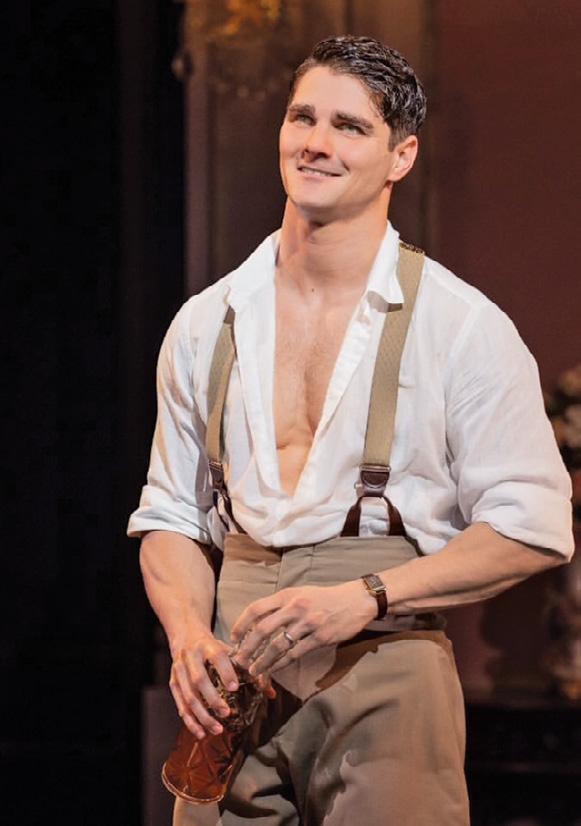
Accepted into the first of six cohort groups, Comer later secured professional representation through a musical showcase that JMU offered at Manhattan-based The Growing Studio International.
The following year, Meadows was accepted into LINK and signed with CGF Talent. “You’re working for, like, 12 hours a day with other students, mainly seniors from different colleges,” she said. “We had a showcase at the end of it, and I was lucky enough to have 30-plus meetings with different agencies, which was just super, super shocking. I didn’t see that coming. I was really crossing my fingers, just that one person wanted me.”
Only two months after graduating from JMU, Comer landed his first professional role in the ensemble cast of the 2019 Broadway national tour of Les Misérables. But then the COVID-19 pandemic brought an abrupt end to the tour and to live theater, and Comer moved home to Maryland to ride out the shutdown. Slowly, live theater made its return, but Comer’s search for new roles yielded little success. He considered calling it quits until his agent called with an audition for the world premiere of a musical based on a bestselling novel, and Comer gave his theater dreams one final shot.
Now living in Queens, Comer is grateful for the stability that a steady role brings. “The dream was just to be a working actor,” he said. “If you can do that, you’re in good shape.”
Though he doesn’t count dancing among his strengths, Comer said his studies played a significant part in helping him land his leading role in The Outsiders. “It’s a very physical show, and I think JMU prepared me for that.”
Since making her move to Manhattan, Meadows has kept busy performing on stage around the country and touring with the Trans-Siberian Orchestra. Recently taking to the small screen, she’s appeared in Fantasmas on Max, Elsbeth on CBS, and Season 3 of the Sex and the City reboot And Just Like That...
“The dream was just to be a working actor. If you can do that, you’re in good shape.”
— BRENT COMER (’19)
But her “dream role” came in the summer of 2023, when she played Maureen in RENT at the Paper Mill Playhouse in Millburn, New Jersey. “RENT is my favorite show of all time,” she said. “It was the first musical I ever saw on stage in Washington, D.C., when I was, I want to say, 9 years old. ... I loved the story; I loved the message, and it’s still my favorite show to this day.”
Though starting his career with an education degree, Colby believes skills like voice anatomy, pedagogy and music theory gave
him an edge in theater. “It kind of made me feel ahead of the game in some areas of musical theater,” he said.
For a few years, he performed in regional shows like West Side Story at the Signature Theatre in Arlington, Virginia, and Smokey Joe’s Café at the Arena Stage in Washington, D.C., before he made the move to New York. Now living in Washington Heights, Manhattan, Colby recently pivoted to film and TV, playing Carson in this year’s Hallmark Channel movie Sisterhood, Inc , starring Rachael Leigh Cook and Daniella Monet; Tech Bro in the film Pretty Thing, with Alicia Silverstone; and Shep in the first episode of the Friday the 13th prequel series Crystal Lake, streaming on Peacock in 2026.
“I always say theater kind of rescued me,” Colby said. “It offered me an escape, which I think is a really beautiful thing. And what’s nice is, I think it also offers the same thing to audiences when they come see a show — a bit of an escape.”
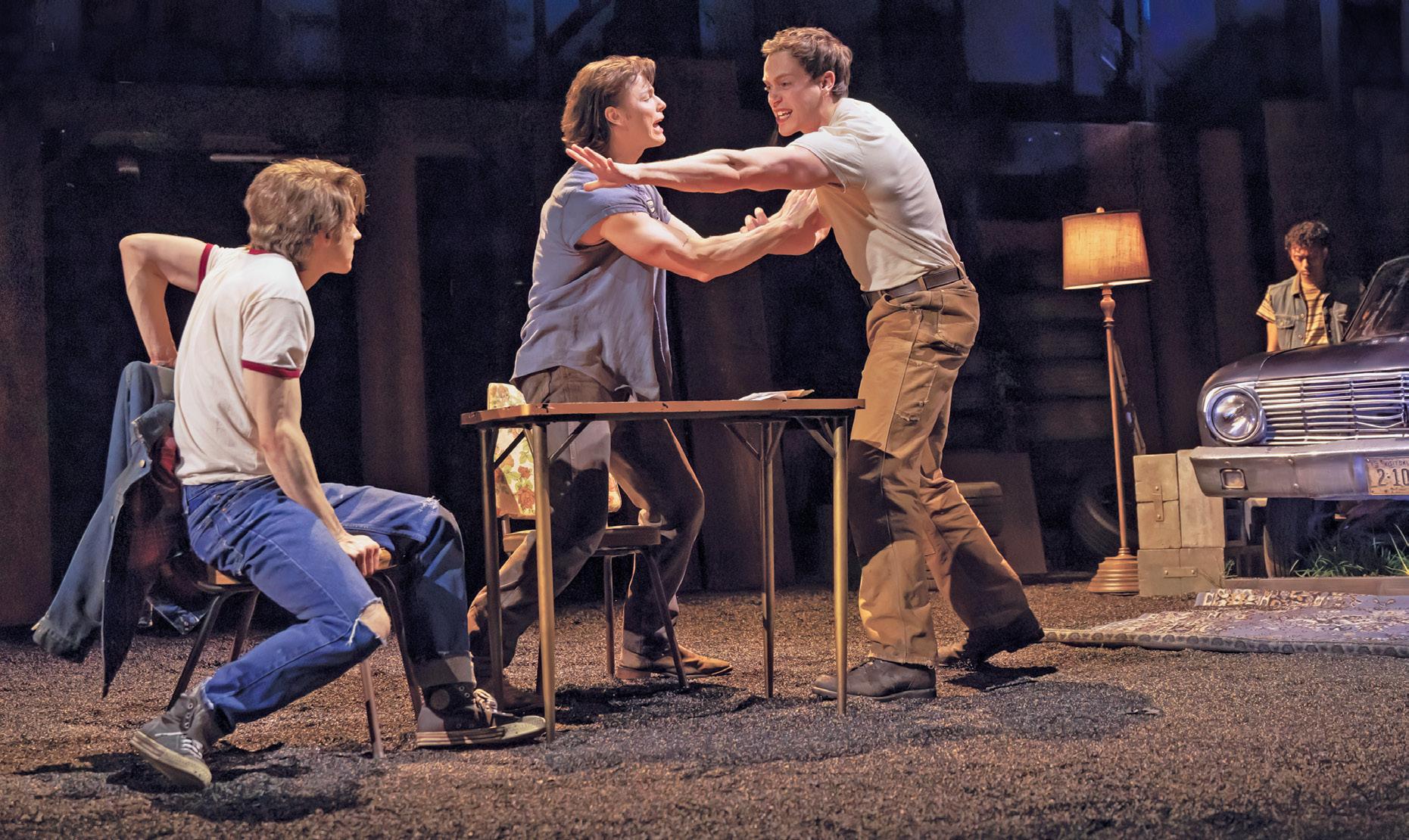

President James C. Schmidt celebrates the first day of classes at JMU by joining students on the Quad for the annual Dukes First Day Event.
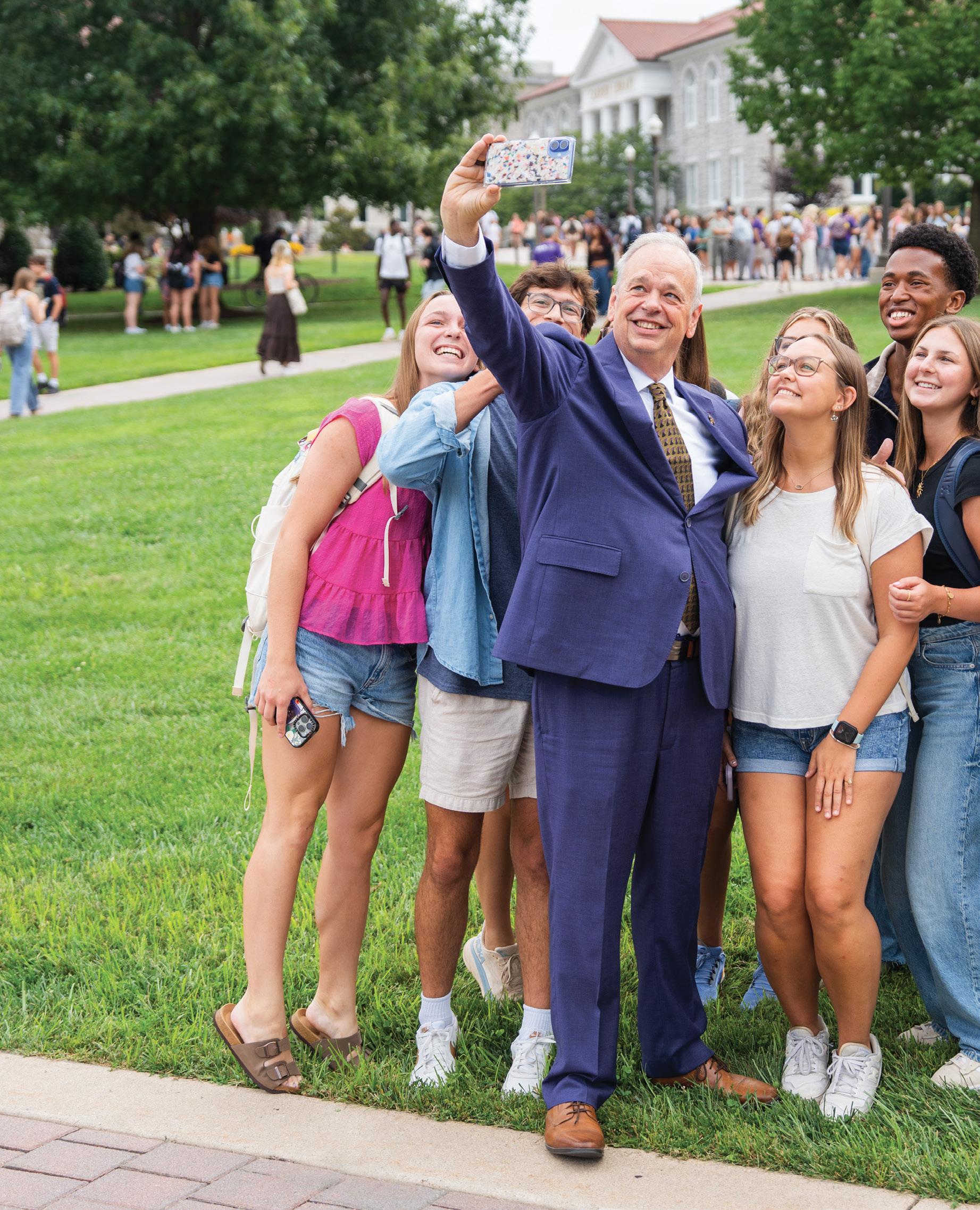

In March, following a nationwide search, Dr. James C. Schmidt was announced as the seventh president of James Madison University. His tenure officially began July 1. Madison recently caught up with Schmidt, aka President Jim, to discuss what drew him to JMU, his vision for the university and some of the challenges facing higher education.
By Jim Heffernan (’96, ’17M)
MADISON MAGAZINE: You’re the first president of JMU to have led another university prior to coming here. Before you ever set foot on campus, what did you know about JMU, and what was it that made you want to apply?
PRESIDENT JIM SCHMIDT: I was a bit surprised to learn that I was the first person to serve in this role who had been a president before. Frankly, institutions of JMU’s stature often attract sitting presidents to apply. I can tell you, JMU was on my radar. I was working on my third strategic plan at the University of Wisconsin-Eau Claire, having served 12 years there. Eau Claire had accomplished a lot, and I was really pushing our campus to go to that next level. … When you’re going through that process, it’s helpful if you can point to peer institutions around the country that have had a similar journey to let your people know it’s possible [and] to get them to dream big enough to really accomplish that. As so, as we were developing our new strategic plan, I asked my vice chancellors to identify three or four other former teachers’ col-
leges around the country that had really risen to a new level. Not surprisingly, JMU was one of the schools that came back. And I’d heard colleagues and people around the country talking about JMU, so I was intrigued.
MADISON: As a candidate, you visited campus as a “secret shopper.” What were some of your impressions of the university and some of your takeaways from that visit?
SCHMIDT: [During the search process] I was really excited about everything I had learned about JMU, and every interaction I had with the search committee left me more excited than before. But because it was a confidential search, we were never really going to be on campus. And for me, a sense of place is terribly important. I wanted a sense, not only of the physical campus, but more importantly, what was the culture? … And so, I told my wife, ‘I think I need to just jump on a plane and go see for myself.’ I spent about two and a half days in Harrisonburg. It was the third week of January, and there was snow on the ground, so I felt right at home.
wi th a
What I experienced was, first, students who are very earnest and hardworking. They were studying all across campus. I went to D-Hall and overheard students talking about their experiences in a class or in a research project, or study abroad. I would go up to their tables and ask them, ‘Hey, I’m just curious. Would you mind telling me why you chose JMU? What do you love most about it? What do you hope to do when you leave?’ And I sat back, and I heard these amazing stories. And it was universal — not one person had a bad thing to say. And what was funny to me was, not one student asked me who I was or why I was asking these questions.
I visited the Forbes Center for the Performing Arts. I was in the [College of Business], the [College of Health and Behavioral Studies]. I didn’t get to every building on campus but enough to have a real sense of the place. I also wanted to see firsthand what it meant to have Dukes holding doors for one another. I wanted to know if that was just a marketing slogan or if it was a real thing. Turns out, it’s a genuine act of kindness. It blew me away.
I’ll never forget, I called my wife from the hotel room the first night, and I was a little bit out of my skin, I was so excited about the place. I told her, ‘I think this is it. I think this is the right fit for me.’
MADISON: When you were at UW-Eau Claire, you were known as the “entrepreneurial chancellor,” and I understand you want to take that same approach here as president. What will having an “entrepreneurial president” mean for JMU?
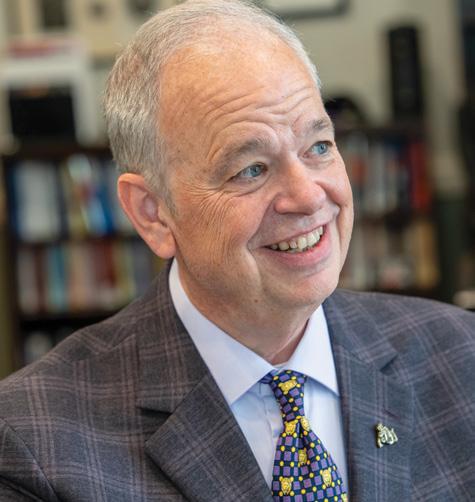
SCHMIDT: It was actually former [Wisconsin] Gov. Tommy Thompson — who went on to become president of the University of Wisconsin System, and my boss for several years — who started introducing me that way: ‘This is the entrepreneurial chancellor of the University of Wisconsin-Eau Claire.’ … So what does it mean for JMU? It means that I’m constantly looking for opportunities. I’m looking for areas where the university’s interests and mission intersect with the private sector, the nonprofit sector and the Commonwealth [of Virginia] as a whole.
“One of the primary lenses I’m always using is, what’s best for students? That’s my true north.”
I see those intersections and opportunities as having the potential to create value for everybody. … One of the chief jobs of the president of an institution is making sure that the faculty and staff have the resources necessary to provide an exceptional educational opportunity for students. … There are never going to be enough state funds and never enough tuition dollars to do all of that, so I’m looking for opportunities to bring other resources to the table, both financial and experiential. I’m also looking to see where we can partner with other organizations and make sure they’re coming out better for it as well. One of my goals is to be
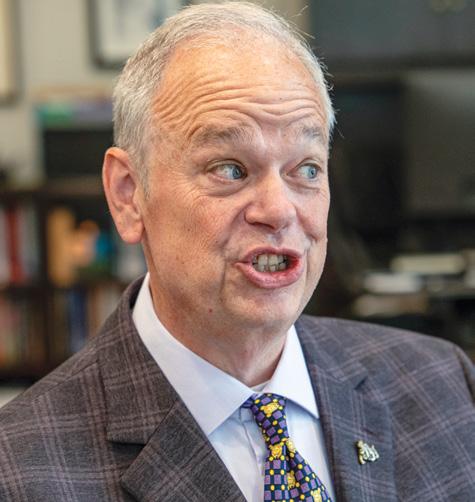
the preferred university partner for the commonwealth. I want businesses and nonprofits to say, ‘I wonder if there’s an opportunity to work with JMU.’
MADISON: Since you’ve been on the job, you’ve been crisscrossing the commonwealth, talking with business, government and community leaders, some of them JMU alumni. What have those conversations been like, and how will those relationships help our students?
SCHMIDT: One of the things I believe and have always used as a model is, you have to build relationships before you truly need them. It’s why I made time in my first week to reach out to the mayor of Harrisonburg, to the county administrator of Rockingham County and to shared governance leaders. That sends a message of where your priorities as president lie. And I want to set that expectation with businesses and alumni across the commonwealth, that we may be here in this beautiful Shenandoah Valley, but our impact is statewide and, frankly, global.
In my first four weeks on the job, I logged 3,000 miles on my car. … And what I heard from business leaders is, first of all, just great admiration for JMU. With major employers, I simply wanted to know, how are our graduates doing? And you know, I heard [favorable] comparisons with what might be considered more prestigious institutions across the country and certainly in the commonwealth as well. I discovered that some of the things that define a JMU graduate are strong communication skills, critical thinking skills

and the ability to work constructively in teams. That’s huge. … The talent pipeline is terribly important too. So, how can we do better? I want to be known as the university that’s nimble, innovative, cost-conscious, entrepreneurial, responsive. I also want us to have that reputation of being a little scrappy and, again, entrepreneurial — willing to take a little bit of risk. Because that’s where great opportunities exist for students, and it means that we’re serving the public good as well.
MADISON: As you know, fundraising is a critical role for a modern university president, with an emphasis on not only leveraging federal and state funds but also raising private dollars. Could you talk a little bit about your goals in this area?
SCHMIDT: It would certainly be nice to have greater public support. But we also need to earn the support we do receive every day. That said, I think one of the strengths of American higher education is that there is a push for private philanthropy. Why? Because it makes us more responsive. It allows us to get out of our ivory tower. It requires that we talk to lots of people about what the university is doing and is capable of doing. And I think it’s part of the broader American experience of entrepreneurship. Our country is based on the notion that the government should be responsive to the people, and we are a public institution, so it’s baked into our mission, right? … I plan to spend about 25% of my time finding the resources necessary for this institution. That includes me spending time in Richmond, where I will be making the case for better funding from the commonwealth. But I also am going to be focusing on philanthropy.
MADISON: JMU was recently classified as an R2 — a doctoral-level research institution. Given our origins as a teachers’ college and our liberal arts tradition, where do research and scholarship fit within our institutional profile?
SCHMIDT: They’re central to the university’s mission. We have a three-shield mission
of teaching, research and service. I think that’s always been true, going back to our days as a teachers’ college, and it’s certainly been true as JMU has grown and evolved. … I tend to be cautious when someone says you can only be one thing or another, that you can’t
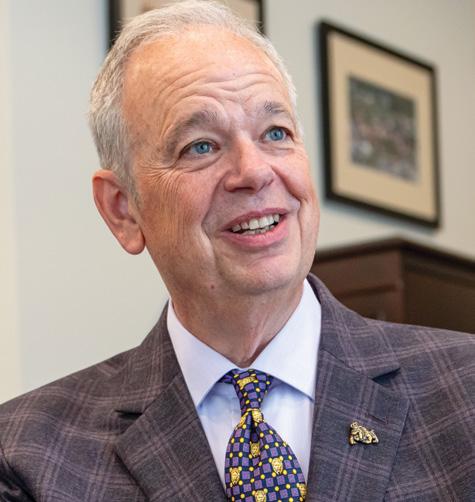
Schmidt believes that as JMU leans into its R2 status, there will be opportunities to grow its research agenda at both the graduate and undergraduate levels.
be a research institution while also honoring the things that made you great. The issue is how you do it. We absolutely can live out all three parts of our mission. This is something I’m looking forward to having a conversation about with folks on campus. We already have a stellar reputation around high-impact experiences, and one of the most powerful is around undergraduate research. My previous institution, back in 2016, was named the nation’s No. 1 undergraduate research institution among all master’s-level schools in the country. And so, I’ve seen firsthand the transformational power of that experience. … As we lean into our R2 status, we need to obviously have the continued evolution and growth of our research agenda at the graduate level. But I think we can bring that same focus and commitment to the undergraduate experience.
One of my great partnerships at Eau Claire was with the Mayo Clinic. And one of the famous quotes of the Mayo brothers, some 100-plus years ago, is ‘Doctors are best when challenged by young learners.’ I would argue that academia is best when you bring undergraduates into the research process because they ask, ‘What if and why not?’
MADISON: You’ll be hitting the road this fall for a listening tour with members of the JMU community. What are you hoping to accomplish?
SCHMIDT: I want to continue to get their feedback on how we’re doing as an institution. Before you take that next step, you want to make sure you understand, what’s your solid ground? What are you doing well? What needs attention? I also want people to dream a little bigger, because we’re really only limited by our imagination. … My brain is always focused 10, 15, 20 years down the road. And, more to the point, what has to happen today in order for us to realize those goals? … One of the things that I’ve heard from our alumni — and one of the things I want to talk a little bit more about on the listening tour — is really understanding what artificial intelligence means for higher education and the workforce. Because line skills — technical skills — may soon disappear. … JMU is already, I think, several leaps ahead of most institutions in the country in this regard, but our strategic plan needs to focus on imagining what might be. We need to be agile while we create these 10- to 15-year plans, and I will be leaning into our listening tours to help elicit some of those ideas.
MADISON: What do you want Dukes to know about you?
SCHMIDT: As an undergraduate, I was very involved in my college experience. At the time, there was a proposal to double tuition in [my home state of] Minnesota. And so, my freshman year, I was with a couple thousand students protesting on the steps of the Minnesota Capitol. We lost. In fact, tuition in my four years at Winona State went up 146%. And so, I am passionate about access to a high-quality education. One of the primary lenses I’m always using is, what’s best for students? That’s my true north. What’s good for them, what’s going to give them that margin of excellence that will set them apart from other graduates and help them become leaders in all aspects of their lives? … Also, I take a long view of things. Quick wins are nice, but my focus is on the long term.
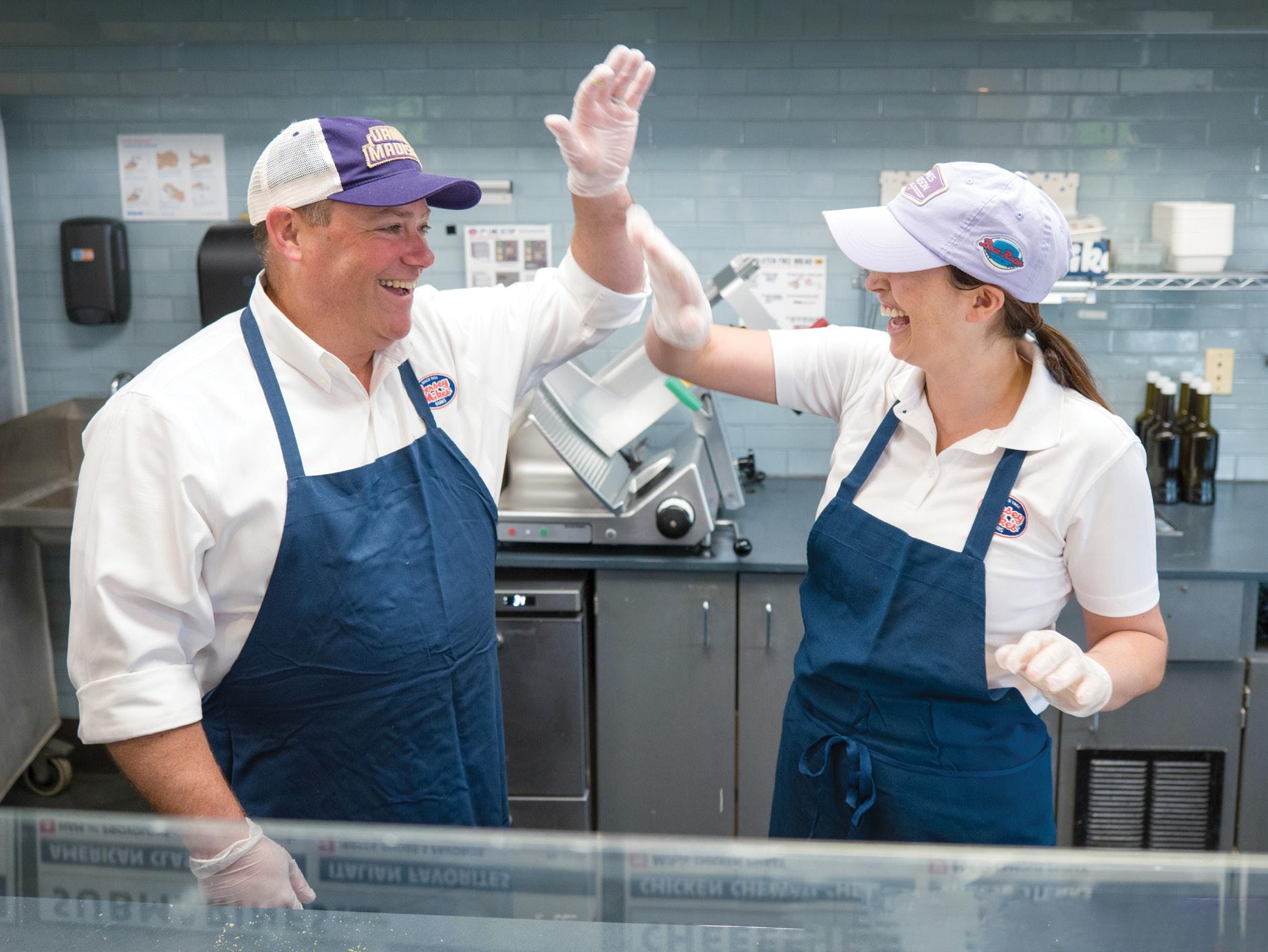
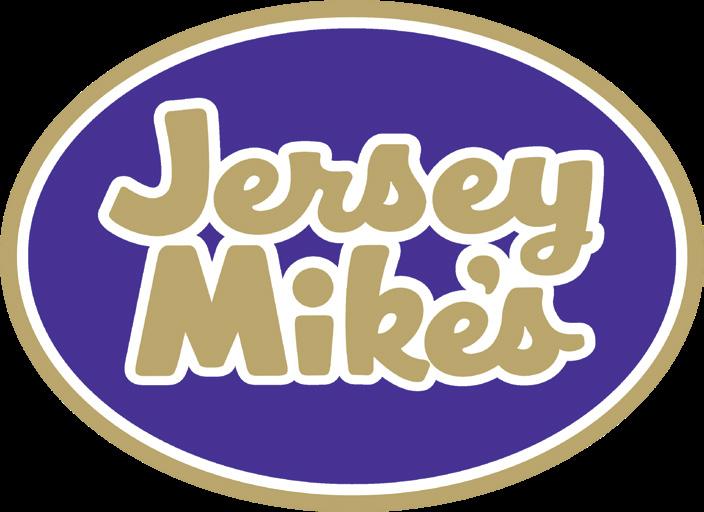
By Jim Heffernan (’96, ’17M)
The road from Point Pleasant, New Jersey, to Harrisonburg stretches more than 300 miles, from the boardwalk amusements and salt-sprayed beach houses of the Jersey Shore to the rolling hills and family farms of the Shenandoah Valley.
For a handful of executives at Jersey Mike’s Subs, it’s a path paved in purple and gold.
Caroline Jones (’10) was born in Point Pleasant in 1987 — the same year the hometown sandwich chain began franchising its stores.
Her father, Peter Cancro, the company’s longtime CEO, had worked at the original Mike’s Subs shop as a teenager. In 1975, with the help of a loan from his youth football coach who was also a banker in town, he purchased
the shop from the owner. Over the next decade, Cancro grew the business locally by continuing Mike’s tradition of fresh ingredients and fast, friendly service.
The 1980s and ’90s were a golden age of quick-service restaurant franchising, and Cancro was determined to enlarge the company’s footprint.
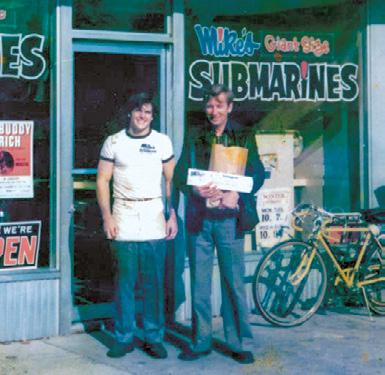
“My dad is a very charismatic, driven individual,” Jones said. “He saw an opportunity when customers were asking to wrap their subs to travel and decided to take the brand nationwide, one store at a time.”
(Above): Jersey Mike’s executives Brian Loughran (’03) and Caroline Jones (’10); (inset): a young Peter Cancro, left, in front of the original Mike’s Submarines on the boardwalk in Point Pleasant, New Jersey
Jones’ parents sold a plot of land on which they had intended to build a house so that they could pay an attorney to set up the franchising company. “They both made a lot of sacrifices when we were young to get the business off the ground,” she said.
The gamble paid off. Today, Jersey Mike’s is one of the fastest-growing restaurant chains in the country, with more than 3,000 locations and $3.5 billion in sales last year. The brand is known for its high-quality meats and cheeses, sliced to order and piled high on fresh-baked bread, as well as its signature toppings known as “Mike’s Way” — lettuce, onions, tomatoes, oil, vinegar and spices.
More than just its subs, however, Jersey Mike’s is known for giving back to the communities it serves. It hosts an annual Month of Giving campaign culminating on the last Wednesday in March, when 100% of sales are donated to local charities. This year’s campaign netted a record $30 million for community partners nationwide.
Jones went to work at the original store in Point Pleasant at 14, prepping produce for its lineup of subs. Her favorite? The No. 9: Club Supreme — roast beef, turkey, Swiss cheese, applewood-smoked bacon and mayonnaise.
Family friend Evan Mayer (’07) had joined the crew a few years prior. “I’m the middle of three boys, and when I was 13, I went to work for [Caroline’s aunt] Cathy, helping sort the produce and bop the lettuce heads on the counter,” he said.
Mayer continued to work at Jersey Mike’s throughout high school and while attending JMU, where he majored in Communication Studies and minored in Economics. After graduation, he was studying to take the law-school entrance exam when Cancro took him aside and let him know that a career with Jersey Mike’s was on the menu. “You already have a Ph.D. in sandwiches,” he told him.
Mayer decided to stay with the growing chain. He managed a store before becoming one of
the company’s first field representatives. For the next 12 years, Mayer traveled the country to help open hundreds of Jersey Mike’s locations. In 2020, Mayer was promoted to area director in charge of 45 stores across four states. He’s now a multi-unit franchisee in New York and New Jersey.
“There’s a pretty big group of us Jersey Mikers who have been with the company from childhood on up,” he said.
“I always say, I attended two JMUs in my career, Jersey Mike’s and James Madison University.”
— Brian Loughran (’03)
That list includes fellow Duke Brian Loughran (’03), who grew up a few blocks from the original store in Point Pleasant. On a summer afternoon in 1996, Loughran and his dad stopped in for lunch. Peter Cancro’s brother, John, was working behind the counter and struck up a conversation with the teen.
“Are you paying for lunch today?” Cancro asked him.
Loughran shook his head. “I don’t have any money.”
“Do you want a summer job?” came the reply.
For Loughran, it was the beginning of a rewarding career with Jersey Mike’s. After leav-
ing JMU, he managed the Richmond, Virginia, store for eight months before he too was tapped as a field representative and then area director. Today, he is senior vice president of operations. “I always say, I attended two JMUs in my career,” Loughran said. “Jersey Mike’s and James Madison University.”
Two more Jersey Shore Dukes, Katie Nolan (’11) and Matt Bottone (’13), circled back to their hometown franchise as professionals.
Growing up, Nolan would ride her bike around the corner to the original store to order her favorite sub — The No. 7: Turkey and Provolone. “My whole inner circle — all of my friends — have worked for Jersey Mike’s at some point, whether it was behind the counter or in the corporate office.”
A high jumper on the JMU women’s track and field team with a major in Sport and Recreation Management and a minor in Business, Nolan’s first job out of college was at ESPN in television advertising sales. But after a few years, she was feeling burned out and moved back home. One day at a local coffee shop, she was approached by Peter Cancro, who convinced her to come to work for Jersey Mike’s in the marketing department. Beginning in 2016, she wrote marketing plans for new store openings and later managed the company’s sports and entertainment partnerships. Most recently, she served as Jersey Mike’s franchise sales manager.
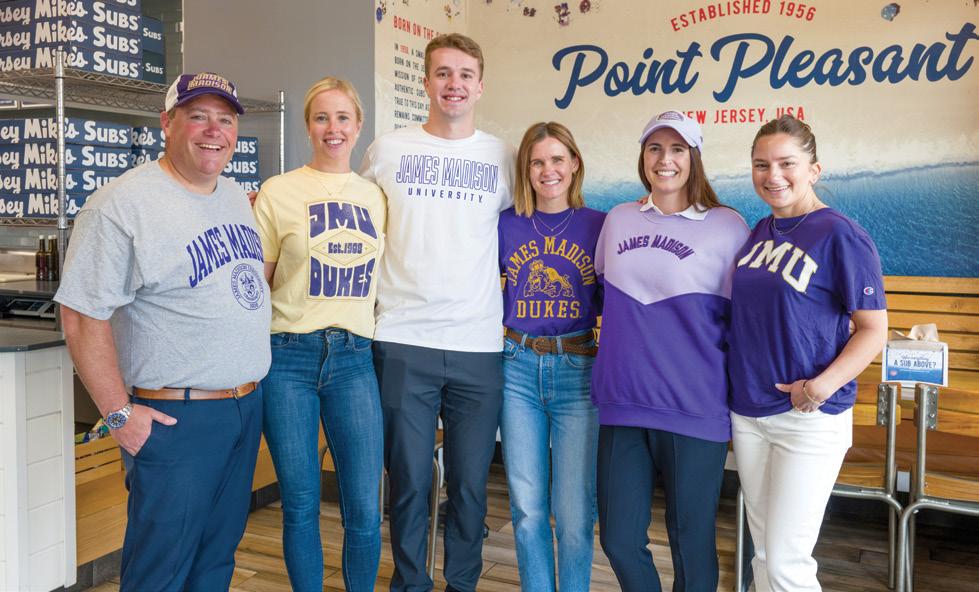
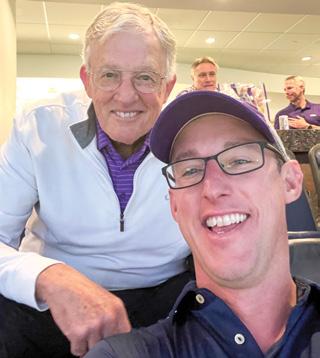
Bottone, a Psychology major at JMU with a minor in Human Resource Development, interned with the luxury fashion brand Gucci in New York City and was hired by the company as an HR assistant after graduating in 2013. By 2017, however, the daily commute had taken a toll, and Bottone began looking for other opportunities. He had previously inquired about openings at Jersey Mike’s, but at the time there were none. Then one day, he spotted an ad for an HR position with the company. After submitting his application, he followed up with a contact in the department and ended up mentoring under her. Bottone worked his way up from HR specialist to manager to director in 2024.

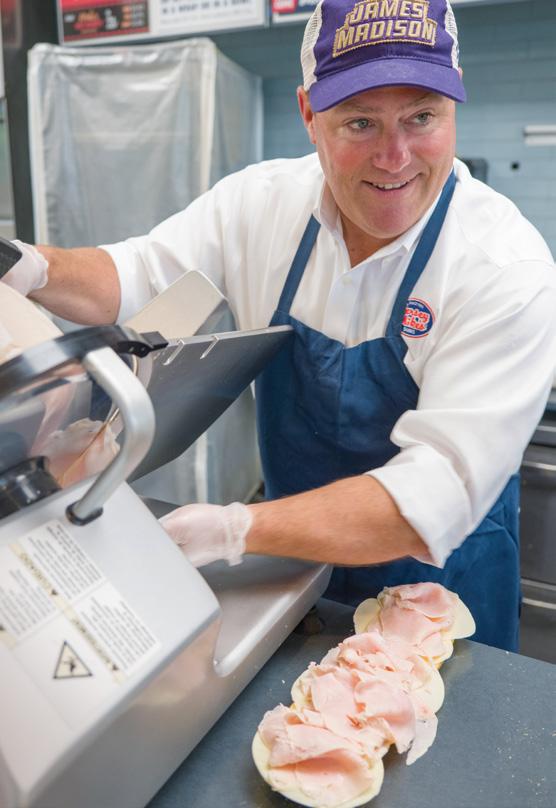
And Jones? After graduating from JMU, she too worked her way up through the marketing department at Jersey Mike’s before joining the executive team. She served as senior vice president and spearheaded the most recent nationwide store redesign and retrofit program. Because of her interest in nonprofits, Jones was also instrumental in growing the company’s Month of Giving campaign, and she currently serves as president of its Sub Above Fund, which provides financial assistance to Jersey Mike’s employees in need.
Dukes in leadership positions at Jersey Mike’s say their time in Harrisonburg was some of the best years of their lives, and they credit their Madison Experiences with shaping the people they are today.
Jones, who was drawn to JMU for its bigschool energy and close-knit feel, said her studies put her on a path to leadership. “JMU gave me confidence,” she said, “not just in academics, but in connecting with people.”
Mayer, who was vice president of JMU’s Kappa Sigma fraternity chapter, agreed. “It wasn’t just about the classroom,” he said. “It was learning how to manage people, organize events and motivate teams — all of which I use today.”

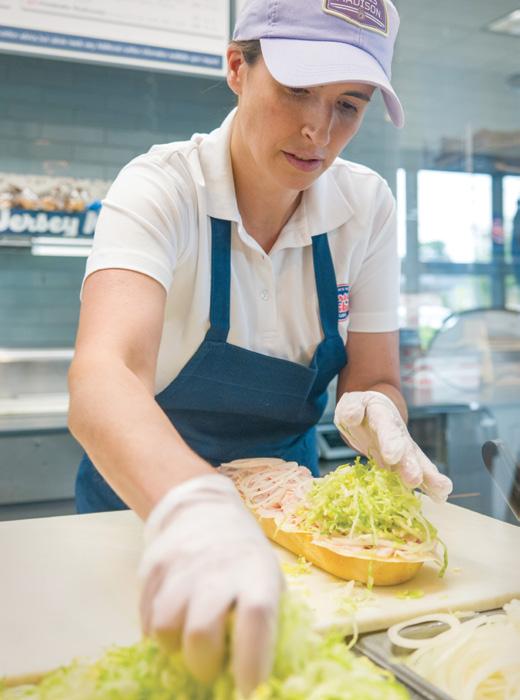
And the group fondly recalls cheering on the JMU football team during an exciting era in the program’s history. Mayer attended playoff games at Bridgeforth Stadium leading up to the Dukes’ Division I-AA national championship in 2004, and Nolan remembers celebrating with friends when JMU upset in-state rival Virginia Tech in 2010.
Loughran, whose best friend from high school followed him to JMU, met new friends as a resident of Hoffman Hall. The group remains close to this day, hosting the annual Hoffman Hall Invitational golf tournament, which supports JMU scholarships.
Bottone met his five best friends during his freshman year in Dingledine Hall, and his wife, Andrea (Criscuolo) (’13, ’14M), was a member of the JMU Swimming & Diving team. The couple have three children.
“Whether you’re on campus or in a Jersey Mike’s store, there’s a sense of belonging and pride in doing the things the right way.”
— Caroline Jones (’10)
JMU and Jersey Mike’s share more than just initials. The two brands mirror each other in meaningful ways. Both institutions emphasize people, purpose and pride.
Jersey Mike’s success starts with finding and investing in the right people.
“I think what we’re looking for is someone who we can tell is going to be a hard worker, because that’s important,” Bottone said. “Someone who wants to be a team player, who wants to make a difference in someone’s day. … And we’ve been pretty fortunate, to that end, to find people who can fit those slots.”
“We always say, we’re a people business,” Nolan added. “We just happen to make really good subs.”
Jersey Mike’s has a dedicated training facility on the Jersey Shore that is set up to resemble an actual store. Trainees learn all aspects of store operations, from making sandwiches to managing tasks to customer service and leadership skills. New franchise owners are required to have three in-store employees undergo a combined 900 hours of training.
“We’ve been known to hold up openings of locations if they don’t have individuals with the required number of hours,” Jones said, “because you’re not going to deliver the qual-
ity product that needs to go out the door.”
When it comes to franchising, the company actively seeks out store owners who believe in the brand. “If you don’t have likeminded values, then it’s not going to be a good fit,” Jones said.
Far more important than finding franchisees who are motivated by making money is finding individuals who are willing to put on the blue apron and work alongside their crews to take care of their customers.
“We found out very quickly that it doesn’t work if a franchisee doesn’t invest in the individuals who are operating their stores,” Jones said.
Mayer echoed the sentiment. “We’re not tech, we’re not automation — we’re handson, and that means investing in our teams.”
Charles “Mookie” Golden joined Jersey Mike’s franchisee training program in July 2011. Having grown up in the restaurant business, his journey into franchising was inspired by his uncle, an operating partner for McDonald’s in Chicago, Illinois. “That’s really where I first saw people who looked like me — a young minority in America — who owned franchises,” he said.
In college at the University of Maryland, Golden met a Domino’s Pizza franchisee who was getting involved with a new brand: Jersey Mike’s. “I followed him to Virginia and started mentoring under him, and the rest is history,” he said.
Today, Golden and his business partner own and operate 15 Jersey Mike’s stores in Virginia and West Virginia, including the Harrisonburg location, which opened in 2016. About half of its staff are JMU students.
“People become like your family,” he said. “Honestly, you get to know them and you watch their kids grow up. It’s a special place.”
‘GIVE TO GIVE’
Jersey Mike’s belief that making a sandwich and making a difference can be one and the same is reflected in the brand’s tagline, “A sub above.” Its mission statement is not give to get, but rather “give to give.”
In addition to supporting local charities with its annual Day of Giving, Jersey Mike’s supports organizations like Feeding America, a nationwide network of more than 200 local
“When you have a purpose that’s greater than the job or the task that you’re doing, it excites you about coming to work every day.”
— Brian Loughran (’03)
food banks; the USTA Foundation, the charitable arm of the United States Tennis Association; Special Olympics; and Wreaths Across America, which honors fallen veterans by placing wreaths on their markers, including at Arlington National Cemetery. Recently, the company held a fundraiser for victims of flooding in the Hill Country of central Texas.
“These causes connect our stores to the communities they serve,” Mayer said. “It’s powerful.”
Jersey Mike’s Harrisonburg store supports On the Road Collaborative, a youth-empowering organization serving about 500 middleand high-school students annually across six schools in the central Shenandoah Valley. The program, which includes after-school support, social-emotional learning, and career exploration, is free and includes transportation.
Over the past eight years, Jersey Mike’s has donated more than $150,000 to On the Road Collaborative, according to co-CEO Russell

Leary (’12, ’13M), allowing him and co-CEO Emani Morse (’17), a fellow Duke, to expand the program significantly.
“You don’t go from [serving] one school two days a week to now serving six schools [five days a week] without a corporate partner that really believes in you,” Leary said. “It’s been a huge part of how we’ve been able to grow so quickly and serve so many kids and also make sure our services stay free.”
On the Road is celebrating its 10-year anniversary this year and has plans to add a new middle school to its program sites. The partnership with Jersey Mike’s expanded in 2023 to include the Staunton and Waynesboro stores.
JMU and Jersey Mike’s have each grown in size and reputation over the last 25 years, becoming well-known brands. Yet for all their success, both have managed to stay true to their roots.
“There’s this common DNA,” Jones said. “Whether you’re on campus or in a Jersey Mike’s store, there’s a sense of belonging and pride in doing things the right way.”
Peter Cancro stepped down as CEO in April following Jersey Mike’s acquisition by a private equity firm. He is now chairman of the board and remains a minority owner.
Jones, an active franchise owner, said she’s proud of the number of jobs Jersey Mike’s has created in communities across the country as well as its commitment to charitable giving.
As Jersey Mike’s continues to grow under new leadership and eyes expansion into international markets, Jones and Mayer are confident that its core values won’t be lost.
“Growth is exciting,” Mayer said, “but staying true to who we are — that’s nonnegotiable.”
With more JMU alumni joining the Jersey Mike’s family, the connections continue to grow. “It’s funny how often we say to someone [in the company], ‘Oh, you went to JMU too?’” Jones said. “There’s this instant trust.”
Dukes with Jersey Mike’s are grateful for both the university that helped shape them and the company that allows them to lead with passion and purpose.
“We’re proud of what we’ve built,” said Mayer, “and proud to bring a little bit of JMU into everything we do.”

“People say when you close your eyes and go to an Illiterate Light show, it might feel like there’s five people on stage,” Jeff Gorman (’12) said during a February episode of the Being the Change podcast. Open them, and you’ll see just two rockers: lead singer Gorman on guitar while playing bass through a footoperated synthesizer, and Jake Cochran (’12) standing at the drums in a nod to his highschool marching band days. The Washington Post calls their sound “massive.”
Twelve years after graduating, alumni rock duo Illiterate Light is more inspired than ever
By Amy Crockett (’10)
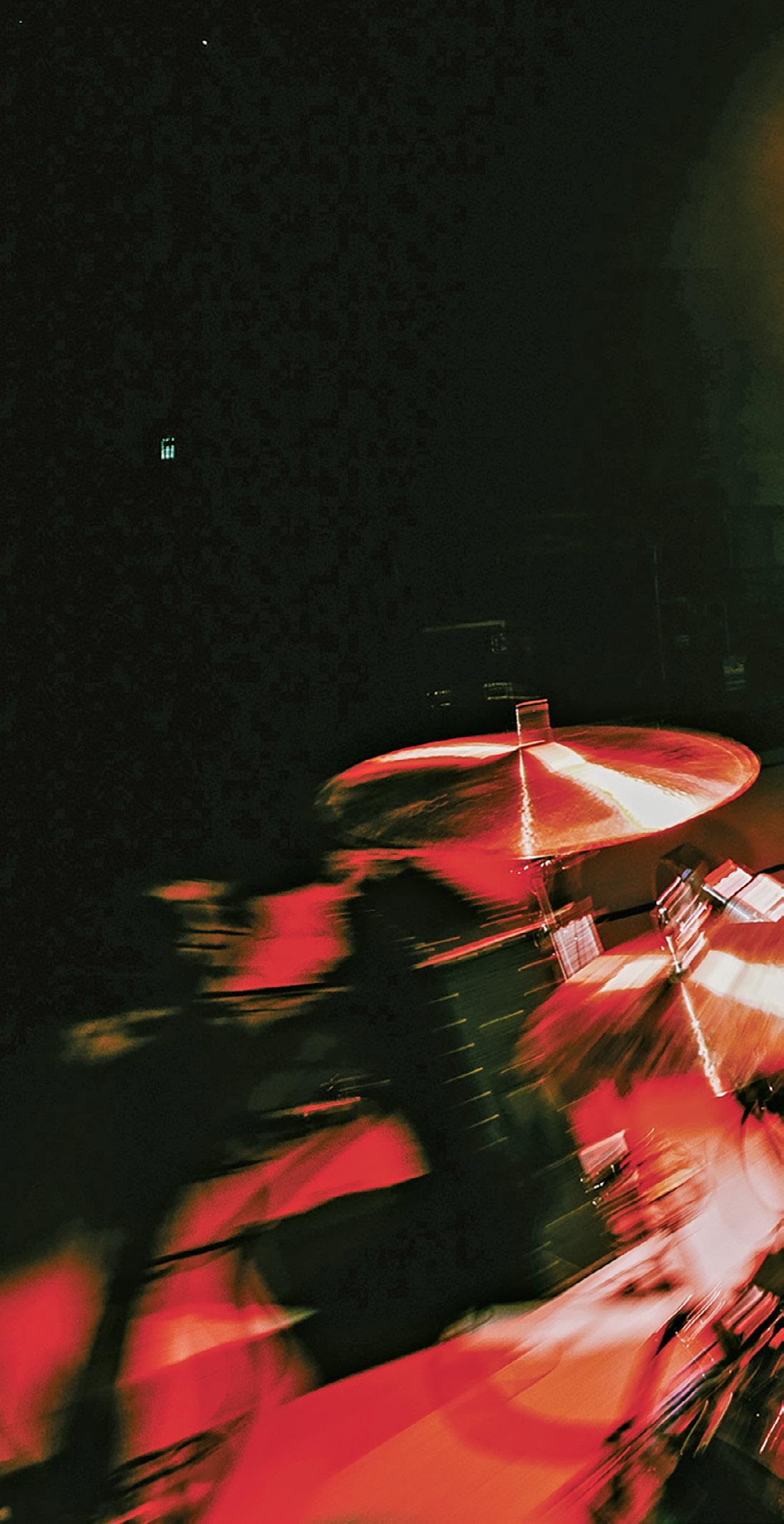
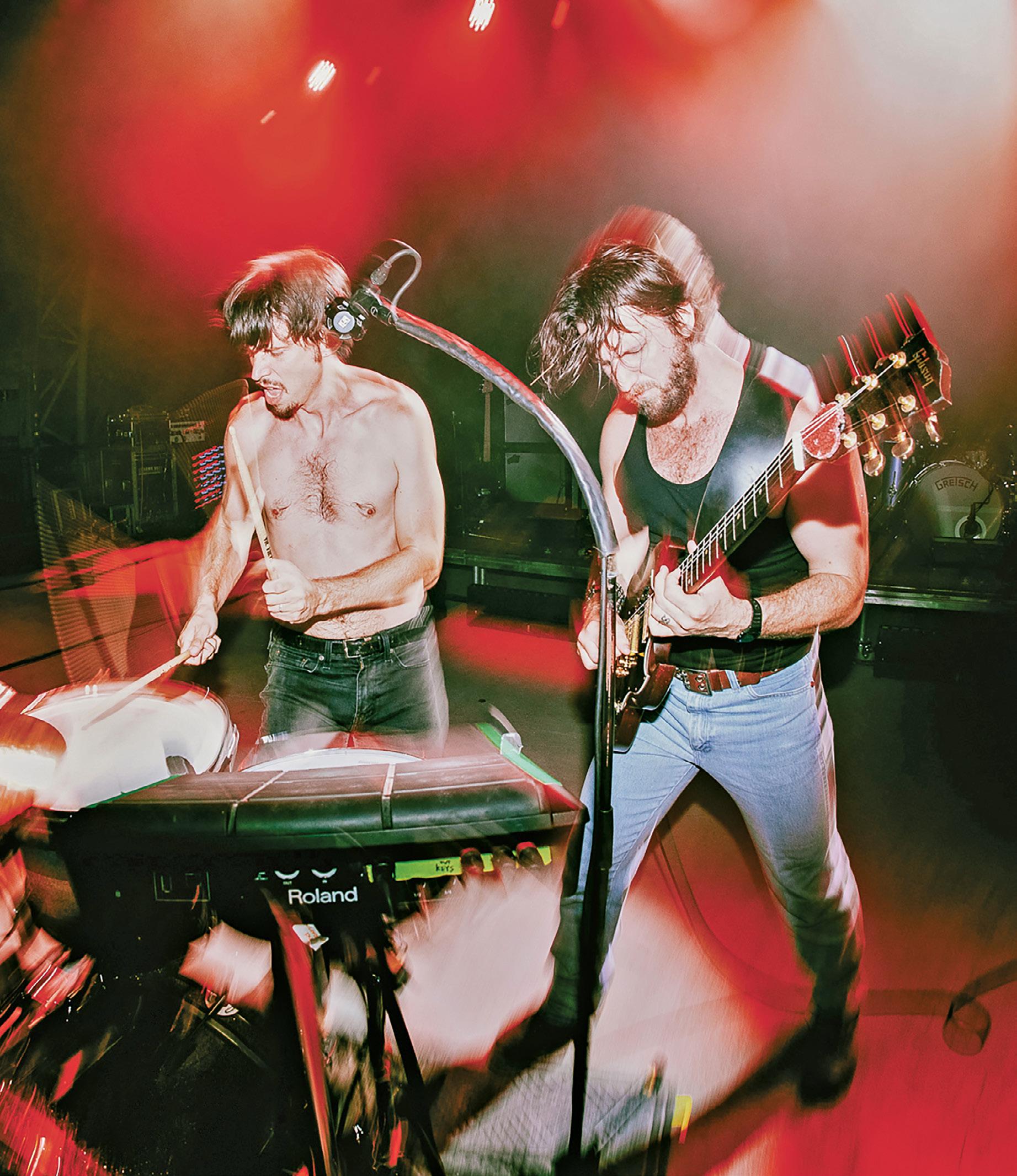
The critically-acclaimed
The name Illiterate Light comes from a lyric by the rock band Wilco. “We were drawn to the name, because it summed up this ball of energy that both Jake and I tend to exude when we make music and get on stage together,” Gorman explained.
Rather than claim a specific genre, the multiinstrumentalists are more interested in carving their own path. “We swim between a lot of different rivers,” Gorman said, “and we feel pretty comfortable in all of those places, and the fan base that we’re growing at this point seems to want to find music that is hybridizing and drawing from all these different styles. But at the end of the day, we’re happy just to be a rock duo.”
Illiterate Light’s diverse blend of sonic interests carries into the themes they sing about. “I think one thing that Jeff particularly does well in the songwriting side is his ability to take conflicting concepts or topics and then combine them in a way that we’re able to have a critique of the world around us,” Cochran said.
Gorman cites his longtime inspiration, Canadian singer-songwriter Neil Young, as a major source of creativity. “Neil Young has a very long history of writing both heartfelt love songs — and having no problem then speaking his mind politically and saying, ‘This isn’t right,’” Gorman said. “Somehow he has found this way to have these political anthems, ‘Rockin’ in the Free World,’ and then ‘Harvest Moon’ right next to each other. And I’ve really been proud to try to stand in that shadow and stand in that tradition.”
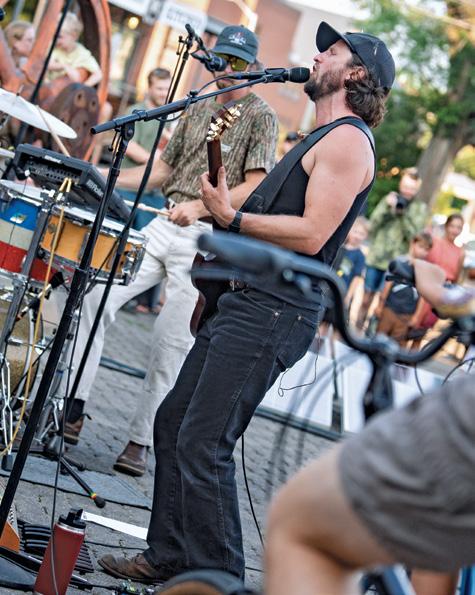
Gorman, a History major and Music Industry minor, experienced a personal transformation at JMU. Within six months of arriving as a freshman, he says he changed from a passive, 1.7-GPA party student biding his time to a fully “engaged human being.”
“Sophomore year was a turning point in my life,” he said, “and that was also the same time I met Jake, we became friends and started playing music together. That exact moment was when this fire started, and 15 years later, I feel like the fire is still roaring.”
In Spring 2012, Gorman completed his

final senior semester with 21 credits and seven courses, feeling “so intellectually and emotionally stimulated” that he wanted to go beyond what was asked of him academically. “There were things I was interested in that JMU was offering, and I ended up really loving it.”
Before Cochran morphed into a professional drummer, he was a Health Sciences major with a minor in Biology and was studying to become a physician’s assistant. His Madison Experience provided the freedom in and outside the classroom to ask questions and grow as a person.
Between the relationships and conversations with his peers and “amazing professors,” he also volunteered with the Harrisonburg Rescue Squad. “The community around the school felt so impactful,” he shared.
In November, Illiterate Light returned to campus, where they led a songwriting workshop and guest lectured in professor Joseph Taylor’s Music Industry class about live music, activism, permaculture farming and their third studio album, Arches. “We try to go back and be a resource,” Gorman said, “and we want to see Dukes succeed in the music world.”
Whether it’s grabbing a coffee, taking a phone call or writing a recommendation, Cochran and Gorman find purpose and enjoyment in student outreach. “JMU meant a lot to us,” Gorman said. “We still work with a lot of folks who went to JMU and are now in the music industry. It’s a small group of us, but I think Jake and I realized we’re all cut from the same cloth here, and let’s have each other’s back.”
He credits part of the band’s success to the skills he learned in the Music Industry program, including management and the legal side of the business.
Based in the Shenandoah Valley, Illiterate Light is always seeking community around music, Cochran says, mentioning the vibrant music and art scene in downtown Harrisonburg. “There are so many students who are curious and creative, and it’s really helpful and inspiring for us to be around that and see that,” he said.
Audience participation: Bicycle energy powers the Illiterate Light show at the iconic Newport Folk Festival in July 2023.
When Cochran and Gorman began Illiterate Light in 2015, they committed to devoting a decade of their life to the music. “We knew the work it would take; it wasn’t going to be an overnight success,” Cochran said.
In January, they fulfilled one of their visions, playing a sold-out show at the 9:30 Club in Washington, D.C. “This venue was the place I discovered live music,” Cochran said. “It’s where I saw every one of the bands I’ve ever cared about.”
On their first tour 10 years ago, Illiterate Light drove through Colorado and stopped to hike Red Rocks: “We got to stand there, and we told ourselves, ‘We’re working toward this.’” On Aug. 7, they checked that box off their list, opening for indie/roots band Dispatch at the legendary Red Rocks Amphitheatre. They described the monumental moment as feeling “absolutely blown away.”
While they’re focused on manifesting a gig at Madison Square Garden next, Gorman and Cochran also dream of the Marching Royal Dukes covering “Better Than I Used To” from their 2019 self-titled album.
Illiterate Light has turned into a full-time career for the JMU graduates, following the positive reception from Arches, which Consequence magazine called one of the best albums of November 2024. As they’ve grown older, Gorman recognizes that “to be successful is to be doing something that is deeply meaningful and building community.”
As much thought leaders as they are musicians and farmers, Cochran and Gorman share the same eco-existential crisis — a concern for the fate of the planet and the harmful environmental impact of traditional touring and festival models. They’re pioneers of a climate-action movement in the music industry, asking, “What is it going to be like to tour in 20 or 30 years, and how can we start to plant seeds to think differently?”
“Jake and I have raised our hand to say, ‘It’s not going to be perfect, but we’re willing to power a show with bikes and bring solar panels out to a gig,’” Gorman said.
In 2022, they pitched the idea to the prominent Newport Folk Festival in Rhode Island,

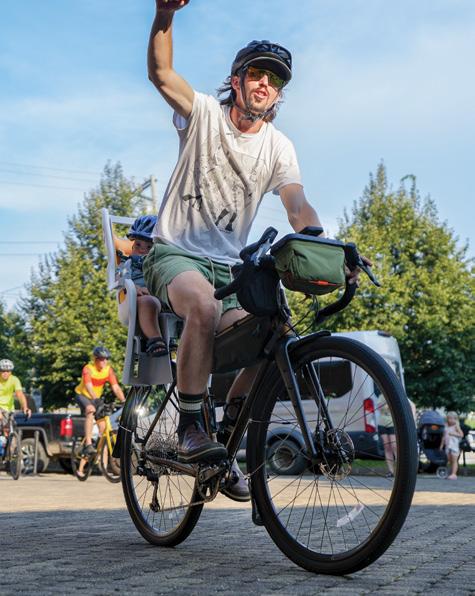
where Bob Dylan debuted his shift to electric guitar in 1965. The response from Newport was immediate, insisting Illiterate Light perform on a full stage using their bicycle-generated energy. Historically a place of open-mindedness and protest, Newport has also been ahead of the curve in discovering new artists, Gorman says.
In July, the band ran its fourth annual, sustainable live show at Newport, in addition to helping the festival curate the artist lineup. Next to the stage, six stationary bicycles and eight solar panels awaited the crowd of 10,000 festivalgoers. “Every time we have a performance, there’s a huge line of people,
ages 6 to 60,” Gorman explained. “And they get on the bikes and they start powering, and that creates a portion of the electricity that we use on the stage, between the bicycles and the solar panels.”
Leading up to the Newport show, they biked the 700-mile journey from Virginia to Rhode Island in 14 days. “What started as a simple idea has continued to grow year after year,” Gorman said.
Illiterate Light’s blueprint for bicycle touring, using little to zero fossil fuels, started small in Harrisonburg. Between 2011 and 2015, they spent several summers in Virginia designing two- to three-week bike tours nicknamed the Petrol-Free Jubilees, building a fan base through their music and advocacy at each stop.
“I don’t think that our system is bulletproof,” Gorman admitted, “and I don’t think every festival in the country is going to start creating bike energy. But I think that people are really inspired by it. They’re really curious.”
In another “truly epic” summer memory, Illiterate Light played some new songs to a packed house at The National in Virginia.
“If we’re able to feed our families, and we’re doing something that, at the end of the night, when I go to bed, I feel like what we’re doing matters,” Gorman said, “that provides the fuel for my entire life force.”
Scan to listen to “Rocking Out With Illiterate Light” on the Being the Change podcast.

By Taylor Moore
When Dr. Shraddha Joshi was trying to attend college in India, she was encouraged by friends to pursue a career in computer science. It’s a more “female-friendly field,” they told her. Instead, Joshi followed her true passion of mechanical engineering.
Now assistant department head of the College of Integrated Science and Engineering and associate professor of engineering, Joshi urges current and future female students pursuing science, technology, engineering and math to be themselves.
“Don’t try to be like somebody else,” she said. “Be your whole, authentic, female, woman self. Because the perspective that you can bring as a woman, males cannot bring. ... Just identify what your strengths and unique positions are, and don’t be afraid to speak up about it.”
Fifth-year student Taylor Kwiatkowski, who is completing a Geo-Environmental Engineering concentration, and junior Abby Straley, who is pursuing a Civil and Environmental Engineering concentration, have also faced adversity in proving themselves in male-dominated fields, but both have excelled at Madison — in part because of the support they’ve received from peers.
“Most of the women in STEM I have met over the years are strong leaders with powerful voices that demand to be heard, but most of us did not start out that way,” Straley said.
“In this engineering program, we do a lot of project-based work. Whenever we picked project teams, I noticed that men usually would pick each other, because they are either closer friends or they assume that other men would be better to work with. This left me feeling like I had to prove myself as a leader and capable student in classroom settings, so I did. Once I was able to prove myself, it became easier to work with the men, and I felt more accepted. But the point is that I should have never had to prove myself in the first place when men never had to.”
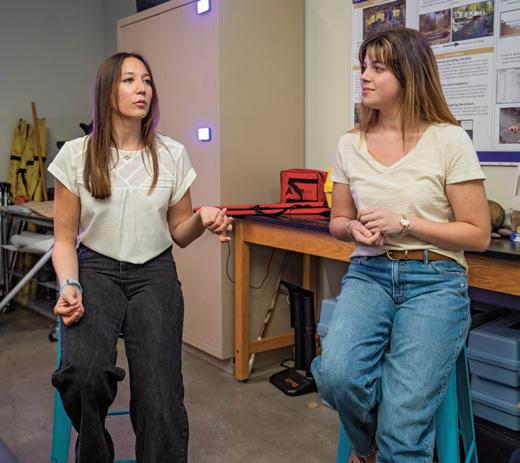
Kwiatkowski was looking for other like-minded women when she attended Student Org Night her freshman year, discovered the JMU chapter of the Society of Women Engineers and decided to join. Now president of the organization, she is furthering its mission to empower women in engineering, helping them succeed and advance themselves professionally.
She has also been completing her Senior Capstone Project, which focuses on stream and river restoration in Harrisonburg. “I’m proud of us as a team to do this type of engineering work for free, essentially to make sure these streams are still healthy for the city,” she said.
Straley is president of the JMU chapter of the American Society of Civil Engineers, which she joined after engineering professor Dr. Daniel Castaneda recognized her interests in civil engineering and introduced her to the club.
Straley and Kwiatkowski recalled their peers impacting and supporting them along their shared journey as women in STEM. “A big part of being able to thrive in a male-dominated field is to build relationships with others around you,” Straley said. “I made it a goal to introduce myself to all of the other women in my classes freshman year so that no one felt alone.”
To help reach the next generation of women in STEM, JMU hosts the annual madiSTEM, a free conference in March for girls in sixth through eighth grade. There, girls participate in hands-on STEM workshops and attend presentations by women in STEM careers.
SWE members also conducted the workshop “What’s Inside?,” which allowed girls to explore with tools and open computers, as well as learn about circuits and different types of engineering.
There are drawbacks to women not being a part of discussions and designs of everyday products, Joshi said. “If you think about the car seats or even car seat belts, table heights, machine setups, they always look like they’re set up specifically for a male person,” she explained. “Bringing in that fresh perspective on thinking about, ‘What might designing for a broader audience look like?’ It’s something important to bring to the table.”
“Be your whole, authentic, female, woman self. Because the perspective that you can bring as a woman, males cannot bring.”
— Dr. Shraddha Joshi
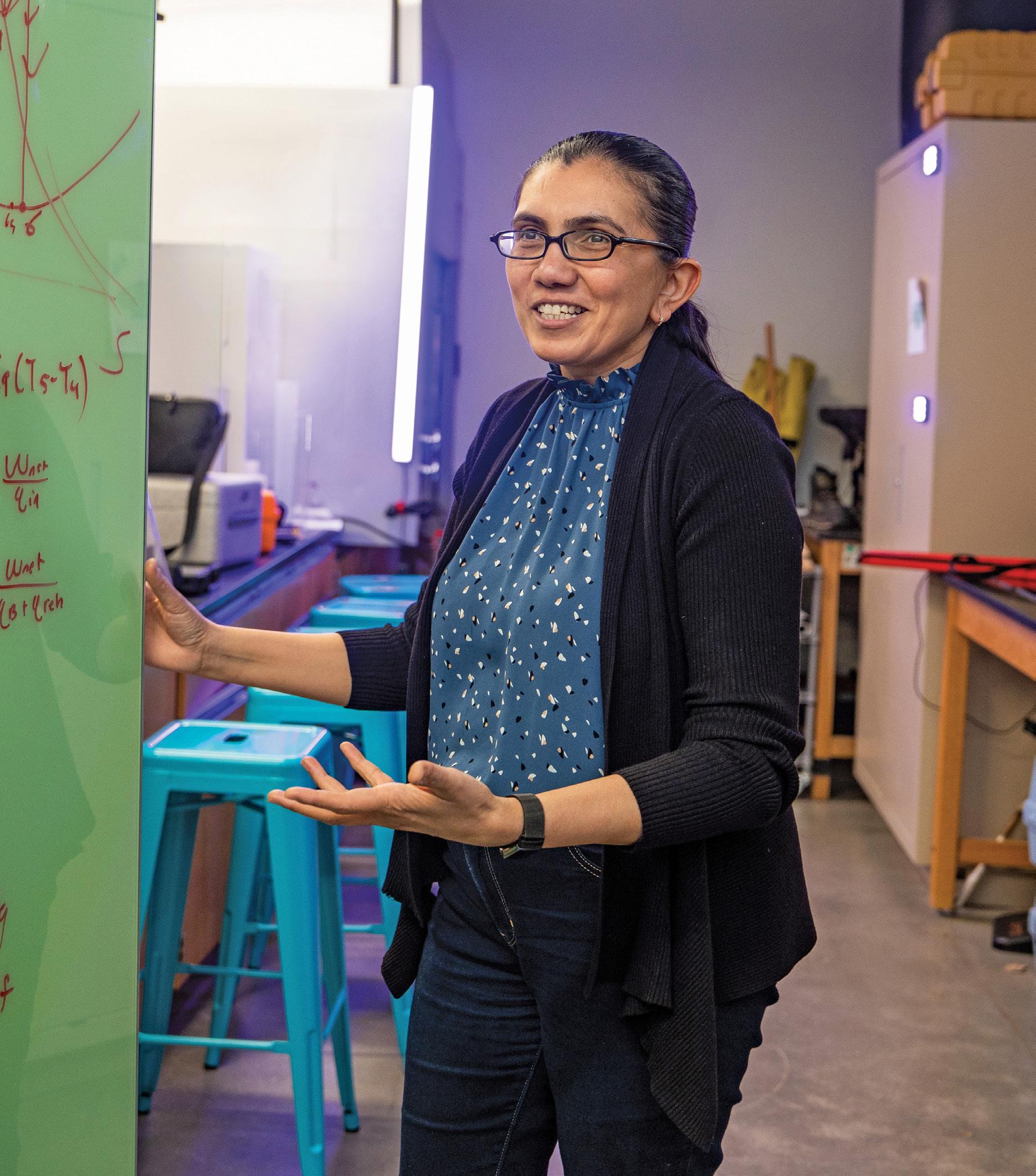
Dr. Shraddah Joshi teaches engineering design, with a research focus on design theory and methodology.
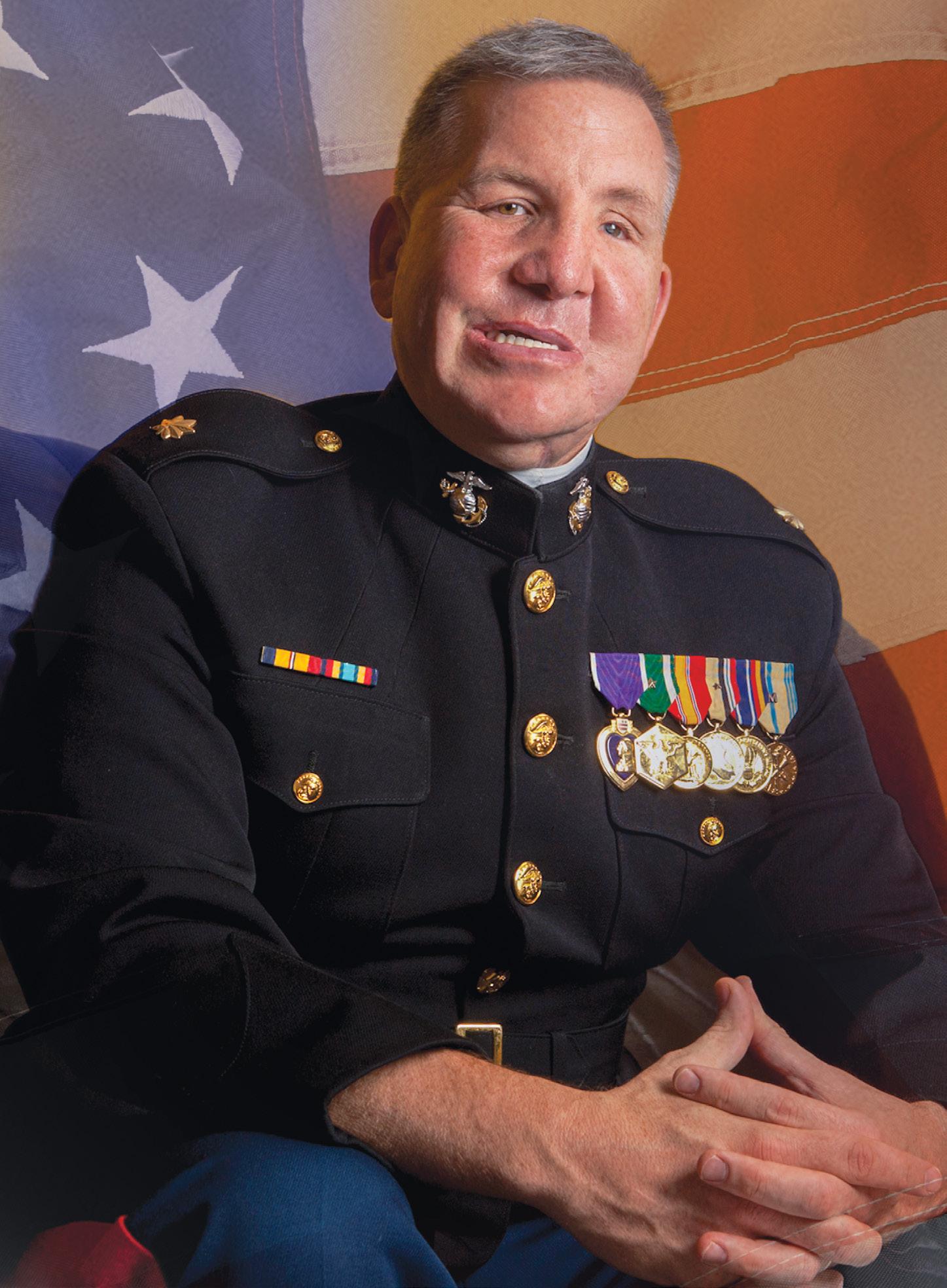
By Ciara Brennan (’17)
The world met Lt. Col. Justin Constantine (’92) after he survived a gunshot to the head while serving in Iraq. But his Madison family knew him long before, as a connector who drew people in with a unique combination of laugh-out-loud candor, grit and dedication to empowering others.
Before he was an American hero, Justin was a boy who rode bikes in his neighborhood. The son of a first-generation Romanian immigrant, he grew up between Europe and Fairfax, Virginia. Friends say he was whip-smart and quick-witted — a competitive diver who voluntarily enrolled in summer school to get ahead in his studies. He was his own person who had his own convictions. And he always had a job.
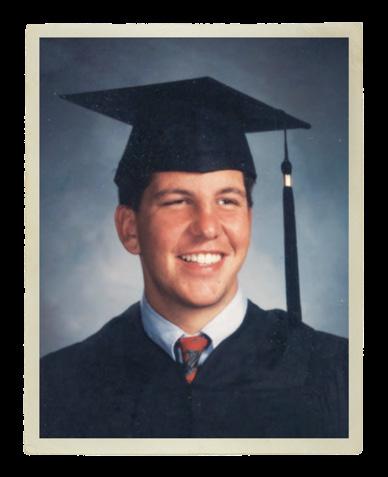
At JMU, Justin was a “Renaissance man” in the making. He studied English and political science, minored in German, and rushed Kappa Sigma. Fraternity brothers say he often made and gifted them mix CDs, which they still have. “Music was something that kept us connected,” said fraternity brother Steve George (’93). “He pushed me into directions and areas that I didn’t have as much exposure to, so I always enjoyed that.”
Justin also played fly-half for JMU rugby, where he met Michael Murphy (’92). “[Fly-half] is a super-important position,” said Murphy, head rugby coach at George Mason University. “But then there can be entire games where your fly-half never makes a tackle.”
This variability created ripe opportunities for ribbing between the two. They often competed to make the other laugh, ramping up the absurdity until one finally broke. “We just clicked in terms of similar personalities and views of the world,” Murphy said.
“I think in the weeks before he died, he made a big-hoss comment,” Murphy said. “Even from his hospital bed, like, ‘Don’t forget — I’m a big hoss.’”
After graduation, Justin lived with his parents, working and continuing to play rugby with Murphy in Northern Virginia. Then he attended law school at the University of Denver. In his second year, he joined the Marine Corps, continuing a proud family legacy. His maternal grandfather served with Sen. Bob Dole in the 10th Mountain Division during World War II, and his father and brother served in the Air Force.
“He just loved that ... He’d say,’I’m a big hoss. You can’t expect me to be coordinated.’”
— Michael Murphy (’92)
One time, a teammate’s father helped coach practice and unwittingly sparked a lifelong joke. Talking through a play, he gestured toward Justin and said, “Then, just pass the ball — you got a big hoss of a fly-half.”
“He just loved that,” Murphy said. “Anything that we could connect … Say, he stumbled over something. He’d say, ‘I’m a big hoss. You can’t expect me to be coordinated.’”
Those six words became a refrain in their 35-year friendship.
(Right): Justin, third from left, and Mike Murphy (’92), fourth from left, at Murphy’s wedding; (below): Justin, left, on a JMU rugby field; (bottom, L-R): Mike, Justin
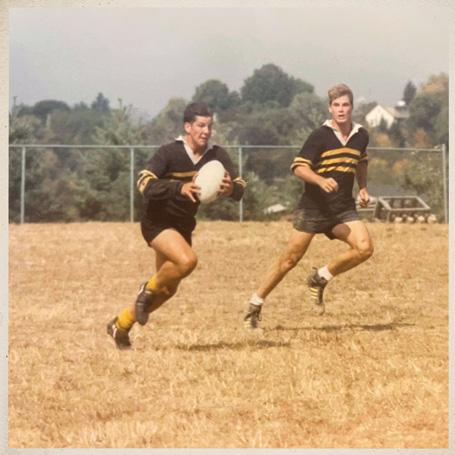
“[Joining the Marine Corps] was a big move, needless to say, but he was excited,” George said, “because he really wanted to accelerate his learning and his experience level now that he had his law degree — to really get trial experience earlier.”
Justin practiced in the Marines as a criminal defense counselor and prosecutor. Then, in the spring of 2006, he took three weeks of leave to attend a Spanish immersion class in Buenos Aires, Argentina. Dahlia Hamza, an Egyptian American educator and children’s book author, had the same idea.
On that day, Dahlia was the only student in class. “And then he walks in,” she said. “And I was like, ‘This guy is going to take over my private lessons.’”
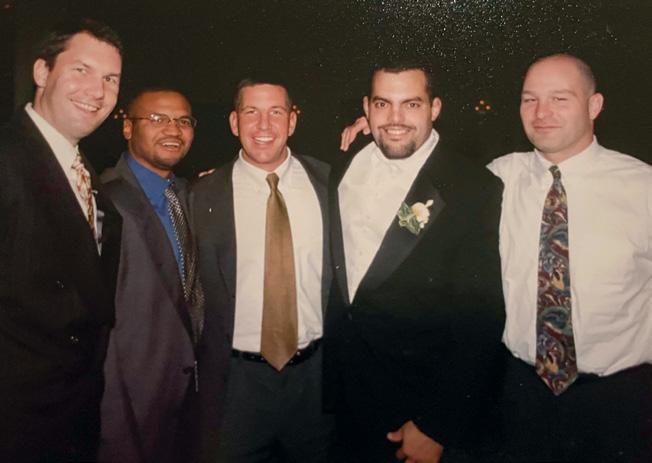
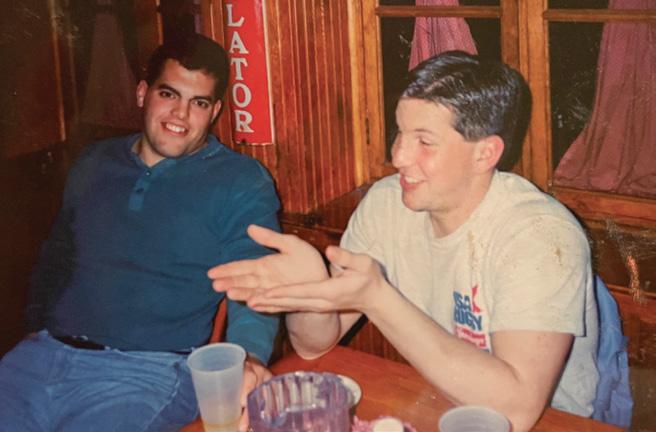
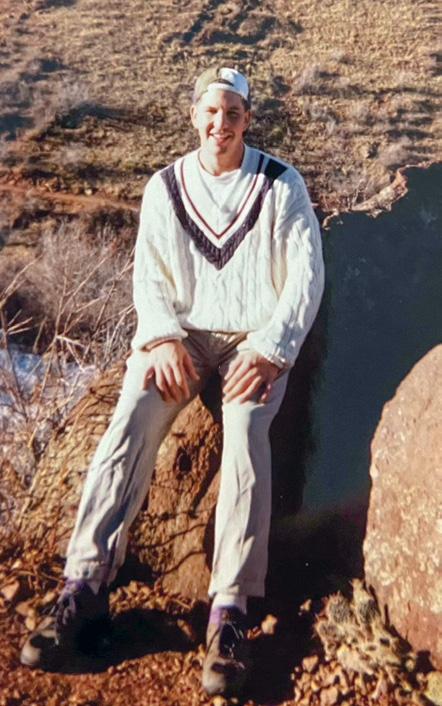
Their first date was at the end of that week — “and I didn’t even know it was a date,” she said. Justin tagged along with Dahlia and some friends who were going to an American sports bar to watch the NCAA basketball tournament. But a mistranslation brought them all to a fancy Italian restaurant instead, with a small, blackand-white TV in the corner. “It was like a movie,” Dahlia said.
Slowly, people from their large group left, until it was only Justin and Dahlia talking for hours. “It was just so instant — like we had just known each other forever,” she said. When Justin returned to the United States three weeks later, their connection was a simple fact. “We just knew we were together.”
In September, Justin deployed to Iraq to serve as a civil affairs team leader, and Dahlia moved to Cambridge, England, to complete her doctoral degree. “We went from vacation romance to long-distance to epic war drama, really, in a matter of months.”
man George Grant is an incredible young man,” Justin said in a TEDx Talk in 2015.
While Justin received rescue breathing and an emergency tracheotomy, Dahlia refreshed her email in Cambridge. “I woke up in the morning, and I was expecting a message from him, and there was nothing,” she said. “I thought, well, maybe the communications are down … but I just had a weird feeling in my stomach.”
She caught a cab to a conference and passed by a cemetery. “Normally, I love cemeteries,” she said. “I just think they’re beautiful places for stories.” But on that day, there was a different feeling. She asked the driver about the gravesite, and he told her it was the American cemetery for World War II.
“We went from vacation romance to long-distance to epic war drama in a matter of months.”
On Oct. 18, 2006, six weeks into his deployment, Justin was leading a small team of Marines and Navy corpsmen on a patrol through an area with a known sniper. A mere second after instructing a reporter to keep moving to minimize risk, Justin was shot in the back of the head.
— Dahlia Constantine
When his body was turned over, the declaration was made that he had been killed in action — but a courageous Navy corpsman decided to act anyway. “Fortunately for me, Corps-
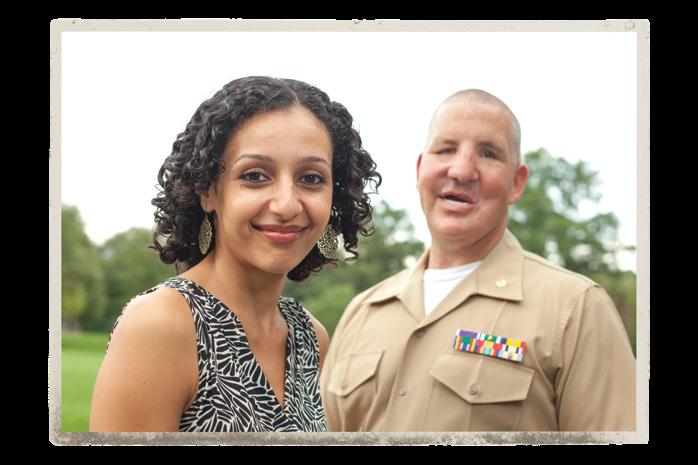
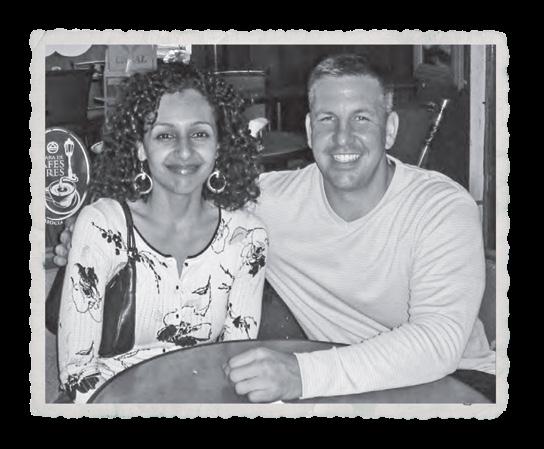
“In that moment, I knew something had happened,” she said.
That night, the email finally arrived from Justin’s mother. The subject line read: “Justin is OK.” Within 48 hours, Dahlia was at his bedside in Landstuhl, Germany. She never left.
In 2008, Justin and Dahlia were married at the Marine Corps museum near Quantico in Virginia, surrounded by family and friends, including the Navy corpsman who saved Justin’s life.
“I’d say ‘impressed’ is the understatement of the day,” George
After Constantine passed in 2022, his wife, Dahlia, created a scholarship for first-generation students at JMU.
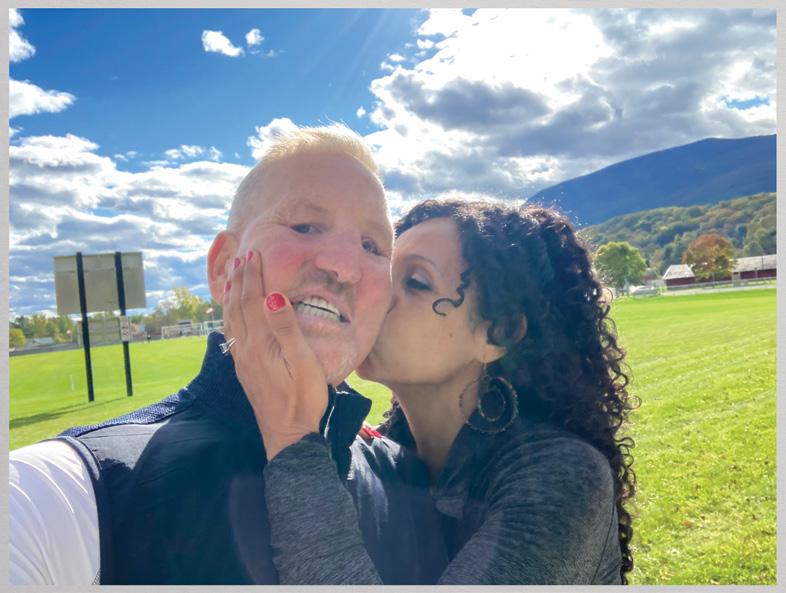

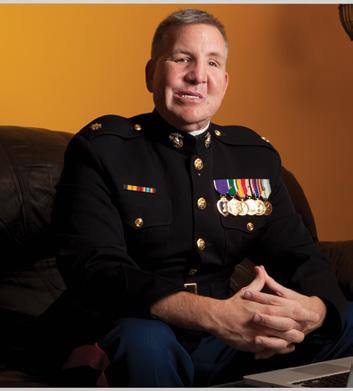
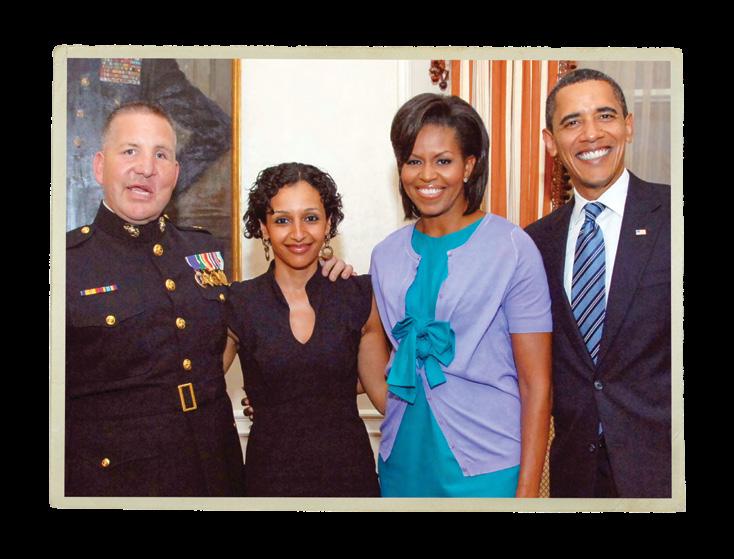
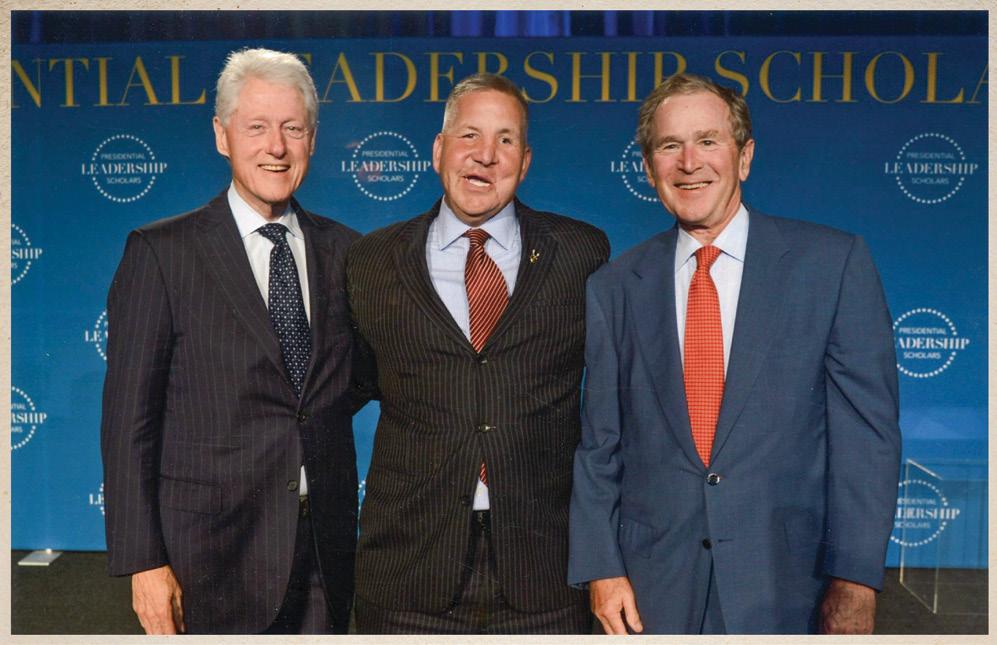
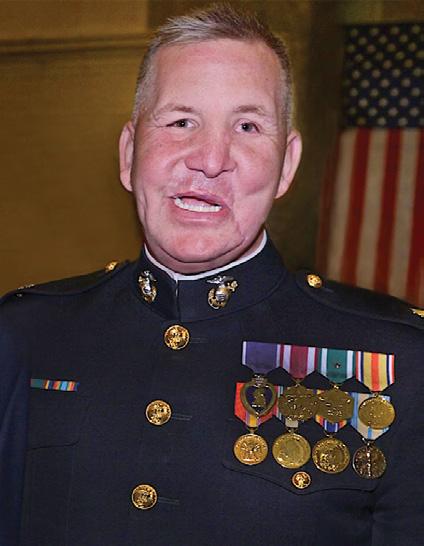
said. “You see the crowd and the folks who are there supporting him — this guy I have known since I was 18 years old — and this is just up until the point where he was getting married.”
Over the next 14 years, Justin’s recovery remained ongoing — and so did his advocacy. He worked with the Department of Justice, served on the U.S. Senate Committee on Veterans’ Affairs, earned a Master of Laws in national security, co-founded a nonprofit, published two books and received numerous honors. He was a Presidential Leadership Scholar, a Champion of Change for Veterans under former President Barack Obama, and one of the wounded warriors painted by former President George W. Bush in Portraits of Courage
He also made sure to keep in touch with friends. “We just had a bond that we created from an undergraduate standpoint,” George said. “It was one of those connections that was a little deeper … and compelled us to put in the effort to stay connected.”
viction. “He would say that he felt so lucky,” Murphy said, “that he was an officer and had family nearby when he went through all this.”
“What I took away from my conversations with Justin was how brave he was, how strong he was, yet still how real he was through the process,” George said.
From Justin’s perspective, his injury didn’t just take — it gave, too. “I’m now far closer with my wife than I would have ever imagined … and I know that I’m far stronger than I would have ever thought possible,” he said. “Now I can put everyday problems in their proper perspective, so I can focus on what’s truly important to Dahlia and me.”
“He would say that he felt so lucky that he was an officer and had a family nearby when he went through all this.”
— Michael Murphy (’92)
From the TEDx stage, Justin described how his injury changed him. “I can’t see out of my left eye. I can’t run anymore … I’m also missing most of my teeth and the end of my tongue. I can’t speak perfectly clearly. I also suffer from posttraumatic stress and a traumatic brain injury. But you know what? I’m the luckiest person you’ll ever meet.”
Friends say it wasn’t a pat statement but a deeply held con-
In 2020, Justin was diagnosed with Stage 4 prostate cancer. His final two years were spent in pursuit of healing. “With every challenge Justin faced, including his last battle with cancer,” Dahlia said, “he seemed to evolve and become more of the person he was always meant to be.”
To support Justin’s cancer treatments, friends from JMU created a GoFundMe which went viral after media personality Eric Sollenberger (’07), known as PFT Commenter, shared it. Overwhelmed by the support of the Madison community,
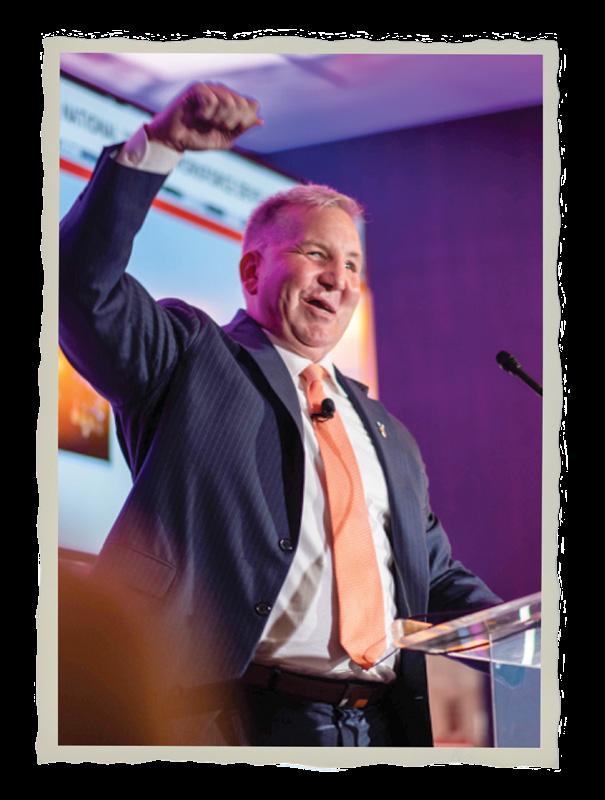
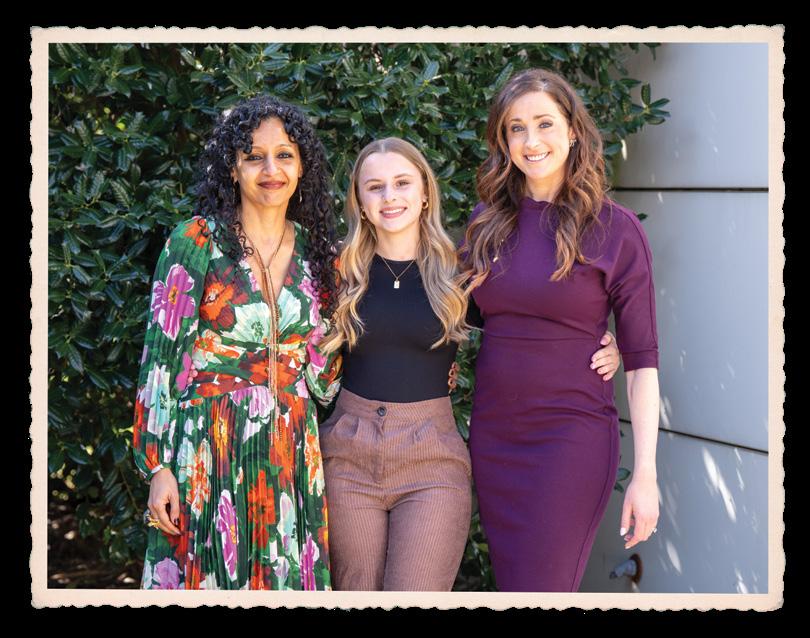
For more on Justin’s impact, listen to this Being the Change podcast episode.
Read about legacy scholarship recipient Samantha Cornell.
his Marine Corps family and even strangers, Justin wrote in March 2022:
“How can I thank so many people at one time? If I could do something larger and grander, I would, but I hope that everyone knows just how appreciative we are of the overwhelming support.”
Two months later, Justin passed away at 52. The nation mourned an American hero, while those closest to him grieved the loss of a devoted husband, brother, son and friend; a decorated Marine; a “Renaissance man;” a maker of mix CDs; and a big hoss of a fly-half.
“I never really thought of, or cared about, Justin as some kind of national hero icon,” Murphy said. “I mean … he was just my friend, Justin.”
With the remaining GoFundMe money, Dahlia turned to JMU. “The fact that it was started by JMU friends meant a lot to me,” she said. “That’s why I wanted the money to go back there.”
(Center, L-R): Dahlia Constantine, Nursing student Samantha Cornell and Lt. Col. Rachel Fletcher (‘05) at the Stewardship Luncheon; (below): Justin was the keynote speaker for the December 2012 commencement.
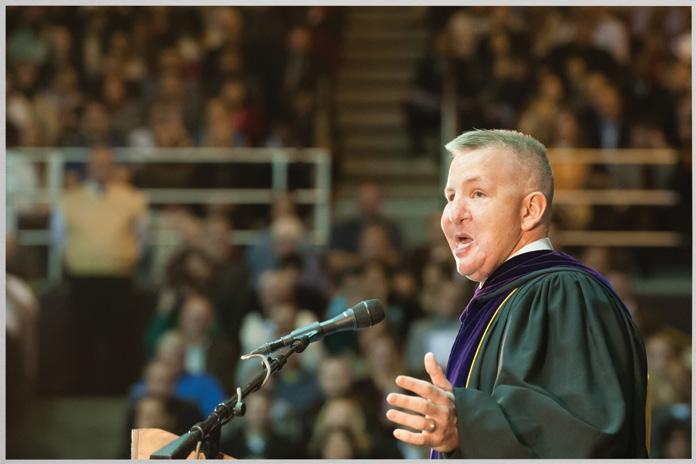
Honors student Samantha Cornell who is working toward a career as a nurse. She and Dahlia met ahead of their presentation at the 34th Annual Stewardship Luncheon in April. They were joined by another key figure in Justin’s story: Rachel Fletcher (’05), the nurse who cared for Justin at the National Naval Medical Center. Fletcher traveled from Iowa to attend and connect with Dahlia and Cornell on campus. “That was Justin’s superpower,” Dahlia said, “to gather people. He was constantly forming new communities.”
“That was Justin’s superpower — to gather people. He was constantly forming new communities.”
— Dahlia Constantine
In 2023, Dahlia created the Lt. Col. Justin Constantine (’92) Scholarship Endowment for First-Generation Students. “I think it was in both of us — the idea of supporting other people — because we recognized how much we were supported,” she said. “And first-gen was a big thing for Justin. His dad is a first-gen college student.”
This past spring, the scholarship was awarded to first-gen
A hero’s journey often follows an individual who withdraws inward to overcome a great challenge. But that is not the story of late American hero Lt. Col. Justin Constantine. He believed — and modeled — that true triumph requires a community of support. “The way he narrated his own story, he was always about the collective around him,” Dahlia said.
In one of his final speeches in 2022, Justin spoke about humanity’s great need for one another. He said: “In America, we have a myth about the self-made person, and it’s often coupled with a rags-to-riches story, where any individual, despite all odds, can achieve dizzying levels of success all on their own.
“I think a much more powerful and impactful philosophy is to surround yourself with good people, who all bring different gifts to the table.”
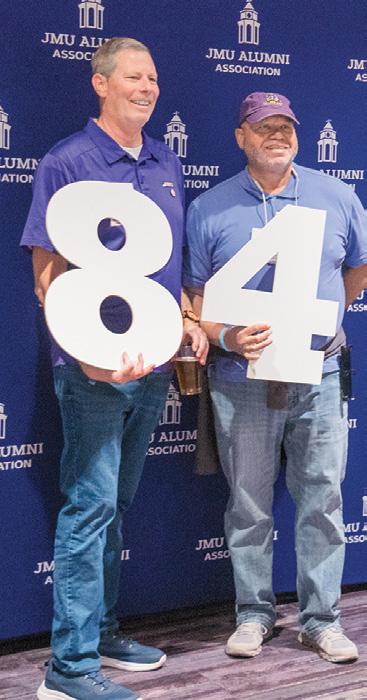


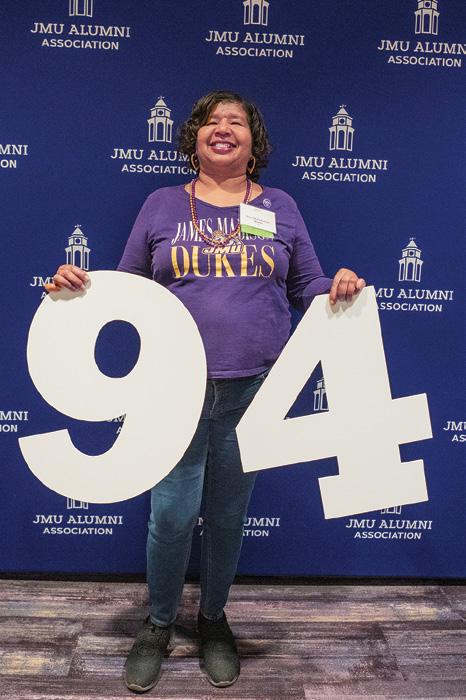
From affinity groups to class milestones, alumni reunions in 2024 and 2025 brought Dukes home and closer than ever.
In the past year, the Office of Alumni Relations made a deliberate push to expand reunion programming, offering more support, structure and opportunities for Dukes to reconnect. From affinity groups to class milestones, the result was a banner year of heartfelt reunions and meaningful moments. With increased alumni engagement and overwhelmingly positive feedback, the expanded approach proved to be a resounding success — and one that will shape future reunion efforts for years to come.
Reunions made easy: Whether you’re planning a casual happy hour, a full weekend of events or something in between, the Alumni office is here to support your vision. From selecting dates to coordinating campus activities, OAR offers a seamless and collaborative planning experience. “We provide support ranging from campus-space reservations and vendor connections to email invitations and registration tools,” said Victoria Beahm, assistant director of alumni relations. “Our team works one on one with
alumni volunteers to shape an experience that reflects their class or group’s unique spirit. It’s your reunion, and we’re here to help you make it memorable.”
Want to help plan a reunion? Every successful JMU reunion starts with one thing: a passionate graduate (or a few!) willing to help make it happen. Your ideas and willingness to connect with your network, combined with our expertise, is what makes for a great reunion.
“The Alumni office was instrumental in orchestrating the logistics and making the event a success,” said Jim Tebbenhoff (’84), a Finance major. “They listened to our ideas and vision and pulled it together beautifully, including an amazing venue. Our job was to rally our fellow alumni, and they did the rest!”
Ready to get started? “It is incredibly fulfilling to see reunion weekends come together and to witness the meaningful connections that unfold as alumni return to campus,” Beahm said. “These gatherings are a powerful reminder of the lifelong bonds formed at JMU.”
Email us at alumni@jmu.edu to learn how you can make a difference with your JMU reunion.
(L-R): Dukes celebrate a 40th, 35th and 30th class reunion during Homecoming 2024.
WHAT WE PROVIDE
n Event-planning assistance
n Custom email invitations and communications
n Support with registration and RSVPs
n Connections to campus venues, vendors and services
n Promotional help through JMU channels
n A direct line to Alumni Re lations
WHAT YOU BRING
n Enthusiasm
n Insight into your class, club or group reunion
n A few hours to help plan and connect with others
n Leadership
n Your network of friends
n Others who may want to help in the planning
Our reunion rekindled memories, sparked new connections and celebrated the JMU spirit that lives on
In this Q&A, Kevin (’98) of Kappa Alpha and Kellie Grunkemeyer (’00) of Alpha Phi share their reunion experience from Spring 2025. What did coming back to JMU mean to you personally? Coming back to JMU felt like coming home. As alumni from the classes of 1998 and 2000, the memories are deep, but what really stood out this time was how alive the campus still feels. For us, it wasn’t just about reconnecting with old friends; it was about seeing how the spirit of JMU continues through today’s students, and getting to share that with our family made it even more special. What would you say to someone who’s thinking about coming back for a future reunion? Come back. Whether it’s been five years or 25, it’s worth it. The weekend will remind you of who you were, connect you with who you are and help you appreciate how far you’ve come — all while being surrounded by the best people you know. Plus, the undergraduates we met were exceptional, sharp, kind and incredibly welcoming. JMU is clearly in great hands.

What was your favorite moment or memory from the weekend? There were so many! From the Kappa Alpha 30-Year Reunion Golf Tournament to the Alpha Phi open house and Greek Sing, the weekend was full of great energy. A highlight for both of us was seeing our daughter, Kennedy, and her friend, Brooke, experience campus life for the first time, including their first trip to D-Hall and first fraternity party. But also, seeing more than 500 people participate at various events throughout the weekend was truly incredible. The turnout and excitement were far beyond what we imagined. Why did you decide to help plan your reunion, and what advice would you give someone who is thinking about organizing a reunion? We helped plan because these organizations and this school have given us so much,
and bringing people back together felt like a meaningful way to give back. With more than 190 KA alumni and 150 Alpha Phi alumni registered, we knew there was a desire to reconnect. Our advice? Don’t overthink it. Start early, delegate when you can, and just focus on making it easy for people to say yes. The enthusiasm builds naturally once you get it rolling.
How did the Office of Alumni Relations support you in planning or enjoying your reunion?
The Alumni office was an outstanding partner. It helped with contact lists, outreach, planning and logistics; provided tools for communication and registration; and checked in regularly to offer support. Its work made everything smoother and gave us the structure we needed to focus on the fun parts of planning and just enjoying the weekend.
(Clockwise from left): Dukettes Alumni Chapter members gathered before a performance at a women’s basketball game in January; dozens of Kappa Alphas celebrated their 30th Reunion at Alpine Goat; alumni spanning five decades came together for the men’s rugby 50th anniversary in October 2024, including John Jornlin (’23) and his father, original rugby team member Phil Jornlin (’75, ’76M); Sigma Kappa sisters celebrated a special weekend in November 2024 to mark 65 years at JMU and 150 years as a sorority.

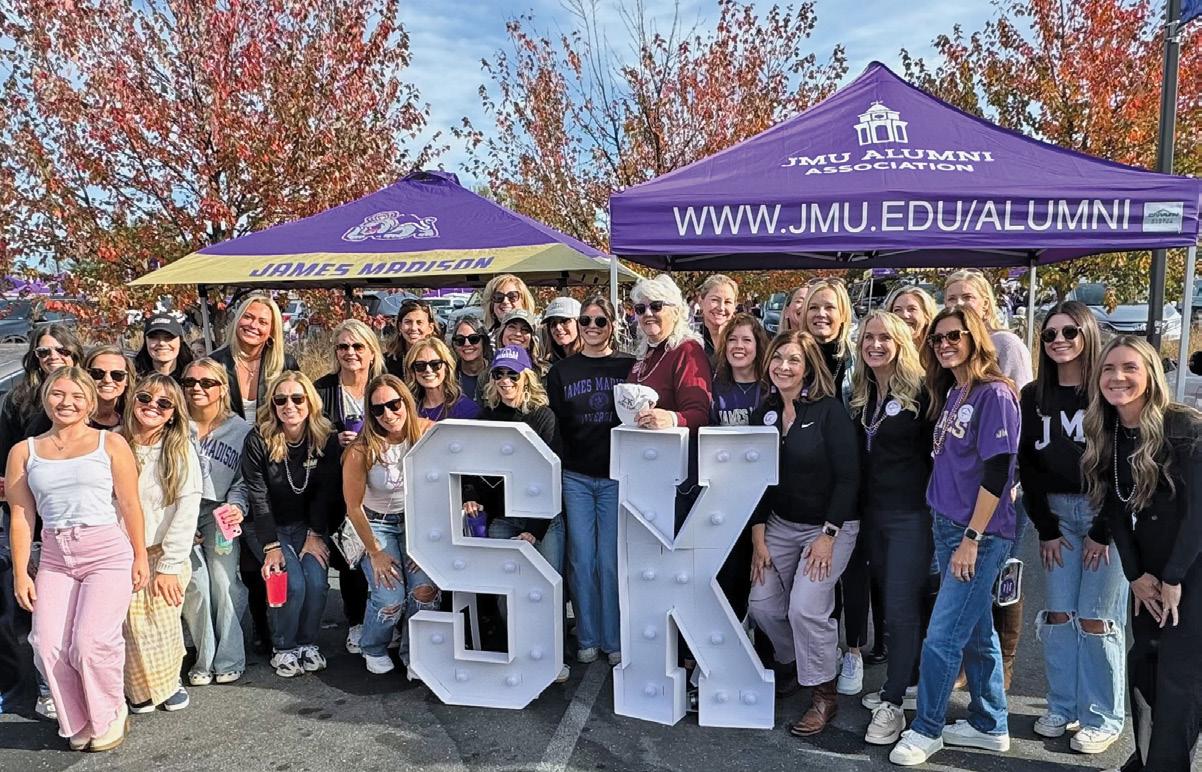
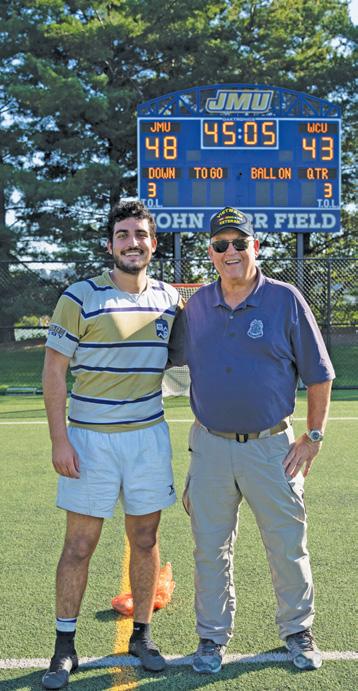

BY JOSETTE KEELOR
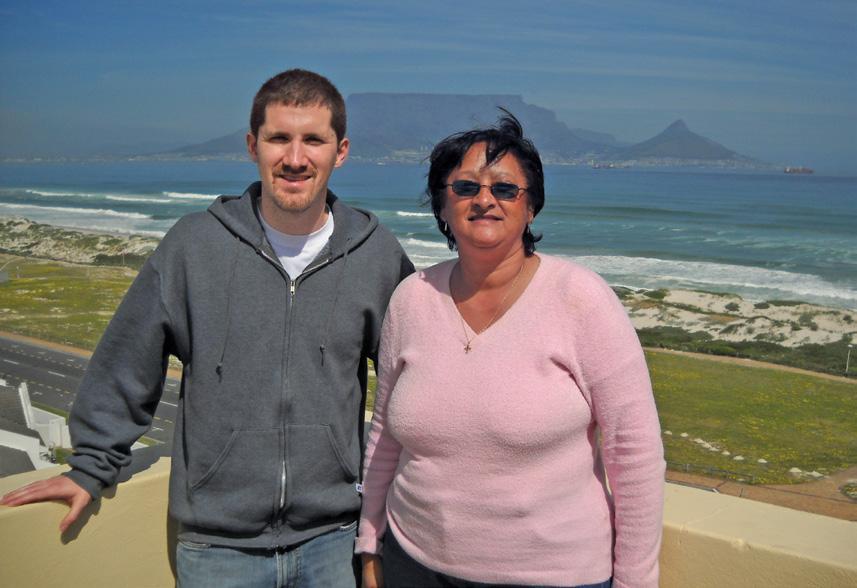
In 2008, Harrisonburg resident Marcus O’Malley (’04) traveled to South Africa on a one-way ticket. Hoping to make a difference in the lives of one, maybe two, people, he flew to Cape Town, where he planned to stay for two weeks before heading to Durban on the opposite coast.
He never made it to Durban due to a sudden influx of refugees from Zimbabwe to South Africa’s east coast that limited housing availability.
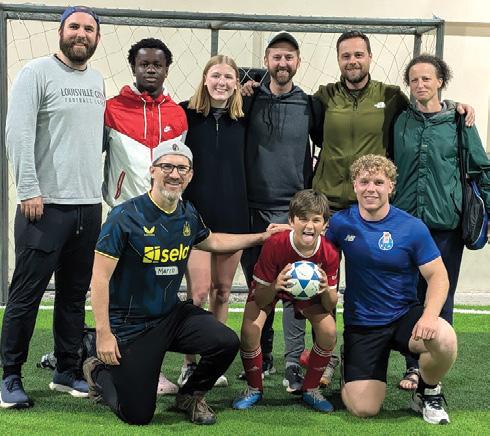
(Top, L-R): Table Mountain and Cape Town's coast frame Marcus O’Malley (’04) and tour guide Ursula Arendse in 2008; O’Malley greets a South African elephant. (Inset): O’Malley (kneeling, front left) and his son (holding a ball) join soccer clinic participants during the summer in Ecuador.
It was this experience that inspired his 2020 Christian fiction novel, Reunited, about three friends who travel to South Africa to honor a fourth friend. It was also there that O’Malley made some lifelong connections. “It was unbelievable,” he said. “I mean, I was only planning to be there two weeks.”
Through his church, he had arranged to spend that fortnight with Ursula Arendse, a tour guide with a son O’Malley’s age. When his living arrangements on the east coast became uncertain, she invited him to stay as long as he needed. Ultimately, he remained her guest for a year.
“We’ve stayed in touch over the years,” O’Malley said. “I was in Ireland last year. Her son has moved there, so we met up and surprised her on a video call. … Her son was like, ‘Hey, I got a surprise for you. I got a visitor from America.’”
O’Malley first felt called to South Africa in 2007 after attending a speech at JMU by 1984 Nobel Peace Prize winner and Anglican
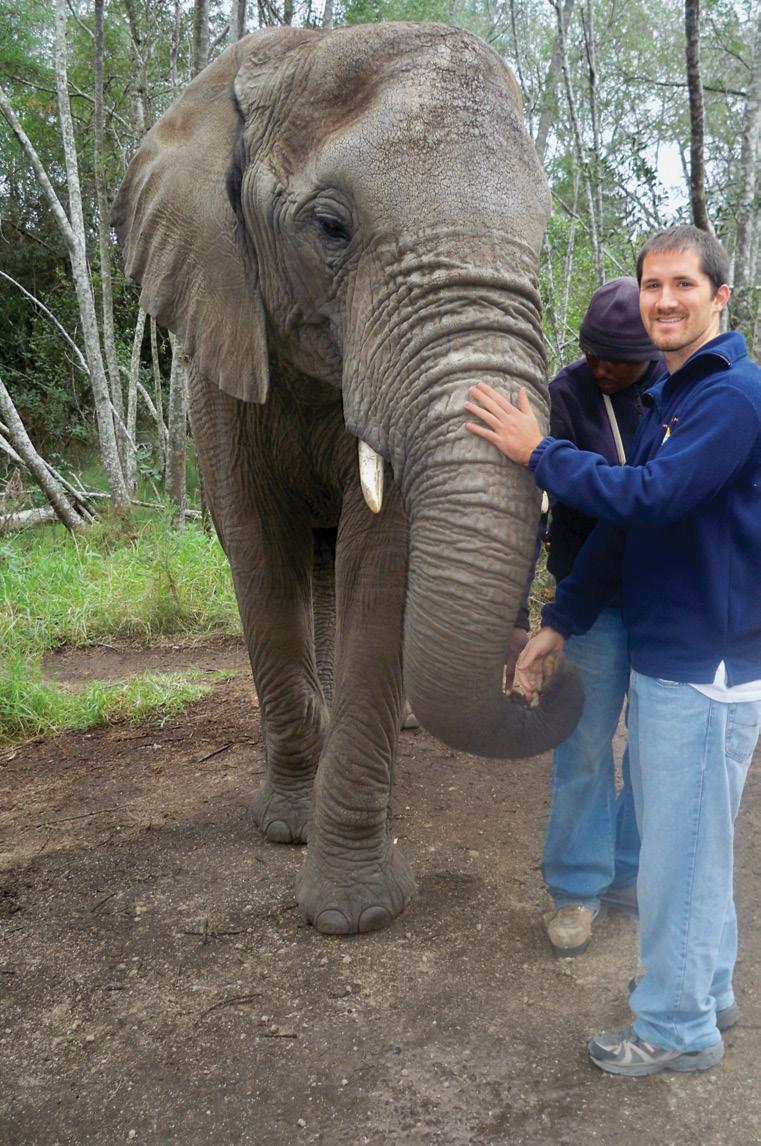
Scan the QR code to read more about Marcus O’Malley (’04)
Archbishop Emeritus of Cape Town, South Africa, the Rev. Desmond Tutu — who was visiting Madison on International Day of Peace to share his message “Goodness Is Powerful” and to receive the inaugural Mahatma Gandhi Global Nonviolence Award from JMU’s Gandhi Center for Global Nonviolence.
After hearing Tutu share that about 60% of South African heads of household were age 16 or younger — because of the impact of HIV/AIDS and rampant drug use in their families — O’Malley wanted to help. “That comment really struck me,” he said. “So many Americans want to give stuff — clothes, money. And [Tutu] said, ‘That’s great, and I appreciate it. But what South Africa really needs is leaders — adults speaking into young people’s lives.’”
Deciding he would take a year to try to help, O’Malley made his plan to go to South Africa that September. He sold his belongings,
and the Church of the Nazarene helped him line up volunteer work and a place to live.
During his first three months, he was planning to update technology for an organization in Durban. Instead, he spent a year helping Arendse and others with entrepreneurial work like designing business cards, building websites and setting up social media for their businesses.
He also volunteered at orphanages in and around Cape Town, organized a youth soccer program and a weekly youth group, raised funding from friends and family back home, and otherwise lent a hand in an impoverished community that relied on the aid of people like O’Malley who came there to help.
After returning home, O’Malley visited again in 2010 and 2014, and he’s stayed in touch with Cape Town residents through social media and video calls. Arendse, especially, has remained a good friend, and he recalled how she phoned to check on his ailing mother before her death in 2023.
O’Malley continues to see the world, having traveled with his wife, Sarah, to Kenya, Malawi, Zambia and the northern Iraqi region of Kurdistan, in addition to Ireland in 2024.
Now living in Louisville, Kentucky, with his wife and three children, O’Malley has raised funds to build a local soccer pitch at Antioch Church, where he is pastor for a soccer program for refugees from various countries. He and his wife are owners and directors of the Northern Kentucky location of Caring Excellence personalized home care services, alongside his motherin-law and brother-in-law, who respectively run the Louisville and Lexington, Kentucky, locations. O’Malley also helps with a food pantry and a community garden.
Over the summer, O’Malley led soccer clinics in Ecuador with a group from Antioch Church. This fall, he wants to start a soccer league of up to 10 multi-ethnic teams around Louisville.
Looking back, O’Malley says his year in South Africa granted him perspective on other challenges he encounters.
“It really has empowered me to look through the lens of life exceptionally different,” he said. “There are probably many regrets in life. That year will never be one of them. It’s absolutely shaped and changed my life, and hopefully the lives of some of those folks over there as well.”
Almost two years into my position as executive director of the JMU Alumni Association and director of the Office of Alumni Relations, I can easily say that working with our volunteers is a highlight of the job. JMU alumni are passionate, creative and hardworking, and when they are volunteering for JMU, they are focused on extending the Madison Experience out into the world. While I could effortlessly talk about the accomplishments of all our volunteers, I will shine a light on a few.

Richmond Alumni Chapter: In the spring, we put out a call for volunteers to lead the RVA alumni chapter, and area Dukes responded with excitement. Albert Kotchish (’13) stepped up to be president of the chapter, and he and a team of alumni started strong, hosting Richmond Crabfest, supporting the Coaches Caravan and planning watch parties this fall.
Federal Dukes: Led by Ann-Marie Johnson (’87) and a team of dedicated alumni, the Federal Dukes offered webinars this past spring on federal contracting and partnered with the University Career Center on a webinar aimed at students thinking about joining the federal workforce. Executive member Lisa Mundt (’13) expanded on the Federal Dukes’ mission by partnering her company, The Pulse of GovCon, with JMU’s School of Professional and Continuing Education to offer The Federal Government Contract certificate.
Black Alumni Chapter: Whether it’s at a virtual town hall, on their Instagram page or in person, the members of the Black Alumni Chapter show up strong year after year. John Mitchell (’93) and his team create great events on and off campus for alumni to network, connect and support JMU through their scholarship fund.
MRD Alumni: At the end of each football season, Dan Everard (’89) presents graduating MRDs with a pin and a charge to get involved as a Duke. MRD Alumni are active fundraisers and active in their Facebook group.
Highlighting four groups doesn’t come close to covering all the great alumni activity across the world. Driving this ship are the 24 directors of the JMUAA Board of Directors. Led by president Ellen Hineman (’89), the directors commit their time, talent and treasure to lead the association. This past year, they focused on strategic planning, mentorship, chapter governance and renewed connection to past board members. They also individually and collectively supported a board challenge for Giving Day. We welcomed four new members to the board for a threeyear term starting July 1 (see Page 52).
Finally, a shout-out to the staff in the Alumni office. We recently started a new fiscal year with a look back at all we accomplished in the prior year. I’m proud not only of the volume of events and communication this team produces, but also the attitude with which it is accomplished. Our team is passionate about making your alumni experience the best it can be. Reach out to alumni@jmu.edu, and let us know how you would like to be involved!
— Paula Polglase
(’92, ’96M),
executive director, JMU Alumni Association
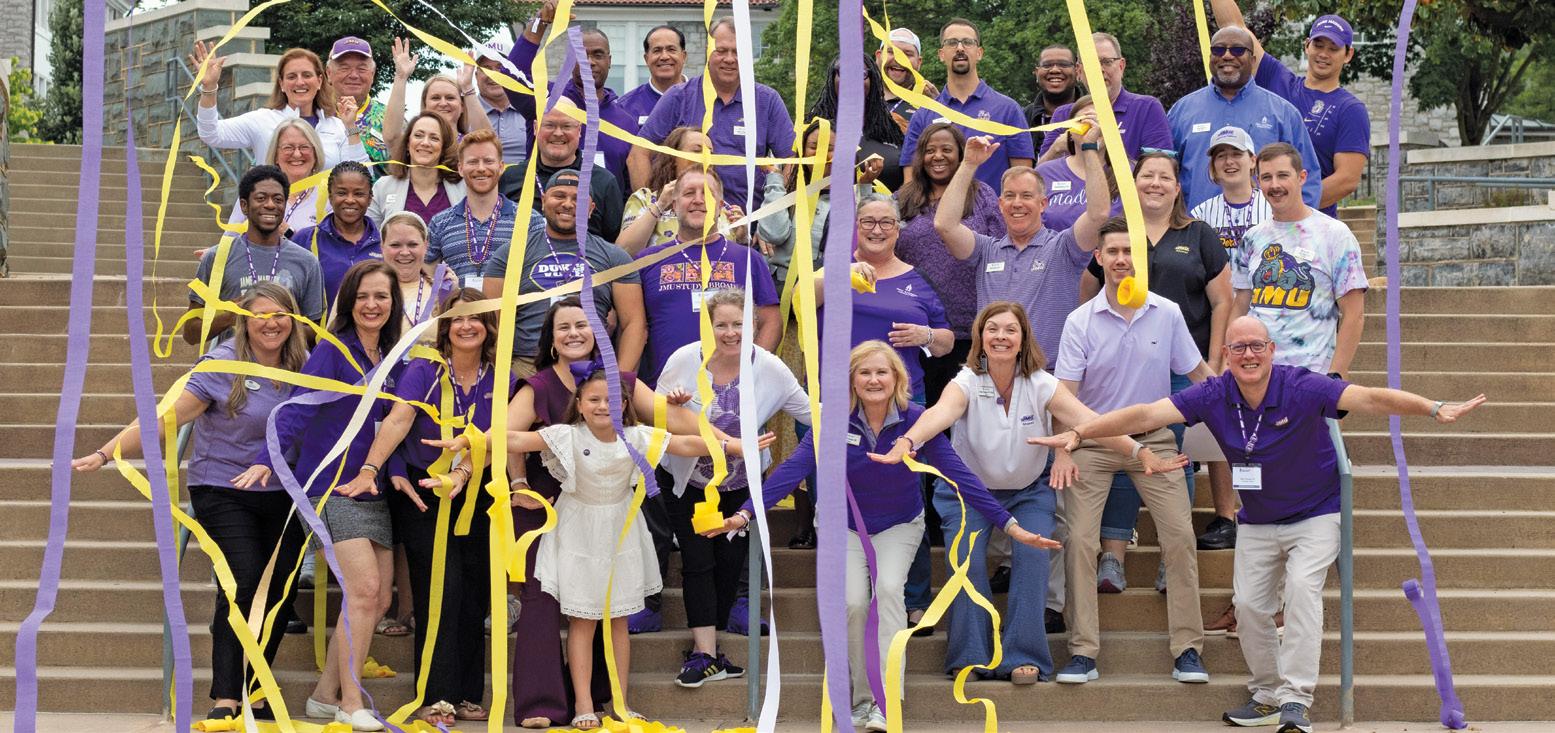
The Madison Alumni Conference once again convened on campus June 13-14, bringing together alumni chapter volunteers and members of the JMU Alumni Association Board of Directors. The weekend is a time to celebrate volunteers, learn from JMU administrators and network with fellow alumni. The weekend started with a JMU Favorites dinner and chef demonstration at the Leeolou Alumni Center. This was also a time to recognize three outgoing board members for their years of service to the Alumni Board.
Nick Langridge (’00, ’07M, ’14PhD) welcomed alumni, saying they are JMU’s best ambassadors out in the world. From updates about Madison to chapter-specific event discussions, Saturday offered
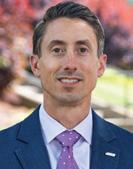
a full day of learning for volunteers. Craig Short, associate vice president of finance and administration, presented on the proposed draft of the 2027-37 Master Plan. Erin Correa (’02, ’04M) presented the keynote address, “Building Buzz, Bonding and Belonging in your Alumni Chapter.” She also led a Stoplight Assessment and activities called Opening Doors and Alumni Personas.
Afternoon breakout sessions included a presentation by Jamie Prince (’22), co-leader of the DFW Chapter, who talked about leveraging LinkedIn; Cannie Graham (’95, ’20M, ’25Ph.D.), speaking about volunteer leadership; and Lorin Phillips (’02, ’07M) sharing crowdsourcing tips. The alums finished the night at Ruby’s Arcade with a toast and bonding time.
Jim Cox (’05) graduated with a Bachelor of Science in Public Administration before heading to Navy Officer Candidate School in 2009 and earning his wings in 2011.
After a career serving in the Navy, including as a prestigious Blue Angel pilot, he recently retired from the military and transitioned to flying for United Airlines. Cox and his family live in Virginia Beach, Virginia.
“My desire to serve has always been a driving force in my life. With fewer commitments on the military side now, I have the time and energy to give back to the place that shaped so much of who I am.”
Rob Jones (’95), who earned a Bachelor of Business Administration in Accounting, is senior director of customer success for SAP. He and his wife, Ann
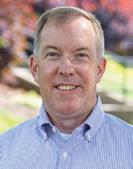
(’96), live in Clifton, Virginia. They are frequently on campus for football and basketball games and stay close with their Delta Sigma Pi fraternity brothers.
“As a parent who raised college students, I deeply understand the family nature of the university. I am passionate about reconnecting alumni from all decades with JMU through engagement with the Alumni Association.”
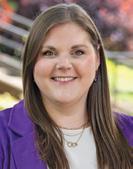
Kelsey Mohring (’12) graduated with a Bachelor of Arts in Communication Studies. She began her career in consumer public relations but eventually found her niche in health care, higher education and nonprofit work. Mohring lives in Norfolk, Virginia, where she
is senior director of resource development at Habitat for Humanity International.
“JMU attracts people who are serviceoriented and interested in making an impact, which cultivates a sense of kindness from the student body. It does a great job at being a big school that feels small.”

Maureen Walsh (’91), who majored in History and Art History, went on to earn her law degree from Georgetown University Law Center in 2007. She owns a lobbying firm, SMART Policy Group, in Arlington, Virginia, specializing in environmental and government affairs.
“My experience with JMU was overwhelmingly positive. It has been an honor to not only be engaged with the university, but to also serve the university and give back in a way that feels more impactful.”
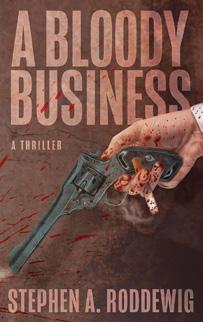
BY STEPHEN A. RODDEWIG (’17)
Independently published
ISBN-13: 979-8872599777
Martin Williams has been lucky so far. A former street thug turned high-end hitman, he has navigated the first half of the 20th century and remained unscathed no matter what historymaking calamity he encounters. But as Martin finds himself increasingly in the crosshairs of rival practitioners and starts eyeing retirement, he fears his good fortune is about to end. If he waits too long, someone could take him out first; but if he retires now, he risks the wrath of his employers who won’t want to lose their best operative.
This unique, action-packed premise features a protagonist like James Bond — only working for the underworld. Martin is skilled enough to survive multiple wars and disasters, and he’s ready with enough jokes to keep readers on his side despite his less-thansavory assignments.
Author Stephen Roddewig is currently writing a three-novel series called the Dick Winchester Adventures, which continues to explore the intersection of action and comedy.

BY JENNIFER JABALEY (’95)
Lake Union Publishing ISBN-13: 978-1662527791
Valerie Yarnell is a hardworking single mother who’d do anything for her daughter, Kate, a dancer with dreams of stardom, just like her talented best friend, Colette. Despite Valerie’s sacrifices, it’s Colette’s mother, former prima ballerina Elise, whom Kate adores. And Colette has become the practically perfect sister Kate never had. How can Valerie not feel frustrated, ineffectual and a little jealous of the queen bee of dance moms? Not only has she hijacked her daughter, but Elise is married to the man Valerie pines for.
Rivalries are forming, and tension is mounting. In preparation for an elite dance competition, Kate outshines the more promising Colette onstage, and the pressure is on Colette to keep her position in the spotlight ― and especially keep her demanding mother happy. Who could have foreseen the violent attack that sabotages everything? Anyone who’s been watching closely.
As ruthless and sinister ambitions are exposed, a media firestorm and an explosive town scandal erupt. Before it’s over, two mothers and two daughters will learn just how fierce and dangerous a rivalry can get.
Jennifer Jabaley, who majored in Chemistry, is the award-winning author of Lipstick Apology and Crush Control. She won Georgia Author of the Year in the Young Adult category and was nominated for the Pennsylvania Young Reader’s Choice Award. She is also an optom etrist, bringing sharp focus to eye care by day and storytelling by night. She lives in the north Georgia mountains with her sports- obsessed family and two rescue dogs.
BY AMANDA HADDAWAY (’99)
Self-published
ISBN-13: 979-8991063807

In this heartwarming story, a young girl named Kate discovers that her grandma was a spy and used her baking skills to hide secret messages. Through baking pies together, Kate learns about her grandma’s exciting past and the importance of bravery, creativity and love for family.
The Pie Spy is Amanda Haddaway’s first children’s book, which launched as the No. 1 new release in its category on the first day of sales.

BY ROBERT KRUT (’95)
Codhill/SUNY Press
ISBN-13: 978-1949933314
An increasingly untethered world gives way to the limbo between lives and raises a glass to the ones beyond in this fifth collection from an award-winning poet. In Oh Oblivion, Robert Krut presents poems written from the island between lives. They look out on a world disappearing, from the surreality of a city where a cardboard box containing a human heart awaits discovery (“Nocturnal Cartography”) to a country where gasping birds cough up coins in a now-drained lake (“The Loons”). While current life is keenly observed, the poems turn to what lies ahead, investigating the narratives that are yet to take place, where simple earnest gestures linger (“An Offering Is Infinite”) and “the ghosts of the future” turn to the comfort of a resetting solar system (“Oh Amnesia”). Standing in the space between worlds, the poems take a hard-earned stock of where we are, but make a toast as we step forward on uncertain and unseen ground.
A graduate in English and Education, Krut is also the author of Watch Me Trick Ghosts, The Now Dark Sky, Setting Us All on Fire, This Is the Ocean and The Spider Sermons. He teaches at the University of California, Santa Barbara in the Writing Program and College of Creative Studies.
BY JOHN DINSMORE (’94)
Emerald Publishing Limited
ISBN-13: 978-1836626015
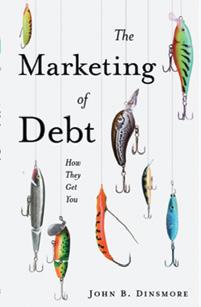
Why do people struggle so much with debt? The truth is, we are psychologically pre-disposed to misunderstanding it. We underestimate the cost of debt and overestimate our ability to pay. Not only do marketers of credit cards and loans know this, but they also exploit these psychological blind spots to get us deeper in hock.
The Marketing of Debt, by John Dinsmore, a Bachelor of Arts in History and Political Science, offers an irreverent look at the financial services industry and the psychological research on decision-making related to debt. Topics include resisting temptation and refocusing on long-term goals, how money lenders hide pricing, partitioned pricing, drip pricing, the issues with status-branded credit cards, and taking scientifically proven steps to make better financial decisions.
Featuring a foreword from Economics major and CEO Jason Harris (’93) of the advertising firm Mekanism, this book is for anyone who wants to understand common tactics that marketers of debt use to get people into deeper debt and how to avoid the traps laid by lenders.
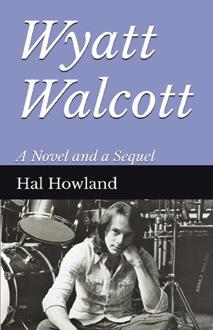
BY HAL HOWLAND (’73)
Independently published
ISBN-13: 979-8684507168
Hal Howland’s most personal book to date, Wyatt Walcott tells the funny and moving story of a worldly, obsessive American writer-musician coming to terms with his dysfunctional family, his regrettable past, his pandemic present and his uncertain future. Anyone born in the 20th century will relate to this heartfelt, time-traveling tale of an artist’s struggle to survive in a society bent on selfdestruction.
BY HAL HOWLAND (’73)
Independently published
ISBN-13: 979-8689425610

Hal Howland’s respected memoir, The Human Drummer, which studio great Hal Blaine said “should be in every musician’s library” and manufacturer Bill Ludwig Jr. called “truly a masterpiece,” has earned praise from major recording artists, symphonic musicians and music-industry leaders. The book contains in-depth interviews with The Doors’ John Densmore and The Moody Blues’ Graeme Edge (in the first of which a notorious Ringo Starr rumor is laid to rest); musical and social commentary; advice for students, parents and professionals; musical memories of America, Europe, and the Middle East, and a colorful career in pop, jazz and classical music; esoteric information for percussionists; groundbreaking timpani research; a professional directory; a satirical glossary; a comprehensive bibliography; and an index.

BY THEODORE GOSHORN (’09)
Advocate Press | ISBN-13: 978-1966237051
What do we do when suffering seems to grab onto us and not let go? We might know in our heads the pain will not last forever, but our hearts and souls have yet to realize this truth.
In Raise Your Ebenezer, Dr. Ted Goshorn offers a deeply personal field guide to suffering that arose from his own wilderness of physical, emotional and financial despair. In Hebrew, the word ebenezer means “stone of help,” and that’s exactly what this book is meant to do — help readers craft their own unique pathway to hope in the midst of difficulty.
A practical, spiritual handbook, every chapter contains a space for readers to log their own “field note” to reflect and better understand how to trust God, make sense of the valley of suffering, survive in this wilderness, and ultimately turn toward a future rooted in joy.

BY VIRGINIA EVANS (’08)
Crown | ISBN-13: 978-0593798430
Sybil Van Antwerp has, throughout her life, used letters to make sense of the world and her place in it. Most mornings, around half past 10, Sybil sits down to write letters — to her brother, to her best friend, to Joan Didion and Larry McMurtry to tell them what she thinks of their latest books, or to the president of the university who will not let her audit a class she desperately wants to take. She also often writes to another person, but she never sends that letter.
Sybil expects her world to go on as it always has as a mother, grandmother, wife, divorcee and distinguished lawyer. She has lived a very full life. But when letters from someone in her past force her to examine one of the most painful periods of her life, she realizes the letter she has been writing for years needs to be read and that she cannot move forward until she finds it in her heart to offer forgiveness.
Filled with knowledge that only comes from a life fully lived, The Correspondent, by Virginia Evans, who majored in English, is a gem of a novel about the power of finding solace in literature and connection with people we might never meet in person. It is about the hubris of youth and the wisdom of old age, and the mistakes and acts of kindness that occur during a lifetime. Sybil’s life of letters might be “a very small thing,” but she also might be one of the most memorable characters you will ever read.
BY ARADOM IYOB (’26P)
Xlibris | ISBN-13: 979-8369438664

Giulio Cesare Croce’s Le Sottilissime Astuzie di Bertoldo, or The Extremely Subtle Tricks of Bertoldo, is a humorous work of fiction written in 1609. This translation of a long-forgotten Italian gem from the early modern period captures the story of Bertoldo, a farmer compelled to leave his family to seek better fortune in, of all places, the court of King Alboin, a fictional royal presumably in what is now northern Italy.
From the beginning, the tension between the two is palpable. Verbal jabs and numerous rejoinders between the farmer and the king spark flames. Bertoldo — whose intellect is impressive and communication skills outstanding — consistently outperforms King Alboin, causing dents to his royal highness’ pride. To the king, however, the multiple interactions with Bertoldo make the farmer’s talent evident, and this is something the king is prepared to fully exploit. Bertoldo, a displaced peasant, helps the king resolve complicated issues that come before his court. For instance, by deploying a trick, he undermines a request from the well-to-do women of the court for political participation commensurate with the men’s. This infuriates the queen, setting Bertoldo on the run for his life. He uses many tricks to ingratiate himself to the king, impress him, solve the king’s court challenges and, most importantly, attempt to stay alive.
Marinated in much humor, this thought-provoking story touches on issues of justice, equality, fairness and ethics. Bertoldo is an unattractive and marginalized trickster, but his antics provide much reading pleasure. Will Bertoldo survive the fury of the queen, and will the king abandon him? Find out in this entertaining gem of old.
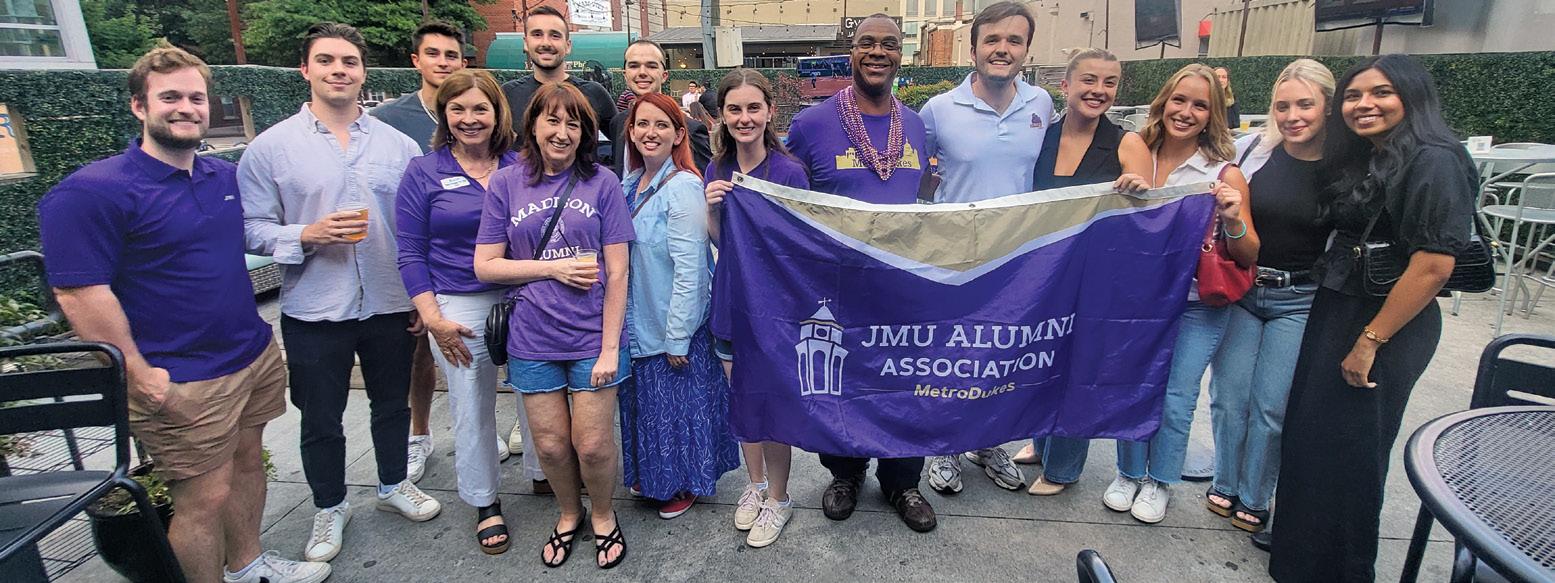
This year, the MetroDukes alumni chapter expanded its Welcome to the Area events to multiple locations. These come-all events were promoted to alumni new to the area or just new to MetroDukes events. “We want to let alumni know we are here and that we are a resource for them if needed, whether that takes the form of networking opportunities, community service or a high-five at a watch party, we got you covered!” said Ronald Black (’06), president of the chapter.
Black and the MetroDukes leadership team picked regular gathering places around the area: Pike Cornerstone and Spider Kelly’s in Arlington, Chadwicks Old Town in Alexandria, and Lark Brewing Co. in Aldie. “Historically, we used to do this event in one location,” Black said. “The number of alumni in this area has grown so much over the past couple of years, and at the same time, the number of JMU-related businesses has grown. It’s important to bring our community together while spotlighting all the opportunities, partnerships and businesses available for our alumni
in this area. No matter where you live, there is a place you can go where the JMU flag is flying proudly.”
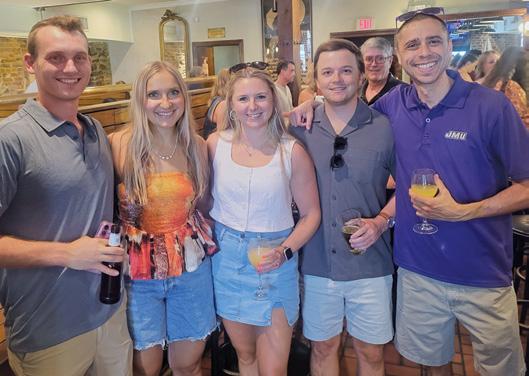
MetroDukes hosted Welcome to the Area events at several locations in the D.C. area.
The chapter keeps busy throughout the fall, with offerings including cheering on the women’s soccer team when it plays George Mason University; attending large sporting events like Commanders and Washington Spirit games; a virtual session with college admissions professionals; volunteer opportunities; and its signature fall event, Crabfest. Upcoming events can be found in the Monday MetroDukes emails and @jmumetrodukes on social media.
Not being invited to local chapter events? The JMU Alumni Association sends out invites based on your current address in our database.
Scan here to update your information and be included.
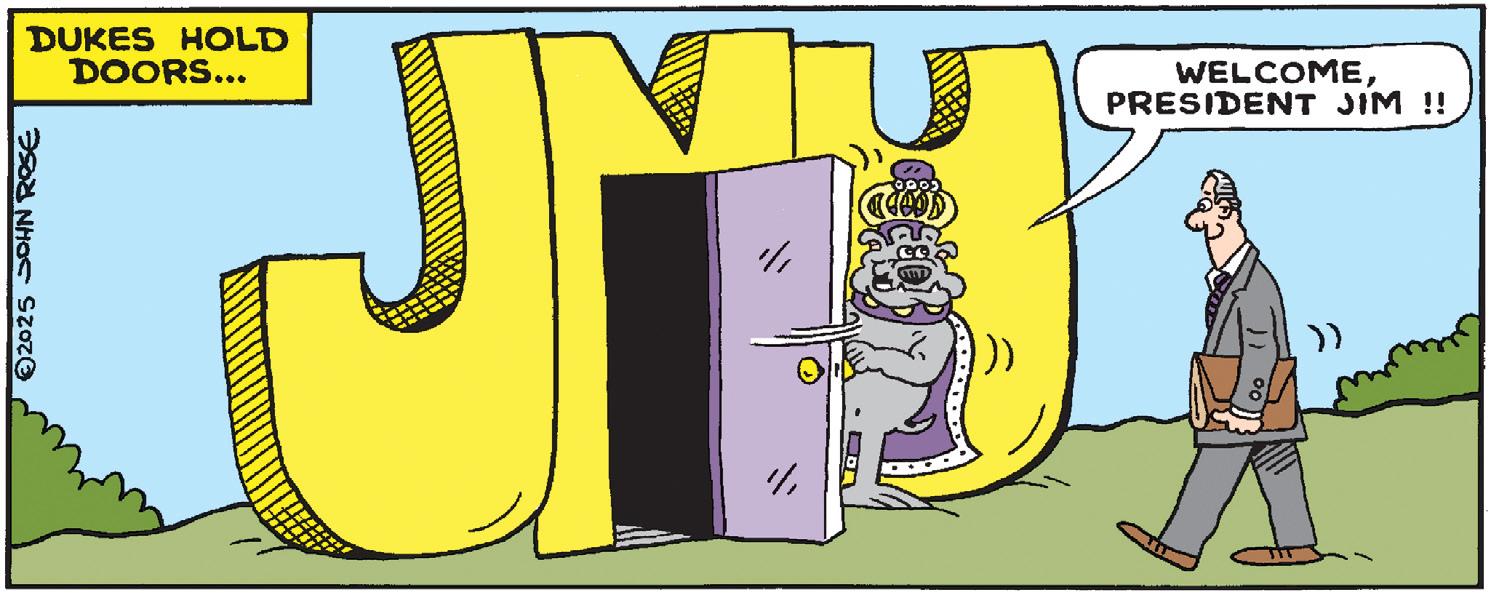
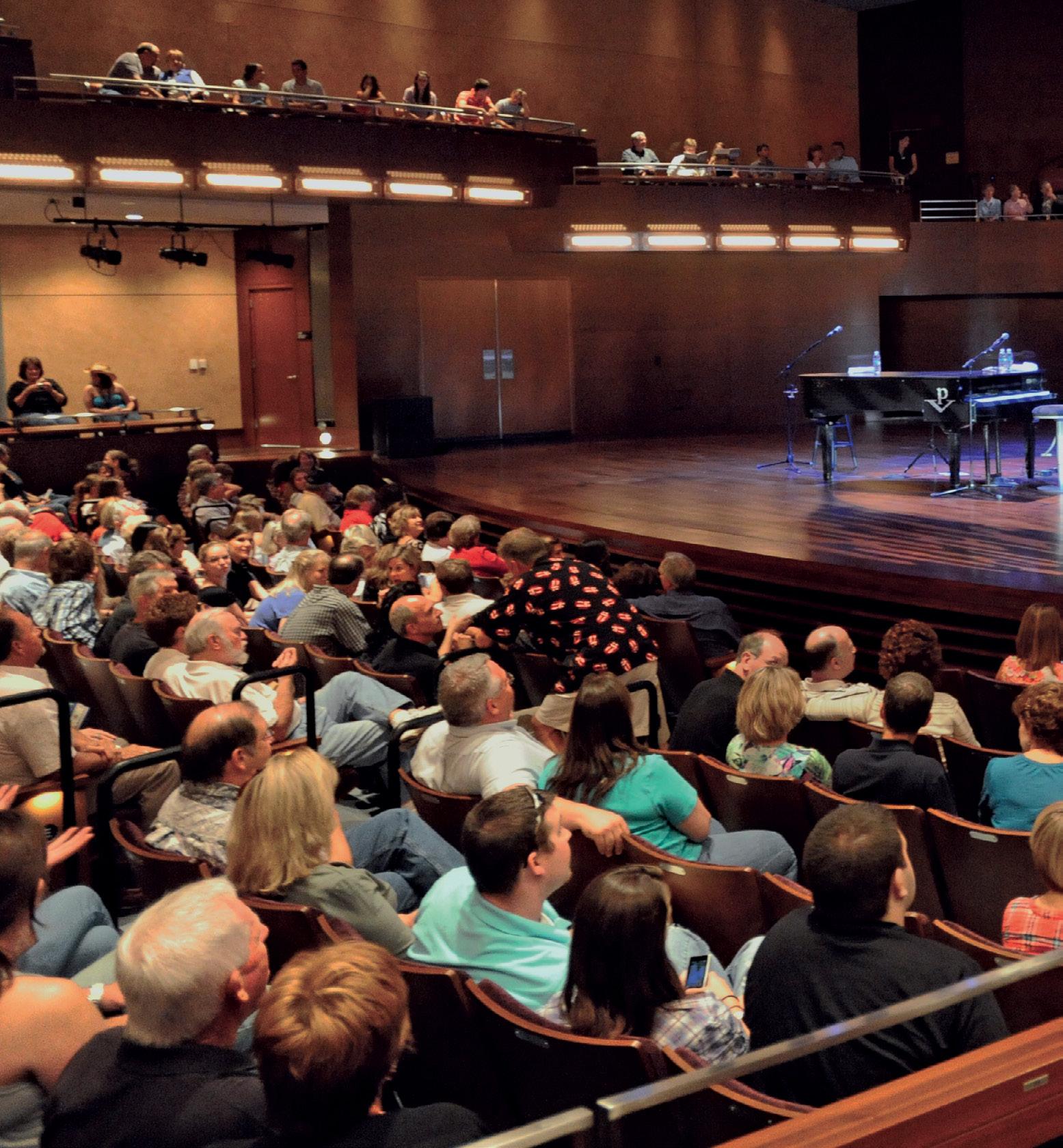

Country singer Phil Vassar (’85) performs for an enthusiastic sold-out crowd in the new Forbes Center for the Performing Arts on Sept. 8, 2010.
52
Emily Woodford Fitzgerald was delighted to return to campus in May for the first time in 20 years to witness the graduation of her youngest grandson, Edmond Boxley Fitzgerald V (’25).
73
Phillip Updike, a Bachelor of Science in Marketing, retired Dec. 31 after a 40-year career in the real-estate industry. During his career, he received numerous awards from the Harrisonburg-Rockingham Association of Realtors, including Realtor of the Year. Updike served HRAR in many capacities, including president in 1989. He worked for WHSVTV for 12 years following grad-
uation and prior to entering real estate.
75
Denise Cooper has three plays on Broadway and was recently nominated for a Tony Award. Cooper has managed numerous major New York productions, including The Vagina Monologues, as well as the Boston premieres of shows such as Love! Valour! Compassion!
76 Stephen Matthews traveled to Germany and Austria with his three best friends in December. “Our friendship has taken us on a cross-country trip to the Grand Canyon with our children in the mid-90s as well as trips to

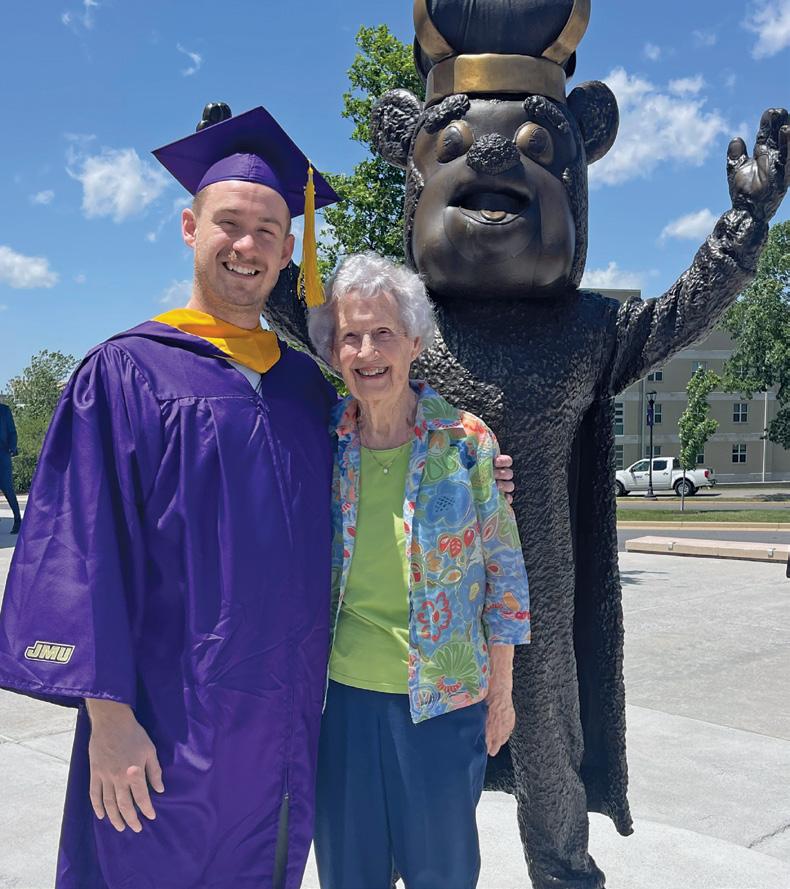
Italy, Old Quebec, Belgium and the Netherlands,” he said.
78 Henry Holdren, a Bachelor of Science in Mass Communications, retired in May 2024 after working in television and video production for 46 years. His career included videography and directing live shows and video productions. The majority of his career involved high-end video editing and graphic compositing. Regarded as one of the top editors in the Washington, D.C., market, Holdren garnered numerous local and national awards for his work.

Henry Holdren (’78)
His biggest involvement with JMU was from 1990 until 2006, when he worked with Professor Emeritus John Woody of the School of Media Arts and Design to hire recommended graduates. After 18 years, Holdren left Interface Video Systems where 20% of its staff were JMU graduates. Because of this connection, SMAD alumni have gained a reputation of excellence within the D.C. market.
In retirement, Holdren plans to pursue his passion for photography and watch his eldest graduate from JMU’s College of Education.
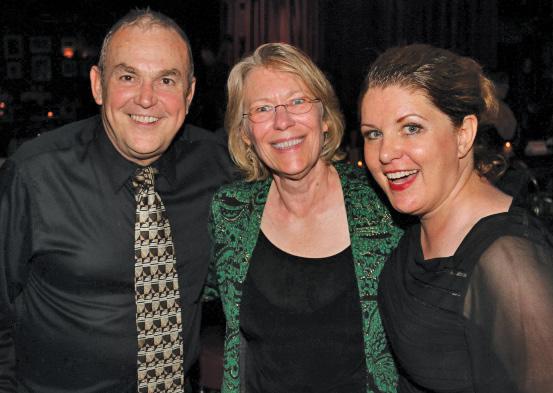

(Clockwise from above): Emily Woodford Fitzgerald (’52) attends the graduation of her grandson, Edmond Boxley Fitzgerald V (’25); Denise Cooper (’75), center, with actors Michael Rice and Klea Black hurst. See broadwayworld.com for biographies and more information; (L-R): Susan (Laird) Matthews (’76), Stephen Matthews (’76), Douglas Godesky (’77) and Gina (Perricone) Godesky in Spitzingsee, Germany, on their way to the Alps and Salzburg, Austria.
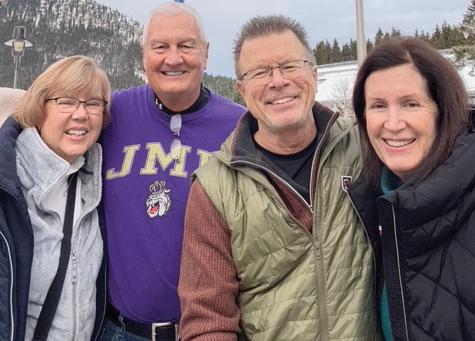
Neil Kelly, a Bachelor of Science in Economics, retired Dec. 31 after more than 35 years with Valuation Research Corp. During his time with VRC, Kelly held many positions, starting out as a senior financial analyst, then working his way up from assistant vice president to senior vice president and on to director. In 1996, Kelly was part of a small group of executives who purchased VRC in a leveraged buyout. In 2000, Kelly was elected
chairman of the board. During his nearly 20 years as chairman, VRC grew more than eightfold. Kelly stepped down as chairman in 2020 and took a reduced role as vice chairman. At the time of his retirement, VRC had grown to be one of the largest independent valuation advisory firms in the U.S., with more than 275 people.
In addition to serving as a special adviser to VRC, Kelly will keep busy in retirement with philanthropy, serving on

(Above, L-R): Amy Sommer (’87), Dr. Amy Butler Mitchell (’88), Diane Gallagher Vaccaro (’87), All American Hero Award recipient Harry Dunn (’05), Keith Harmon (’88), Teren Block (’87), Tina Chylack (’88), Beth Congbalay (’87) and Deborah Snyder (’87) at the Operation Renewed Hope Foundation’s Purple and Gold Gala. (Right, L-R): Dukes Down Under Tim Seeley Jr. (’04), Kim Pandorf (’97), and Cathy (’89) and Jim Dotter (’89)
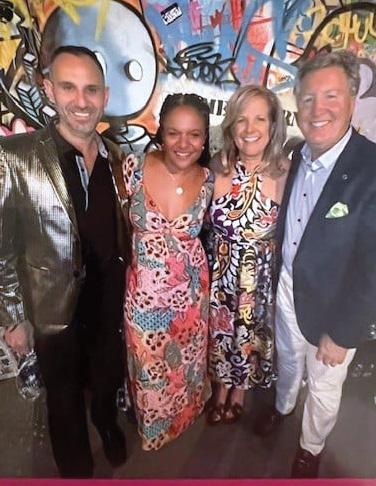
the board of the Oluv C. Joyner Foundation, as well as supporting several local charities. With his spare time, Kelly intends to travel, play pickleball with his wife and friends, and learn to play golf.
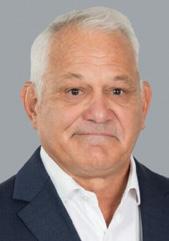
85Chris Heibel (’85)
Chris Heibel was appointed chief operating officer of American Roll-On Roll-Off Carrier Group on June 1. In this expanded role, he assumed leadership of the day-to-day execution of commercial and operations functions for a shipping company in international trade and a trusted global logistics partner for the Department of Defense. He oversees sales, marketing, pricing and operations for the company’s global services. Heibel brings nearly 18 years of distinguished service with ARC Group, having held multiple senior leadership roles across the Commercial and Military Markets divisions. Most recently, he served as senior vice president of Commercial, where he successfully led strategic initiatives and deepened key government and commercial relationships.
Before joining ARC Group, Heibel served 21 years in the U.S. Army, retiring as a colonel after holding critical logistics and transportation-leadership roles worldwide. He and his wife, Kristi, have been married for 39 years and reside in Ponte Vedra Beach, Florida. They are the proud parents of two daughters, Morgan and Madison.
(Right): Chris Leggett (’92) at the 2025 New York State Wrestling Coaches Hall of Fame Induction Ceremony
87 Beth Congbalay, a Bachelor of Arts in History and French, attended the Operation Renewed Hope Foundation’s Purple and Gold Gala on April 25 with fellow alumni. Retired Lt. Col. Deborah Snyder (’87) founded ORHF to provide housing and support services to U.S. veterans experiencing homelessness. To learn more about ORHF, visit http://operationrenewedhope foundation.org.
89 Cathleen “Cathy” Dotter, a Bachelor of Business Administration in Marketing, visited Australia with fellow alumni and Konica Minolta in February.
92
Chris Leggett, a Bachelor of Science in Kinesiology, was recently inducted into the 2025 New York State Wrestling Coaches Hall of Fame.
95
Dr. Gwynette Frampton McLeod was named chair of the Department of Psychiatry and Behavioral Medicine at Louisiana State University Shreveport on July 1.
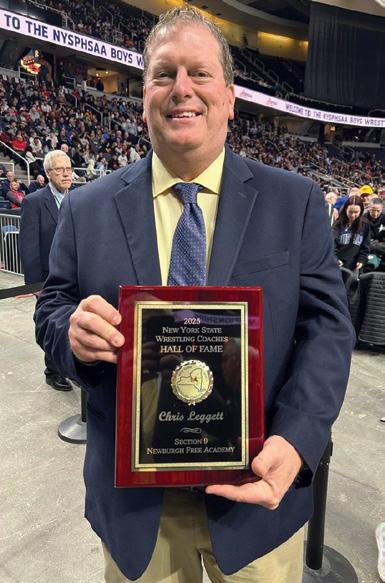
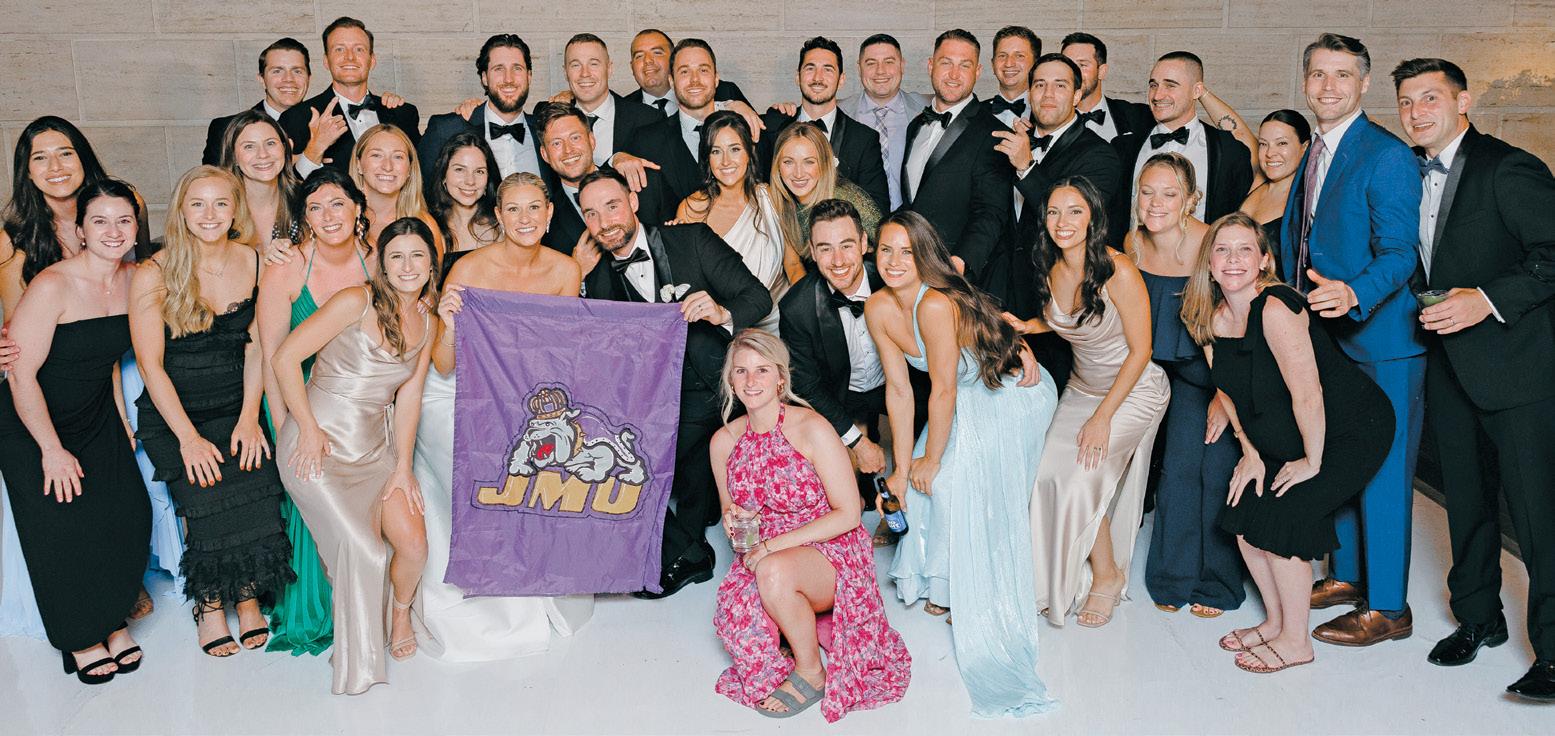
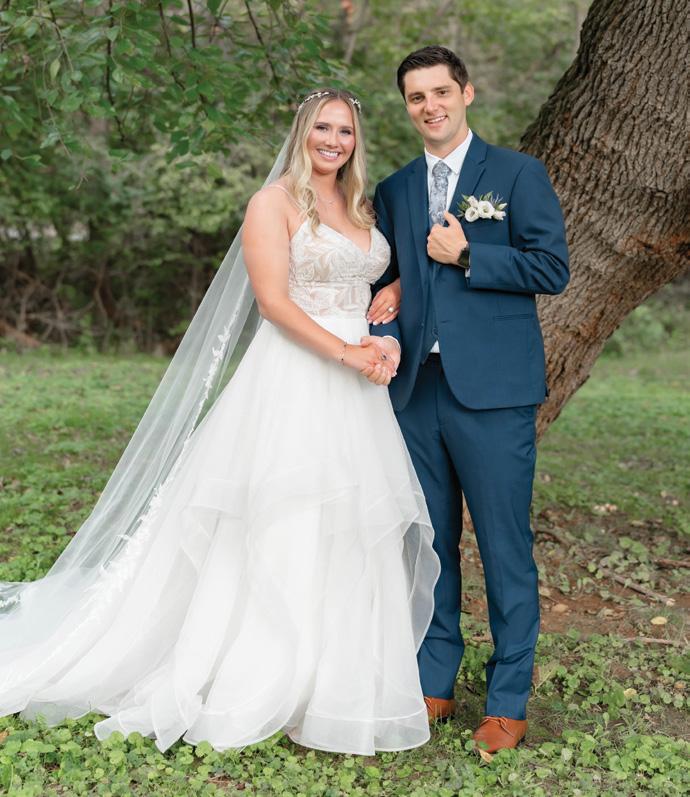
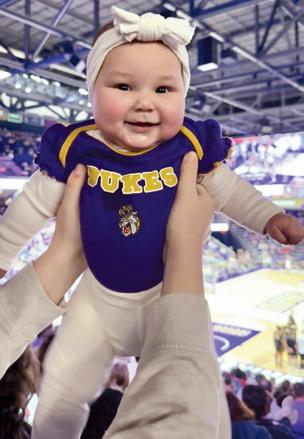
major, and Nicole (Swindell) Woodgate (’18), a Bachelor of Business Administration in Marketing, married in Berryville, Virginia, Oct. 4, 2024, surrounded by their family and friends. Duke Dog made a surprise appearance at the wedding! 5. Taylor Vaughn (’08) married Keith Cousins on May 24 in Healdsburg, California. “We had to teach my husband how to do the J-M-U DUUKES!!! But he got it eventually!” said Vaughn, a Bachelor of Business Administration in Marketing. Numerous JMU alumni joined the bride and groom to celebrate, including (L-R) Cary Wolbrette (’08), Russell Wagoner (’13), Carolyn Girondo (’14), Ryan Holston (’08), Molly Holston (’09), Daniel Pascucci (’08), Amit Kakar (’08), Mary Kate Kakar (’08), Eric Laidlow (’08), Adam Burgess (’08), Lindsey Burgess (’08) and Taylor Parnham (’08). 3 4 5 2
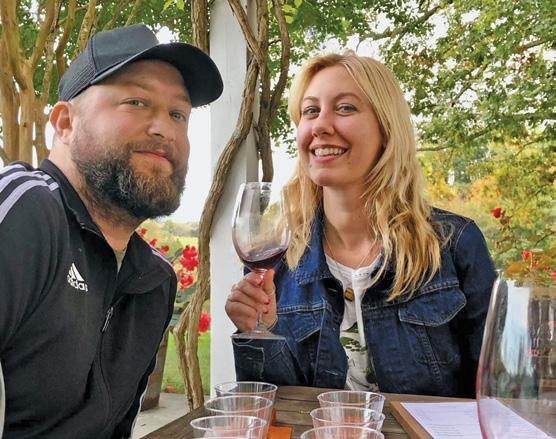
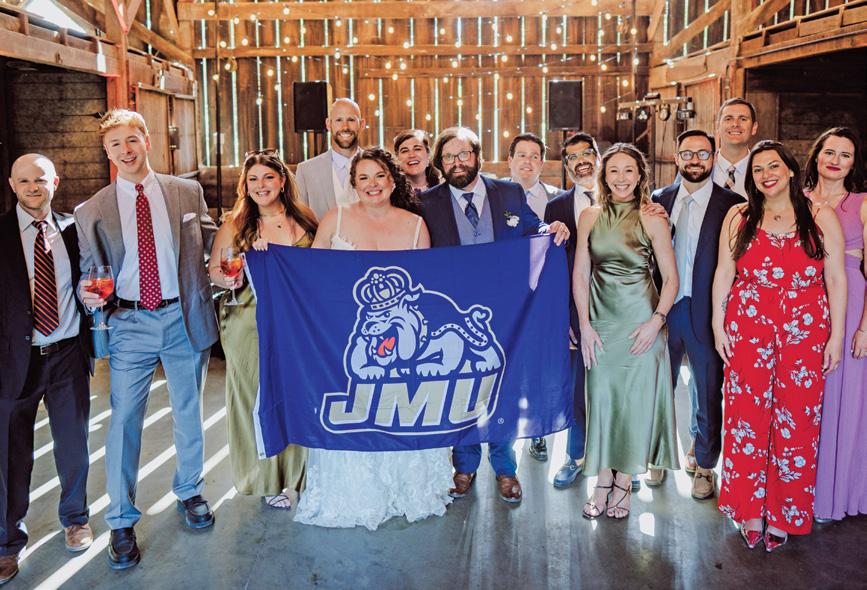
1. Katie Schnably (’15), a Communications major, and Danny Abatemarco (’13), a Computer Information Systems major, married Aug. 10, 2024, at Union Trust in Philadelphia, Pennsylvania. Many alumni attended, half of whom were Alpha Tau Omega members. 2. Ella Cueva (’22), a Bachelor of Arts in Communication Studies and Media Arts and Design, and Bryan Cueva welcomed their first child, Malia, into the world in August 2024. Last season, Malia attended her first JMU men’s basketball game to cheer on the Dukes!
3. Madison Deputy Editor Amy Crockett (’10), a Bachelor of Arts in Media Arts and Design, became engaged Feb. 22 to Ronnie Gardner, a VCU School of Business-dropout-turned manager for Jelly Roll, in Gloucester, Virginia. 4. Scott Woodgate (’18), a Computer Science
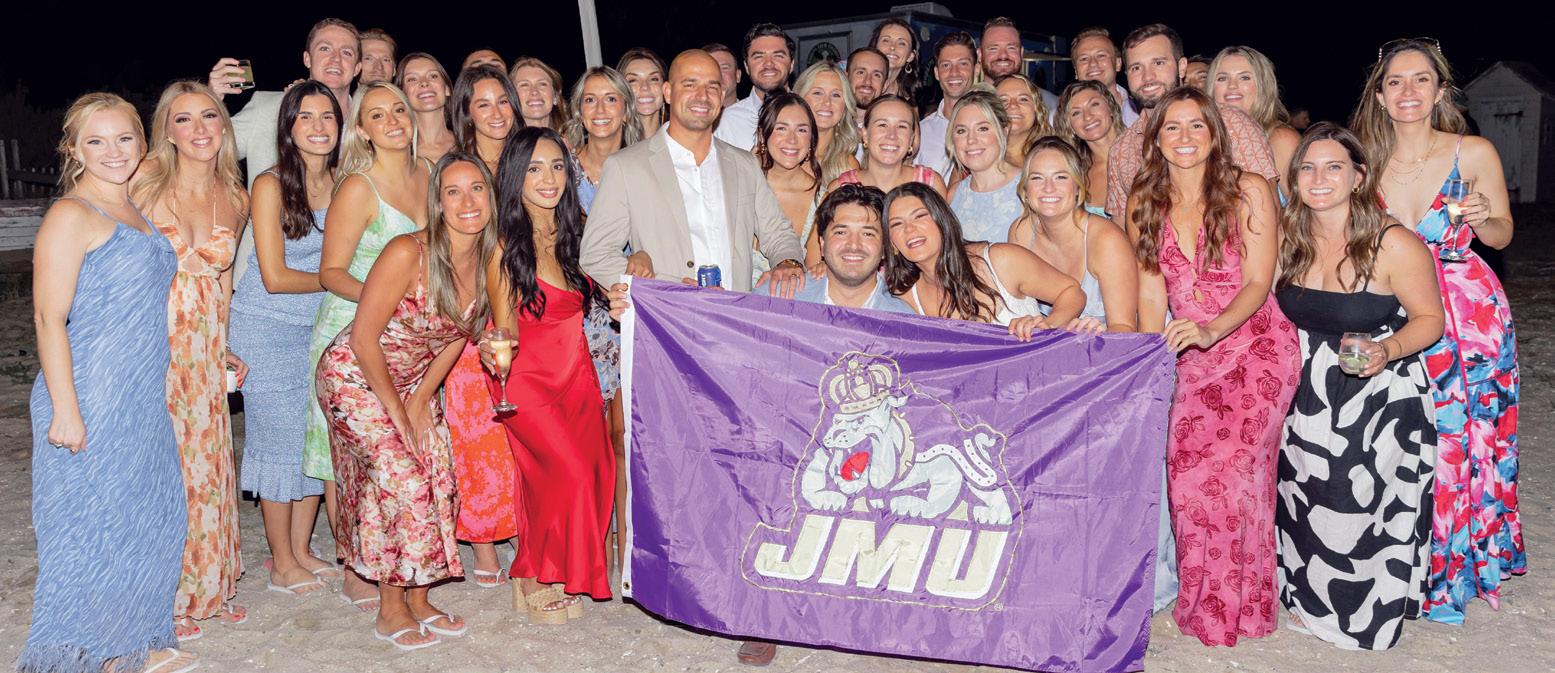
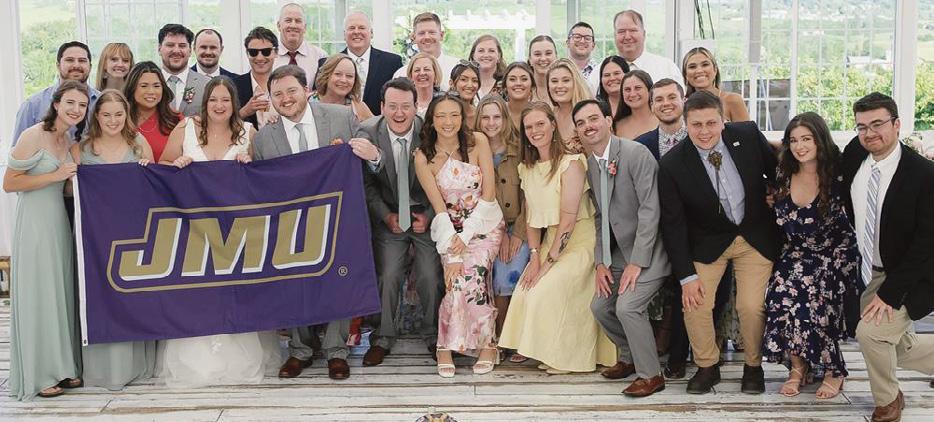
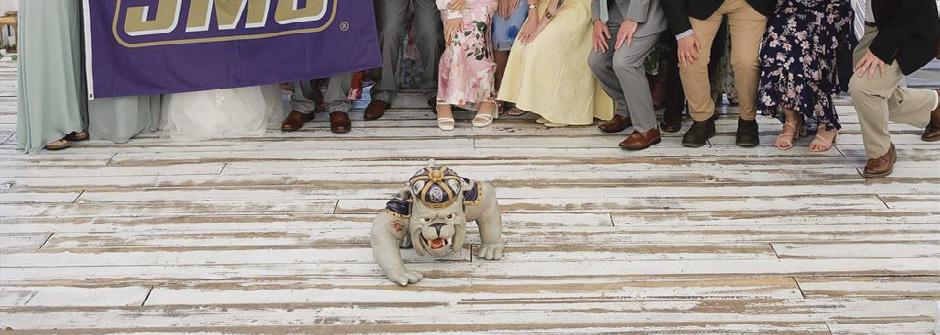
6. Brooks Shyman (’16), a Sport and Recreation Management major with a minor in Business, married Jamie (Figler) Shyman (’16), a Bachelor of Science in Integrated Science and Technology with a dual concentration in Environment and Engineering/Manufacturing, Sept. 7, 2024, in Dewey Beach, Delaware. 7. Christine Culko Funkhouser (’20, ’21M), a Master of Education, and Brent Funkhouser (’20), a Bachelor of Arts in English, married May 24 in Timberville, Virginia. Many of their JMU family and friends,
Robert P. Marcus, partner at The Gori Law Firm in Edwardsville, Illinois, was sworn in for a second term as mayor of the village of Glen Carbon on May 13. The village, located in the St. Louis Metro-East region in Madison County, is a thriving community with a population of 13,842. Under his leadership, Glen Carbon welcomed businesses that were the first of their kind in Illinois, boosting the local economy and bringing new opportunities and jobs to the

community. Residential growth has kept pace, with hundreds of new single-family and multifamily homes and luxury apartments. In addition, Marcus emphasized strong communication between village staff, residents and businesses, setting high standards that have enhanced the village’s outreach and engagement efforts. Specializing in personal injury law, Marcus, who holds a Bachelor of Science, is married with two children and remains committed to improving the quality of life in Glen
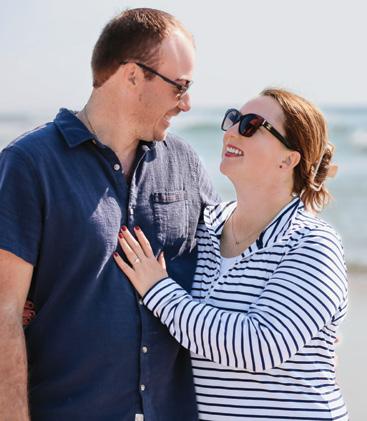

and Road Dawg, celebrated with them at Showalter’s Orchard and Greenhouse. 8. Madeline Rafi (’16), a Bachelor of Science in Communication Studies, got engaged during the summer to Michael Tyrrell. Their dog, Murphy, now wears a “Mom Said Yes” bandana. 9. Alyssa (Beam) Ashby (’14), a Health Services Administration major, and Frank Ashby (’13), a Marketing major, welcomed their second son, future Duke Mason Morris Ashby, born in July 2024 in Richmond, Virginia.
Carbon. ■ Abigail Sipe Tammen, a Master of Counseling Psychology, was named president of the Virginia Society of Association Executives in May 2025. VSAE supports the professional development, networking and effectiveness of 400-plus association executives and organizations across the commonwealth.
05
Maryn (’06M) and David Simon’s son, Gidon, decided to celebrate Duke Dog’s birthday with a picnic with snacks and stuffed friends. Future Duke Gidon, Class of 2042, loves Duke Dog!
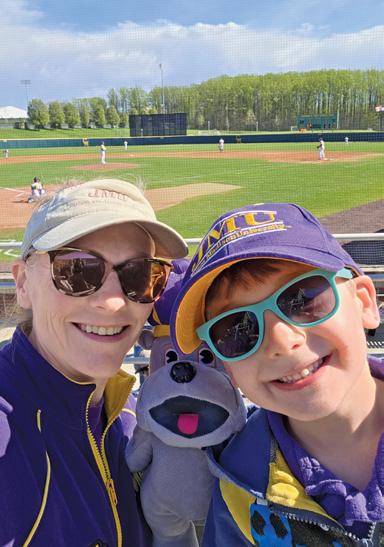
’06M)
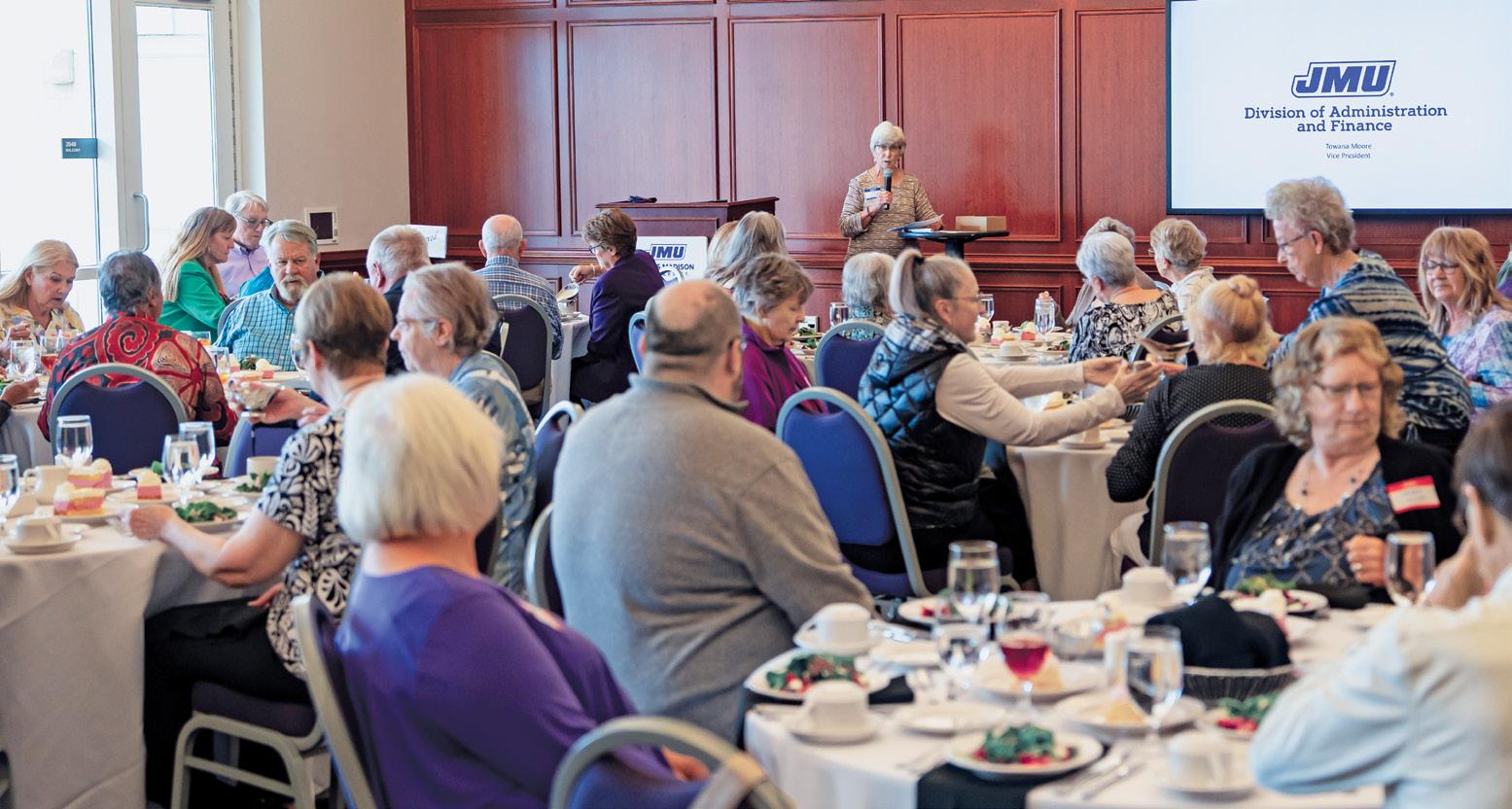
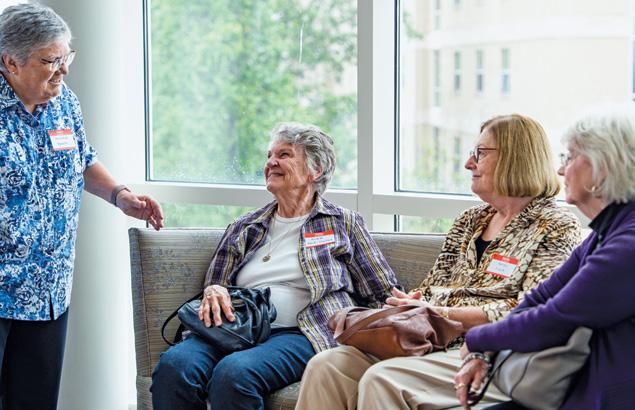
BY TINA UPDIKE (’73), SEA Steering Committee chair
The Staff Emeriti Association is a volunteer organization that allows retired JMU staff emeriti members to continue association with colleagues and maintain ties to the university through a wide variety of activities. During the 2024-25 academic year, SEA activities and events supported its mission of actively engaging with JMU and the community. The association has grown thanks to its partnership with the Office of Human Resources to increase awareness of the staff-emeriti designation across campus. As a result, 342 classified staff retirees have earned the designation, and 25% are active SEA members.
The SEA monthly luncheon series offers tours of JMU facilities and educational opportunities, as well as a chance for members to get to know one another and network with former colleagues. This past spring, a tour of the Student Success Center highlighted many newly renovated areas, including the Career Closet, which provides students with business attire for job interviews. Luncheons were held at area restaurants.
The SEA’s premier event is the annual membership luncheon with a “State of the University” address by a senior JMU administrator. This year’s address was given by Towana Moore, vice president for Administration and Finance. The May 28 event had 46 attendees and began with a reception in the Montpelier Room of East Campus Dining Hall, where attendees could connect with former colleagues and greet new members.
Prior to the lunch sponsored by Human Resources, SEA Chairperson Christina Updike (’73) welcomed members and guests, providing an overview of accomplishments and initiatives from the past year. She also gave a midyear update on the SEA’s volunteer
activity, the adoption of The Pantry, which helps alleviate student food insecurity on campus. SEA supports this effort through monetary donations and needed supplies.
From February 2023 through May 2025, 38 SEA members made 231 gifts to The Pantry totaling $8,605 and provided more than 100 pounds of food and supplies.
Tina Updike (’73) welcomes guests at the annual membership luncheon. (Inset): SEA members gather before the luncheon.
Jeremy Hawkins, assistant director of Off-Campus Life, was then welcomed to the podium. Reporting on The Pantry’s expansion program over the past five years, he said three new locations have opened on campus to provide more comprehensive student access.
Hawkins co-chairs the Basic Needs Advisory Board, which includes faculty, staff, students and community partners who research, create and advocate for resources and policy changes to better support students facing hardship. He thanked the SEA for its steadfast commitment to The Pantry.
After the meal, Moore gave an overview of JMU’s significant achievements in 2024-25 and offered a sneak peek at new building and renovation projects that are in the SEA’s five- to 10-year capital plan. Following her presentation, attendees enjoyed a lively Q&A period. Thanks to Towana Moore for her ongoing support of the organization!
For more information about the Staff Emeriti Association and upcoming events, visit https://jmu.edu/ staffemeriti or email staffemeriti@jmu.edu.
09M Theodore “Ted” Goshorn, a Master of Education in Counseling, is a financial adviser at Edward Jones Investments in Bryson City, North Carolina, but serves clients and communities across the country. Being diagnosed with a rare health condition in 2024 led to many challenges for Goshorn and his family, including a career change and relocation.
11
Maxwell Greer, a Computer Science major, joined the Institute for Defense Analyses as a research staff member in the Science, Systems and Sustainment Division of IDA’s Systems and Analyses Center on July 23.
16
Sarah K. Knarzer, a Bachelor of Science in Intelligence Analysis, joined Christian and Barton LLP in Richmond,
Virginia, as a litigation associate. Her legal practice will continue to focus on assisting clients with a variety of civil litigation matters, including contract- and business-tort disputes, personal injury, and general liability claims.
18 Buck Bloomingdale, a Media Arts and Design major, just had his big break in Hollywood. Teton Ridge Entertainment has acquired Riding Hurt, a spec script written by Bloomingdale, for seven figures.
“The project is described as a high-octane, heist film set in the adrenaline-fueled world of professional bull riding, based on an idea developed in partnership with Range Media Partners,” said Variety magazine. “Plot details are still being kept under wraps. The western-focused studio beat out several other interested buyers to make the deal.”
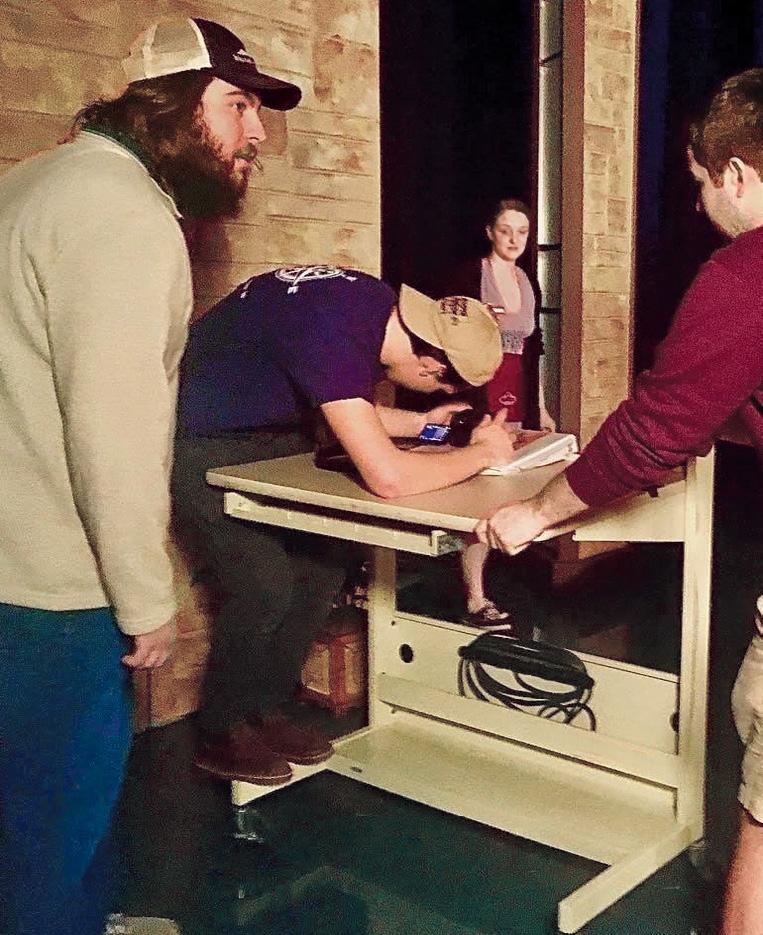
19M Katy (LaLonde) Fisher, a Master of Education in Educational Leadership, was appointed executive director of Human Resources for Manassas City Public Schools on June 10 and began serving in the role July 1. With 17 years of experience in MCPS, Fisher served as the director of Professional Learning, the Title II coordinator for MCPS, and executive director of the Manassas City Public Schools Education Foundation for four years. Her leadership has driven key, division-wide initiatives, including the Teacher Education and Mentor program, A Cycle That Works, New Teacher Academy, Cooperative Learning, and improved onboarding practices, all of which align with Human Resources’ commitment to building a dynamic, diverse
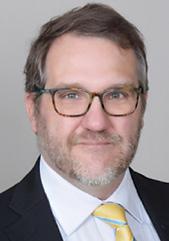
Theodore Goshorn (’09M)
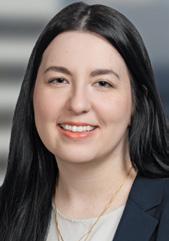
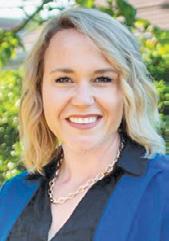
and high-quality workforce.
Throughout her career, Fisher has been recognized with several awards, including the MCPS New Teacher of the Year and MCPS Mentor of the Year. She is a graduate of Leadership Prince William and has served as an advisory board member for REACH Virginia, a statewide organization supporting new teacher-mentoring programs.
23 Colby Owens, a Bachelor of Arts in Media Arts and Design with a concentration in Journalism, landed a job with iHeartRadio in Tampa, Florida, about a month after graduating. Part of the On Air Talent team, he is an overnight weekend host. Owens was also a radio host for WXJM in Harrisonburg during his undergraduate years.

Charlotte (Evans) Floyd (’48), born in Reedville, Virginia, died June 29 at 100. She graduated from Reedville High School in 1942, where she was salutatorian. She was admitted to the secretarial program at Madison College and joined the Psi chapter of Alpha Sigma Tau sorority.
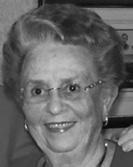
In 1948, she moved to Northern Virginia and began her career as a secretary for the Army Corps of Engineers. She later worked for the U.S. Geological Survey and became staff assistant to the Legislative Council for the Secretary of the Interior. Starting her government career as a GS-4, she retired a GS-13 — a great achievement for a woman at that time.
Part of the Northern Virginia Alumnae Chapter, Floyd served as chapter president and delegate to the Washington D.C./Northern Virginia Alumnae Panhellenic Association. She was also national secretary of the Alpha Sigma Tau National Council from 1972 to 1980 and co-founded the AST National Foundation Inc.
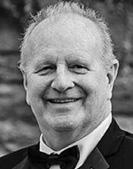
Glenn N. Rodgers (’76), 70, of Lower Gwynedd, Pennsylvania, died Dec. 18 surrounded by his loving family. A Bachelor of Business Administration in Economics, he enjoyed a highly successful career in software sales, holding key positions at Burroughs, MSA, SAP and Sparta Systems. Known for his drive, determination and sharp instincts, he approached life with unmatched energy and enthusiasm.
Rodgers’ hobbies included skiing, scuba diving, golf and community service. He and Kathleen Kerr were married for 41 years, and had three children and two grandchildren.
Stanley C. Alexander (’79), 68, died Jan. 12 at Georgetown University Medical Center after suffering a stroke. As a Physical Education major, he was a state tae-kwon-do champion and had advanced knowledge of tai chi, meditation, energy arts, stretching and exercise. Alexander served six years in the U.S. Marine Corps. He worked as a telecommunications engineer for most of his career.
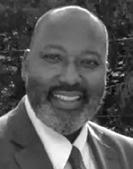
Marlon Arness Foster (’82, ’95M), 66, of Harrisonburg, died June 29 at Sentara RMH Medical Center. In his younger years, he played in the Yorktown Fife and Drum Corps in Yorktown, Virginia. In school, he wrestled, played basketball and football, and participated in the York High School Band and Fellowship of Christian Athletes.
Foster earned a Bachelor of Music in Education and Master of Music, and was a member of Alpha Phi Alpha fraternity. While serving in the U.S. Air Force from 1984 to 1988, he participated in the USAF Tactical Air Command Band at Langley Air Force Base, Virginia. He then taught as a band director in Harrisonburg City Public Schools at Thomas Harrison Middle School and Skyline Middle School, as well as guiding the drumline in the Harrisonburg High School marching band. Throughout his career, Foster taught as adjunct music faculty at JMU, Shenandoah University, Eastern Mennonite University and Bridgewater College.
Foster received numerous awards, including Outstanding Airman of the Quarter, Teacher of the Year and retired Teacher of the Year, and he was Hall of Fame recipient from the Virginia Band and Orchestra Directors Association.

Mary Frances “Myrf” Bowry (’84), 63, of Richmond, Virginia, passed away peacefully June 12. Early in life, Bowry had dreams of being an architect, but several D’s in math convinced her to major in Interior Design and minor in Studio Art. After graduating, Bowry and beloved partner, Leah Dodge, founded the award-winning interior design firm Decorum. The two designed many of Richmond’s most vaunted and comfortable interiors, and developed their ingenious home product, the “Dip-a-di-do-da” dip bowl, featured in magazines, including Good Housekeeping, and on the Home Shopping Network. Bowry lived fully and fearlessly. She revered all things festive and fun, leaving a legacy of kindness, affection and generosity. She loved cooking, entertaining, gardening, exploring Richmond’s dining scene, travel, music, fashion, sewing and champagne.
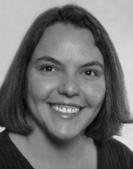
Rachel Lynn Beerthuis (’91) Of Alexandria, Virginia, died March 22 at her home in Chesapeake, Virginia. A Bachelor of Science in Psychology, she spent two years as an au pair before going to Geneva, Switzerland, as a governess. While in Europe, she traveled extensively in Austria and the Czech Republic, also visiting Italy, France and London. After returning to North Carolina, she became an au pair while earning a master’s degree in Library and Information Studies from the University of North Carolina, Greensboro, in 2001. She was employed by the Chesapeake Public Library until shortly before her death.
Thomas Christopher Jones (’93), 54, of Chesapeake, Virginia, died March 11, leaving behind daughters Kayleigh and Kyrsten, wife Suzanne Wilson Jones (’93), brother Todd Jones (’94) and niece Eliza Jones, class of 2028. He dedicated his career to public service, serving as the fleet and facilities manager for the Norfolk Police Department.
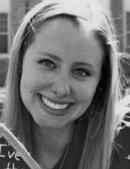

Jessica Marie Battaglini (’15), 31, died July 8, 2024. Born in Flemington, New Jersey, she and her devoted twin sister, Rachel (’15), were raised in Roseville and San Diego, California, before moving to Northern Virginia, where Battaglini graduated from Bishop O’Connell High School. At JMU she earned a Bachelor of Science in Hospitality, minoring in Business. She was a Student Duke Club member and a sister of Phi Mu sorority, and she spent a semester abroad in Florence, Italy.
Battaglini was employed after graduation at Consumer Technology Association as an exhibits intern and moved to San Diego a year later to work for Freeman, a global event agency, as a client support coordinator. It was in San Diego at the age of 26 that she first came down with symptoms and was diagnosed with multiple sclerosis the following year.

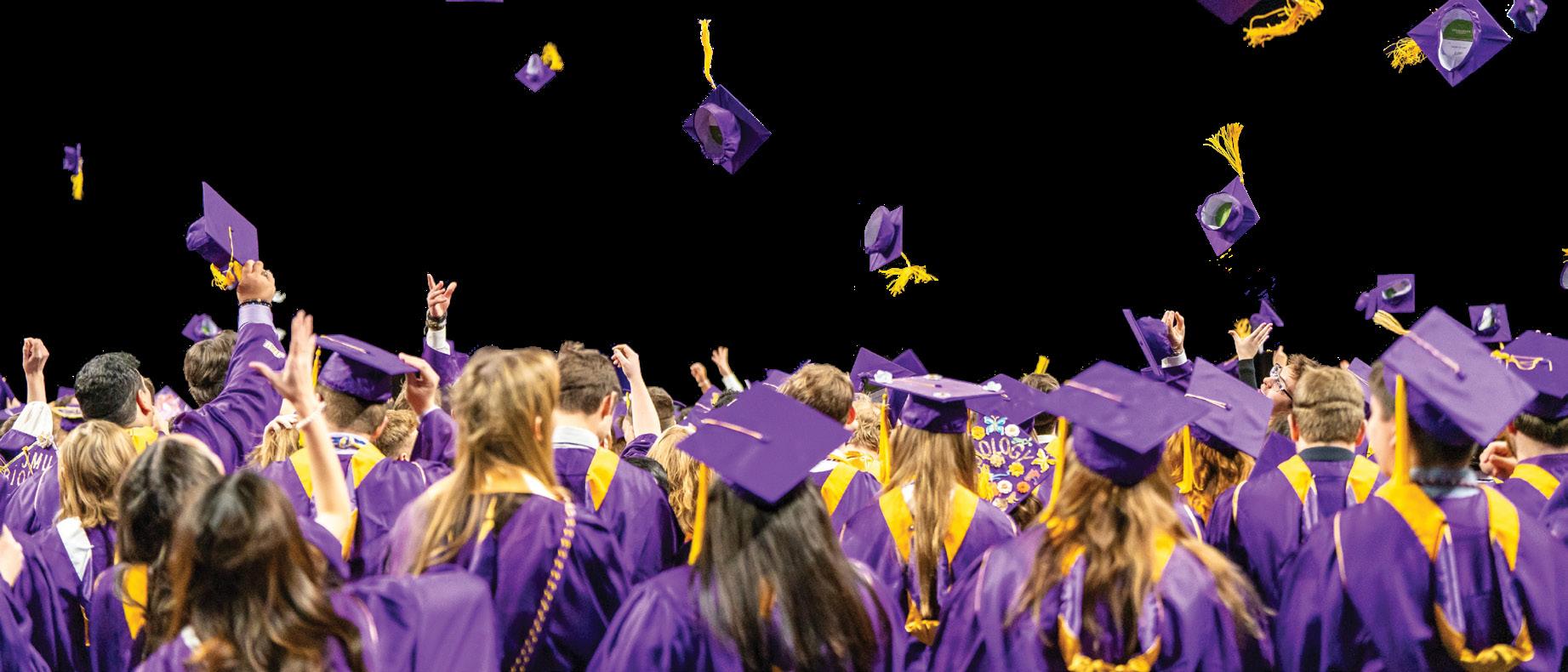
IT’S ADP’S 50TH ANNIVERSARY! ADP is an online, undergraduate degree-completion program that allows you to create a personalized interdisciplinary concentration, or focus of study, to meet your educational and career objectives.
5
ADP welcomes students yearround with five admission dates, giving prospective students the ability to apply when they are ready.
60+
members of Alpha Sigma Lambda, Delta Tau chapter. Alpha Sigma Lambda is a national honors organization that recognizes academic excellence for adult learners.
16
U.S. states/territories are represented.
35
Current students range in age from 19 to 75 years old, with the average age of 35 for ADP students.
adult learners pursuing bachelor’s degrees in Individualized Study with ADP.
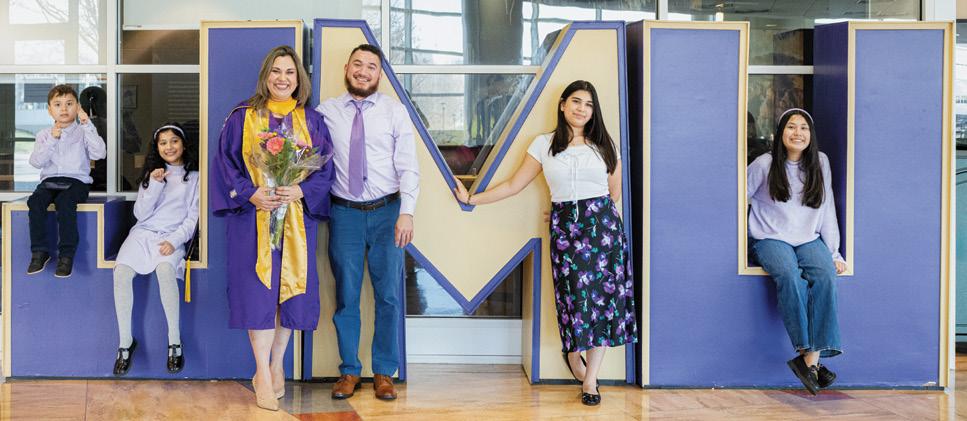
graduates in total from the 2024 academic year 164
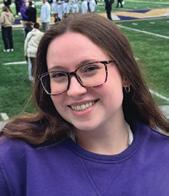
“JMU showed me the most kindness and respect of all universities I contacted, and was very thorough, helpful and honest. I was also considering cost as a factor, and with JMU’s Adult Degree Program, some qualifying students are offered a reduced tuition rate. I am so incredibly happy that I found such a rewarding career that makes me feel so happy and loved!”
— EMILY CARPENTER (‘26)
“The Adult Degree Program transformed my thinking on both continued education for myself as well as how I’ve approached my collegeaged daughter’s educational journey. I wish someone had told me at her age that it’s OK to not have all the answers, to not know exactly what you want to do … because not everyone is the same, and progress, growth and hard work is what is important!”
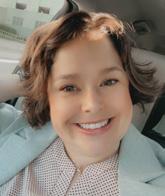
— PROMISE COOK (’25)
Ready to take the next step and discover the Adult Degree Program? Scan the QR code here to learn more.
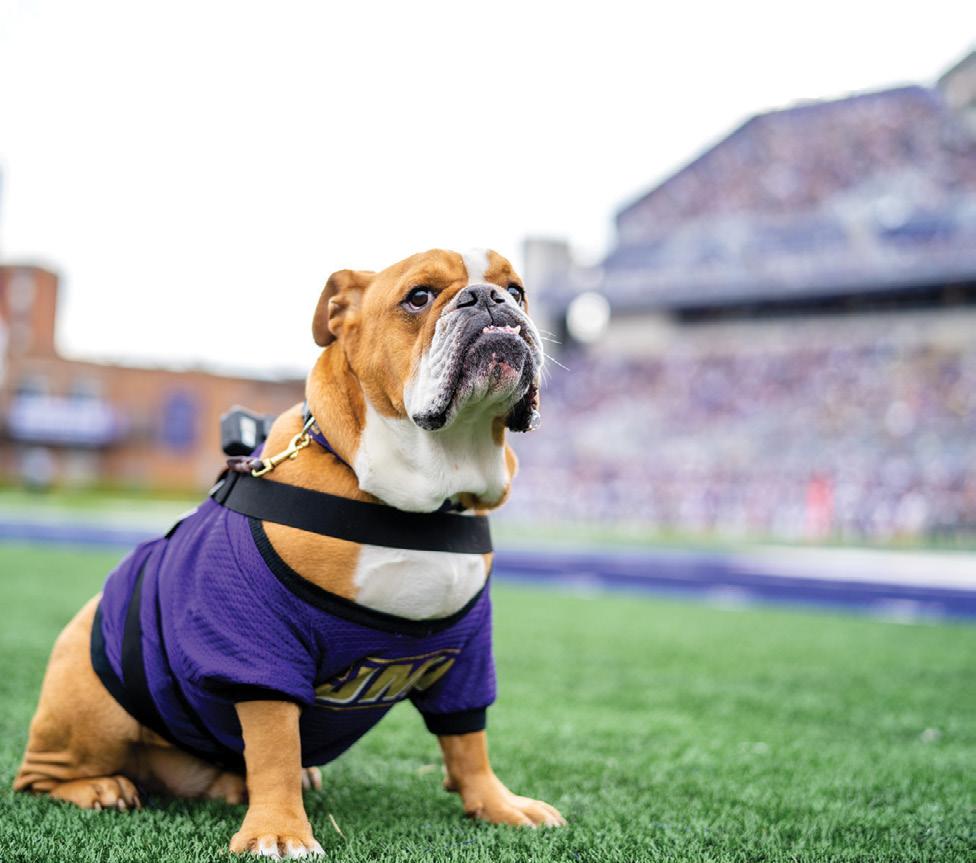
Thomas Gallaher (’72) ’instrumental’ in raising department’s profile nationally
Longtime chemistry department staff member Thomas N. Gallaher (’72) was awarded an honorary Doctor of Science degree during the College of Science and Mathematics’ commencement ceremony in May.
Gallaher graduated with honors from Madison College and served 36 years in various positions within the Department of Chemistry and Biochemistry, retiring in 2008.
JMU chemistry professor Dr. Thomas DeVore, who nominated Gallaher for the honor, wrote that he “was a leader in raising the stature of the chemistry department at Madison to the point where it is now recognized as one of the best undergraduate chemistry departments in the country.”
His knowledge of chemical instrumentation and design made him an invaluable resource, DeVore said. He trained every undergraduate chemistry student at JMU in the use of lab equipment, and actively participated in the design and testing of many exercises for the instrumental and physical chemistry laboratories, he said. The stainless-steel infrared spectroscopy cell he designed is still used in the physical chemistry laboratories at JMU.
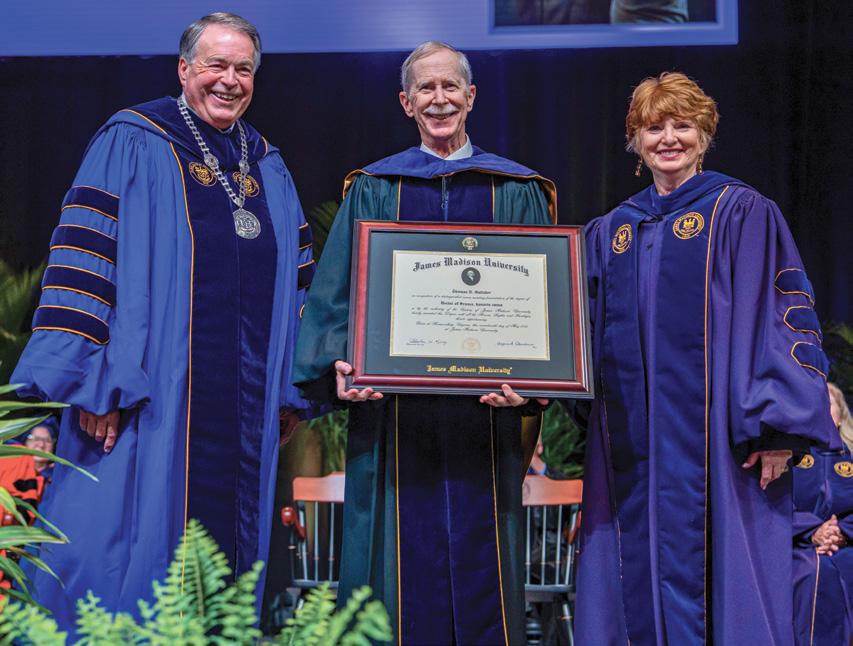
“He was a leader in raising the stature of the chemistry department … now recognized as one of the best … in the country.”
— DR. THOMAS DEVORE
Additionally, Gallaher developed a methodology to perform gas-phase nuclear magnetic resonance (NMR) spectroscopy, a technique for analyzing the resonance frequencies of nuclei in gaseous samples. And he played a leading role in obtaining funding to establish JMU’s multimillion-dollar Shenandoah Valley Regional NMR Facility, which has been used by faculty and students at other Virginia universities and attracted several current faculty members to JMU.
For more stories, scan then visit http://jmu.edu/ beingthechange
Despite only holding a bachelor’s degree, Gallaher co-authored, with JMU professors, more than 40 papers for publication in scholarly journals and contributed to the development of the forensic chemistry course at JMU.
Local companies also leaned on his expertise. He was one of three members of a consulting group who performed air-quality monitoring prior to the construction of the MillerCoors Brewery in Elkton, Virginia.
Gallaher coordinated the chemistry department’s move from Burruss Hall to Miller Hall in the mid-1970s and later helped oversee the construction of the Physics/Chemistry building on East Campus.
After retiring, Gallaher renewed his interest in archery and competed in local, state and national tournaments, winning four state events.
“Gallaher did not limit his activities at JMU to the terms of his contract,” DeVore said. “He went far beyond his minimum requirements, and JMU is a better place because he cared.”
— Jim Heffernan (‘96, ’17M)